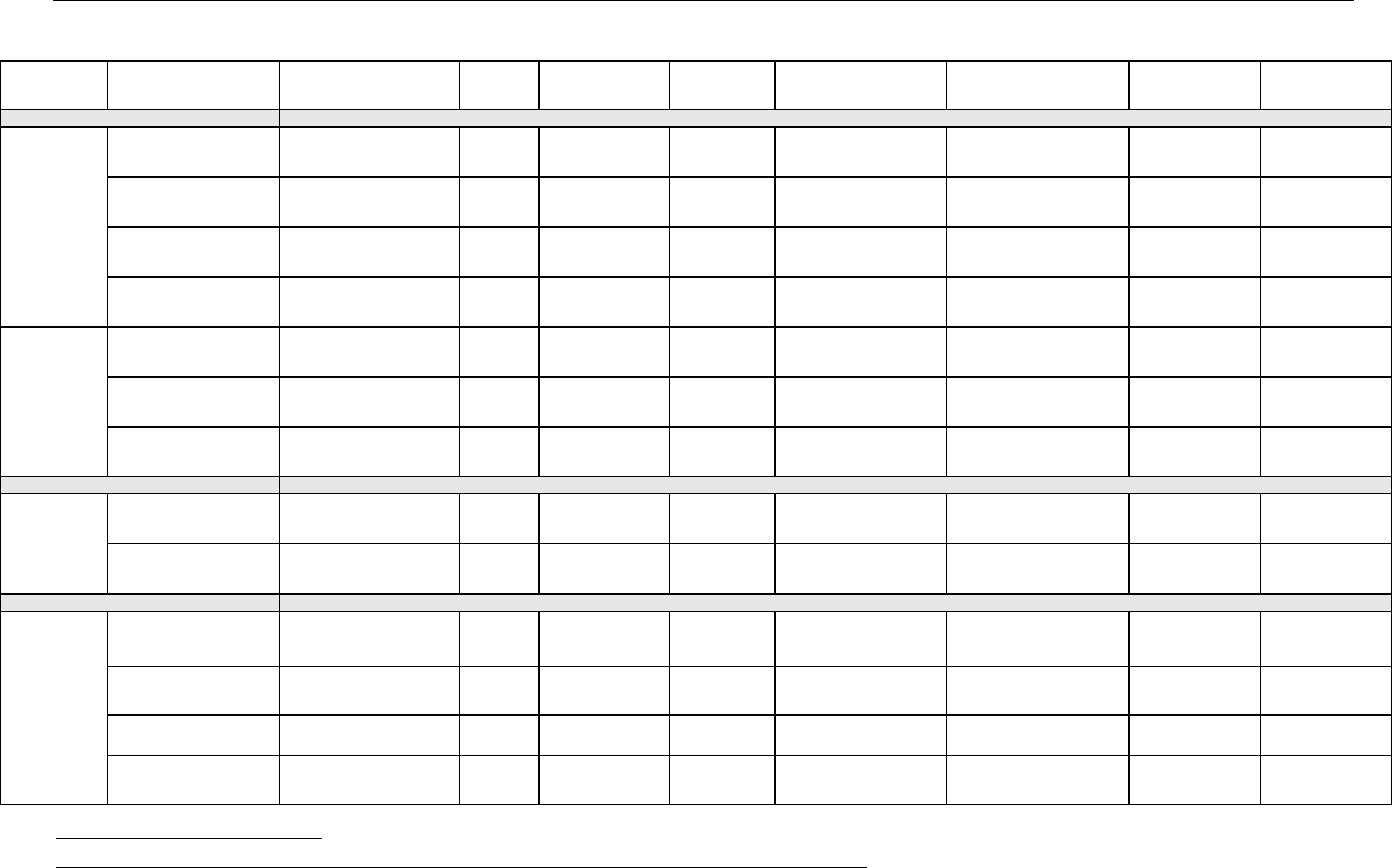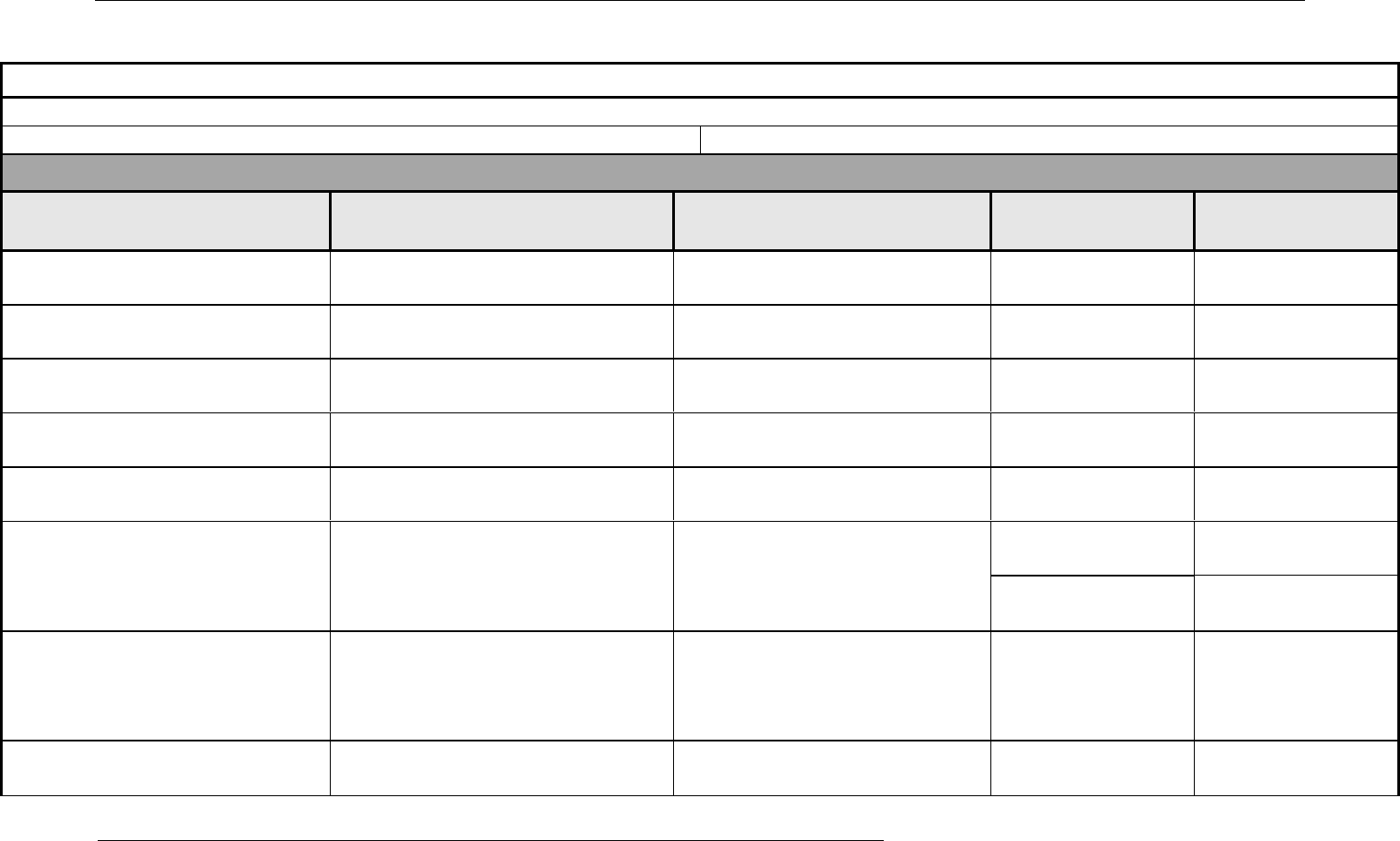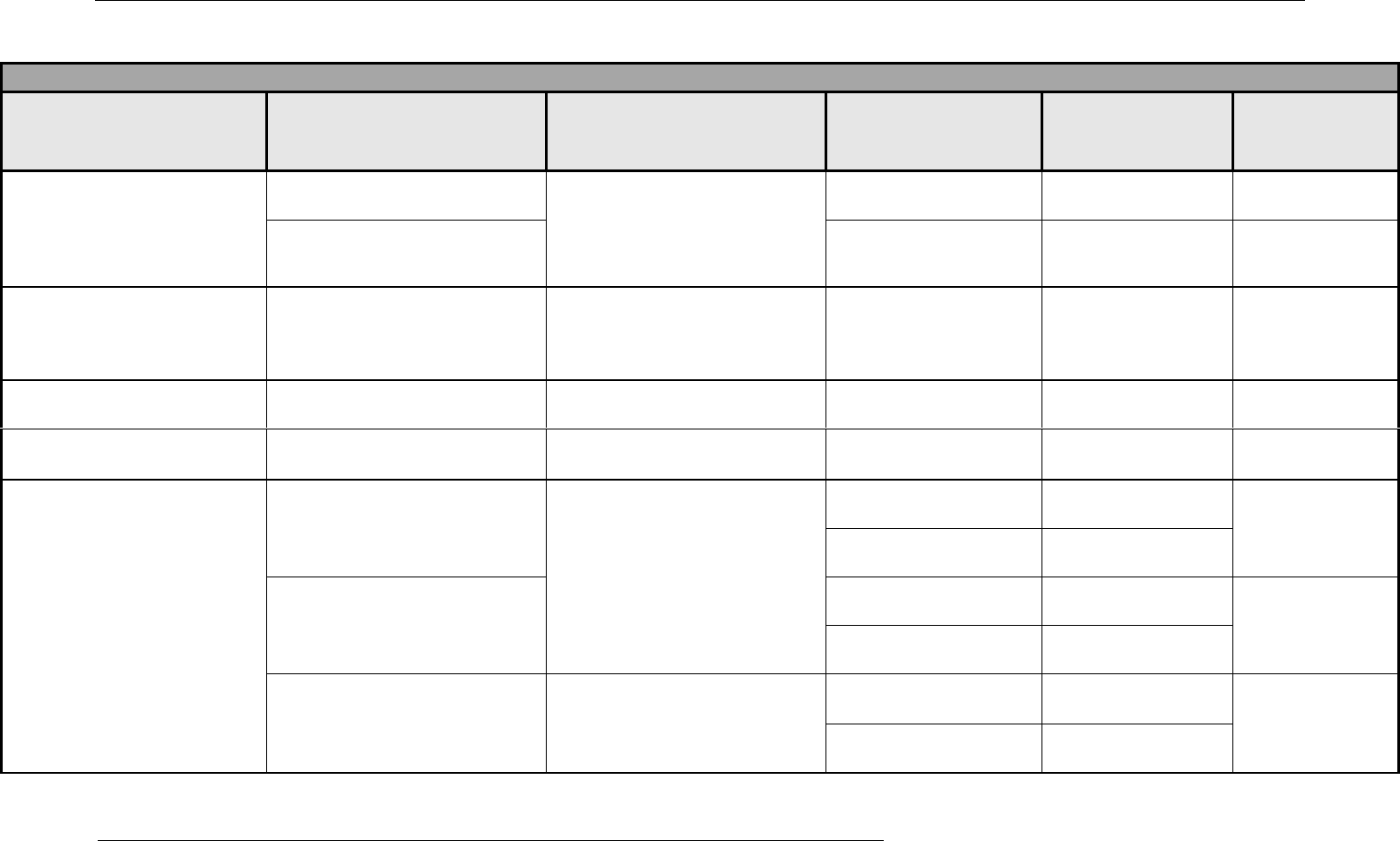
General Academic Regulations
2021-2022
Version 1.14 (1-9-21)

Contact
Academic Quality Office
Approval Date
07 July 2021
Latest Update
Version 14 (1/9/21)
Approval Authority
Academic Council
Date of Next Review
July 2022

GENERAL ACADEMIC REGULATIONS
Academic Quality
Office
Version 14 1-9-21
Page 3 of 222
Introduction and Contacts .......................................................................... 5
Chapter 1: Academic Governance Structures .............................................. 6
Committee Diagram ........................................................................................7
Academic Council ...........................................................................................8
Academic Regulations and Awards Committee .................................................. 13
Programme Approval Scrutiny Panel ............................................................... 16
Education and Standards Committee ............................................................... 18
School Education and Standards Boards .......................................................... 21
Student Assessment, Retention and Achievement Committee ............................. 23
Equality and Diversity Committee ................................................................... 25
Board of Examiners....................................................................................... 27
Academic Appeals Board ................................................................................ 29
Mitigating Circumstances Panel ...................................................................... 31
Academic Misconduct Panel ............................................................................ 33
Reasonable Adjustments and Access Panel ...................................................... 35
Staff and Student Liaison Committee .............................................................. 37
Academic Promotions Board ........................................................................... 39
Professorial Promotions Board ........................................................................ 41
Chapter 2: General Academic Regulations ................................................ 45
Part A: Preliminary ....................................................................................... 46
Part B: Awards ............................................................................................. 48
Section 1: Awards ............................................................................ 48
Section 2: Conferment of Awards ....................................................... 51
Section 3: Rescinding an Award ......................................................... 53
Part C: Programmes of Study ......................................................................... 54
Part D: Programme Approval ......................................................................... 60
Part E: Programme Monitoring ....................................................................... 63
Part F: Admission and Registration ................................................................. 65
Part G: Academic Progress and Discipline ........................................................ 76
Part H: Examination and Assessment .............................................................. 78
Part I: Boards of Examiners ........................................................................... 83
Part J: External Examining ............................................................................. 90
Part K: Complaints and Appeals ...................................................................... 97
Section 1: General Requirements ....................................................... 97
Section 2: Student Complaints Policy and Procedure ............................. 99

GENERAL ACADEMIC REGULATIONS
Academic Quality
Office
Version 14 1-9-21
Page 4 of 222
Section 3: Academic Appeals ....................................................................... 100
Part L: Equality and Diversity Policy .............................................................. 102
Part M: Collaborative Provision ..................................................................... 108
Part N: Rights and Duties ............................................................................ 114
Section 1: Academic Freedom Policy ................................................. 114
Section 2: Code of Practice on Freedom of Speech ............................. 116
Section 3: Public Information Approval Policy .................................... 118
Schedules ............................................................................................... 121
Schedule A: Sub-regulatory Instruments ....................................................... 121
Schedule B: Awards of BPP University ........................................................... 122
Schedule C: Awards made under Agreement with other Awarding Bodies .......... 144
Schedule D: General Admissions Requirements .............................................. 145
Schedule E: Delegations under these Regulations ........................................... 147
Schedule F: Derogations from the General Academic Regulations Governing Awards
150
Schedule G: Definitions ............................................................................... 155
Schedule H: Common Internal and External Acronyms .................................... 166
Modification History................................................................................ 169

GENERAL ACADEMIC REGULATIONS INTRODUCTION AND CONTACTS
Academic Quality
Office
Version 14 1-9-21
Page 5 of 222
General Academic Regulations
Introduction and Contacts
This framework details the structures and regulations in place to assure the quality
of academic provision within BPP University Limited (“the University”).
These quality assurance and enhancement structures and regulations have taken into
account the national academic infrastructure for higher education, particularly the UK
Quality Code for Higher Education by the Quality Assurance Agency for Higher
Education (QAA) and the Standards and Guidelines for Quality Assurance in the
European Higher Education Area.
Chapter 1 of this framework provides a diagram, membership and terms of reference
of the major committees concerned with regulating the quality of the academic
provision of BPP University.
Chapter 2 of this framework provides the General Academic Regulations which
regulate the awards, programmes of study, assessment and examinations of BPP
University.
It should be stressed that this document is the primary regulatory instrument within
a hierarchy of instruments within BPP University. It is supported by a range of sub-
regulatory instruments (rules, policies, and procedures) presented in stand-alone
documents which provide more detailed information in relation to the implementation
and enforcement of these Regulations.
The regulatory framework includes:
1. the General Academic Regulations (these Regulations)
2. the Manual of Policies and Procedures
3. the BPP University Student Handbook
4. the Programme Handbooks
5. the Repository of Forms and Guidance
Should you have any queries related to the regulatory framework, please contact:
Academic Quality
(AcademicQuali[email protected])

GENERAL ACADEMIC REGULATIONS CHAPTER 1: ACADEMIC GOVERNANCE STRUCTURES
Academic Quality
Office
Version 14 1-9-21
Page 6 of 222
Chapter 1: Academic Governance Structures
This section sets out the membership and terms of reference of the key bodies within
the committee structure of BPP University.
Three separate bodies share responsibility for the character, organisation and
function of BPP University: the Board of Directors, the Academic Council and the
University Leadership Team.
1. The Board of Directors is legally responsible for determining the educational
character and mission of the University and for overseeing its activities.
2. The Academic Council is the primary academic authority within BPP University.
In particular it considers and advises the Vice-Chancellor on matters relating to
awarding taught degrees. To help it carry out its duties, the Council delegates
responsibility for some matters relating to quality management to its
committees, as well as to School Education and Standards Boards, Boards of
Examiners and Programme Committees.
3. The University Leadership Team, under the leadership of the Vice-Chancellor,
is the University’s senior management team with responsibility for organising,
directing and managing the academic and academic-related functions of BPP
University. The Leadership Team includes the Vice-Chancellor, Deputy Vice-
Chancellor, Pro Vice-Chancellor (Education Services), the Deans of School and
the Director of Academic Quality & Policy, and the Deputy Dean (Education
Services).
The way in which these three strands operate and interact with each other is
fundamental to maintaining and improving quality and standards within BPP
University.

GENERAL ACADEMIC REGULATIONS COMMITTEE DIAGRAM
Academic Quality
Office
Version 14 1-9-21
Page 7 of 222
Committee Diagram
Board of Directors
Academic Council
Education and Standards
Committee
Academic Regulations and
Awards Committee
Audit Committee;
Nomination and Remuneration
Committee
Advisory Panels
(as required)
e.g. Academic Misconduct
Panel; Fitness to Practice
Panel, Fitness to Study
Panel,Data Governance
Group
Programme Approval
Scrutiny Panel
Mitigating Circumstances
Panel
Reasonable Adjustments
and Access Panel
Academic Appeals Board
Boards of Examiners
Student Assessment,
Retention and
Achievement Committee
School Education and Standards
Boards
Equality and Diversity
Committee
University Risk Panel
Published Information
Governance Sub-
Committee
Strategy Oversight and
Student Experience Sub-
Committee
Academic and Professorial
Promotions Boards

GENERAL ACADEMIC REGULATIONS ACADEMIC COUNCIL
Academic Quality
Office
Version 14 1-9-21
Page 8 of 222
Academic Council
The Board of Directors of BPP University established an Academic Council in 2005
and will maintain that Academic Council on the terms set out in these Regulations.
These Regulations are taken from those approved by resolution of the Board of
Directors on 12 November 2007.
Membership
There shall be an Academic Council of no more than twenty-three (23) members.
The Council members shall comprise:
Independent Members
Independent Chair of Council
Five Independent Council Members appointed by Council, at least two of whom should
have substantial experience in the provision and management of higher education in
the United Kingdom.
The Independent Council Members shall be in addition to the Independent Chair of
Council. The Independent Chair of Council may nominate a Deputy Chair from among
the Independent Council Members to take the Chair, in their absence.
Ex Officio Members
Vice-Chancellor of BPP University
Deputy Vice-Chancellor
Pro Vice-Chancellor (Education Services)
Director of Academic Quality & Policy
Dean of the Business School
Dean of the Law School
Dean of the School of Nursing
Elected Members
Two student representatives from the registered students of the University
One academic staff representative and one professional services staff representative
elected by the employed staff of the University
Co-opted Members
In addition, up to six further members co-opted by the Board of Directors on the
recommendation of the Academic Council and with voting powers recommended by
the Independent Council Members.
Quorum: Eleven Council Members of whom no fewer than two shall be Independent
Members including the Chair.
Secretary: The Council Secretary is the Head of Academic Quality.
Frequency: The Academic Council shall normally meet at least three times in each
academic year.

GENERAL ACADEMIC REGULATIONS ACADEMIC COUNCIL
Academic Quality
Office
Version 14 1-9-21
Page 9 of 222
Reserved Business
The student representatives on the Academic Council shall not be entitled to receive
papers, participate in or be present for discussions relating to the admission or
academic assessment and examination of individual students or affecting the
appointment, promotion or personal affairs of a member of staff of the University.
The Independent Chair of the Council shall decide whether a matter falls within the
terms of the above proviso. The decision shall be final and neither the Independent
Chair of Academic Council nor Council is bound to give any reason for the decision.
Terms of Reference
1. The Academic Council shall be the academic authority of BPP University and
shall take such measures and act in such a manner as shall best promote the
academic and professional work of the University and safeguard the integrity
and standards of its awards, including:
(a) acting in its discretion to give approval to a proposal by the Board of
Directors of BPP University to make an appointment to the office of Vice-
Chancellor;
(b) acting in its discretion to give approval to a proposal by the Board of
Directors of BPP University to reappoint an acting Vice-Chancellor for a
defined period of no more than six months, and, where proposed by the
Board, further reappointments with the Academic Council’s approval for
defined periods of no more than six months;
(c) where the Academic Council deems this to be necessary, reaching a
determination that in its considered judgment the Academic Council has
lost confidence in the holder of the office of Vice-Chancellor, any such
determination to be reported by the Council to the Board of Directors of
the University.
2. When consulted by the Board of Directors or, by delegation from the Board of
Directors by the Vice-Chancellor, the Academic Council shall advise the Board
of Directors of BPP University generally on matters of an academic and
professional educational character. In so doing its advice shall be informed by
recognised and accepted academic and professional standards both of relevant
professional bodies and of UK higher education.
3. The Academic Council shall give advice or make recommendations to the Board
on the following in relation to BPP University:
(a) the educational character and objectives of BPP University;
(b) the academic development plan of BPP University;
(c) the introduction and closure of programmes;
(d) strategy for risk and change management;
(e) establishment and closure of centres;
(f) collaborative provision;

GENERAL ACADEMIC REGULATIONS ACADEMIC COUNCIL
Academic Quality
Office
Version 14 1-9-21
Page 10 of 222
(g) agreements with other validating, accrediting or awarding bodies;
(h) awards, titles, and conferment of awards;
(i) procedures for the suspension and expulsion of students on academic
grounds;
(j) an institution-wide critical review and report for the purpose of seeking a
renewal of degree awarding powers;
(k) to establish policy and to approve regulations as appropriate governing
the admission of students; and
(l) to ensure that BPP University fosters an ethos of inclusive practice and
operates in accordance with the Equality Act 2010 and that all aspects of
provision are available to individuals with protected characteristics, where
reasonable.
4. The Academic Council shall have the following additional powers and functions
in relation to BPP University:
(a) to establish policy, approve regulations and determine quality assurance
and enhancement procedures, as appropriate, governing the content and
teaching of higher education programmes of study, including:
(i) programme design,
(ii) mode of study,
(iii) evaluation and approval,
(iv) amendment,
(v) annual monitoring,
(vi) periodic review, and
(vii) closure of programmes of study;
(b) to establish policy, approve regulations and determine quality
management procedures, as appropriate, for the design and conduct of
assessment at a standard appropriate to the award or award element,
including:
(i) composition, duties and procedures of assessment/ boards of
examiners,
(ii) the appointment and duties of internal and external examiners,
(iii) the submission and marking of summative assignments,
(iv) aggregation of marks,
(v) progression,

GENERAL ACADEMIC REGULATIONS ACADEMIC COUNCIL
Academic Quality
Office
Version 14 1-9-21
Page 11 of 222
(vi) final awards and classification,
(vii) suspected cheating,
(viii) plagiarism and other irregularities;
(c) to establish procedures for the award and conferment of qualifications and
honorary academic titles;
(d) to establish regulations and procedures governing student academic
appeals and complaints;
(e) to maintain oversight over operational practice in the implementation of
academic policy, academic regulations and quality management
procedures, and to report with recommendations, as appropriate to the
Board of Directors of BPP University, including by reviewing annual reports
on:
(i) quality and standards, drawing upon the range of quality
instruments and mechanisms employed by BPP University, from
which a judgement shall be drawn as to the confidence BPP
University may have in the academic standards of its awards, and
identifying areas for attention; and,
(ii) character of the academic community of BPP University judged
against the criteria stated for institutions granted degree awarding
powers and plans for staff development and enhancement; and,
(iii) scholarship and pedagogic effectiveness of staff; and,
(iv) the outcomes and action plans from annual programme monitoring;
(v) the findings and action plans from external examiners; and,
(vi) student recruitment, admissions and induction; and,
(vii) the operation and monitoring of student services;
(viii) applications for complaints, concessions, appeals and academic
misconduct; and
(ix) approved collaborative arrangements.
(f) by exercising a discretionary power to institute of its own volition an
academic audit of centres, schools or programmes, or to conduct an
academic audit of any issue(s) that raise institution-wide interest/
concern, involve institution-wide policies, or matters arising out of the
Securing student success: Regulatory framework for higher education in
England of the Office for Students and UK Quality Code for Higher
Education of the Quality Assurance Agency for Higher Education in the
United Kingdom. Where an audit has been conducted the Academic
Council shall report its findings to the Board of Directors and shall advise
on any appropriate action;

GENERAL ACADEMIC REGULATIONS ACADEMIC COUNCIL
Academic Quality
Office
Version 14 1-9-21
Page 12 of 222
(g) to establish committees of the Academic Council on such terms as the
Academic Council shall see fit.
Relationship with the Board of Directors
5. The Board of Directors, or by delegation from the Board of Directors the Vice-
Chancellor, shall in their discretion, consult the Academic Council on matters of
an academic and professional educational character, and specifically shall
consult on those matters where the Academic Council by these Regulations has
a stated responsibility for giving advice.
6. The Board of Directors, or by delegation from the Board of Directors the Vice-
Chancellor, shall seek the prior approval of the Academic Council where, under
these Regulations, the Academic Council is required to give its approval.
7. The Board of Directors, or by delegation from the Board of Directors the Vice-
Chancellor, shall provide such assistance to the Academic Council as is required
for the Academic Council to carry out its responsibilities for exercising a broad
oversight over academic operations including the implementation of academic
policies, academic regulations and academic procedures, and the Board of
Directors shall take due account of reports from the Academic Council on its
findings and consequential recommendations.
Voting and Recommendations
8. It is expected that decisions of the Academic Council will be reached by
consensus and after due debate but if a vote is required then decisions shall be
made on the basis of a majority of those attending and voting at a quorate
meeting, provided also that the majority includes a majority of the Independent
Members present and voting. In the event of an equality of votes being cast,
the Chair of the meeting shall have a second or casting vote. A record of voting
shall be minuted.

GENERAL ACADEMIC REGULATIONS ACADEMIC REGULATIONS AND AWARDS COMMITTEE
Academic Quality
Office
Version 14 1-9-21
Page 13 of 222
Academic Regulations and Awards Committee
Terms of Reference and Composition
There shall be an Academic Regulations and Awards Committee of the Academic
Council of no more than 15 (fifteen) members.
Membership
Ex Officio Members
Independent or Co-opted Member of the Academic Council who is external to the
University appointed by the Independent Chair of Council (Chair)
Independent Chair of Academic Council
Independent Members of Academic Council
Deputy Vice-Chancellor
Director of Academic Quality & Policy
Deans of School
The President of the Students’ Association
Quorum:
Seven members to include the Director of Academic Quality & Policy, or nominee,
and at least one independent member of the Academic Council.
Secretary
The Committee will be supported by the Head of Academic Quality as Secretary.
Clerk to the Secretary
The Secretary will be supported by the Senior Academic Quality Officer (Governance).
Frequency
The Committee shall meet at least termly.
Terms of Reference
1. The Academic Regulations and Awards Committee (the ARA Committee) shall
assist and support the Academic Council in reviewing and enhancing the
General Academic Regulations and sub-regulatory instruments, in reviewing
collaborative provision, and in scrutinising the conferment of awards. The ARA
Committee’s overarching aims are to review the regulatory framework of BPP
University (BPP University) and to safeguard the academic awards conferred in
its name.
2. The ARA Committee will have specific responsibility in three distinct areas:
(a) Reviewing the General Academic Regulations of BPP University and
proposing amendments and/ or additions to existing academic policy,
regulations and procedures;
(b) Reviewing recommendations from Boards of Examiners for the
conferment of University awards and monitoring issues arising;

GENERAL ACADEMIC REGULATIONS ACADEMIC REGULATIONS AND AWARDS COMMITTEE
Academic Quality
Office
Version 14 1-9-21
Page 14 of 222
(c) Scrutinise, review and make recommendations to the Academic Council
on proposals for collaborative provision.
3. With regard to reviewing the regulatory framework of BPP University, the
Academic Regulations and Awards Committee shall:
(a) Scrutinise the academic regulations of BPP University and propose
amendments where:
• new national, international, professional body or University
developments require changes to the existing regulations;
• in the view of the ARA Committee, University regulations could
benefit from further refinement and/or clarification;
• quality assurance review processes highlight areas for academic
policy enhancement. Such recommendations could arise from the
annual review of the General Academic Regulations and Manual of
Policies and Procedures, the Annual Quality Review, the Annual
Programme Monitoring Reporting, External Examiner reporting,
Institutional Review, professional body audits;
• the Academic Council instructs the Committee to review a policy or
procedure and to recommend amendments;
• a University Committee, a member of BPP University’s staff or a
student of BPP University raise(s) a regulatory issue which the ARA
Committee undertakes to review.
(b) Where necessary, propose the development of new academic policy,
regulations and processes for BPP University;
(c) Review applications for derogations from BPP University’s General
Academic Regulations and Manual of Policies and Procedures, and make
recommendations to the Academic Council.
4. In relation to scrutinising the approval of University awards, the ARA Committee
shall:
(a) Review recommendations from Boards of Examiners on student results,
awards classifications and the conferment of University awards, and if
satisfied, approve the recommendations on behalf of the Academic
Council under delegated powers.
(b) Consider exceptional recommendations from Boards of Examiners or the
Deans of School on student results, student progress, awards
classifications and the conferment of University awards, and make
recommendations to the Academic Council, as appropriate;
(c) Review nominations for honorary degree conferment and make
recommendations to the Academic Council;
(d) Scrutinise the proceedings of Boards of Examiners in order to:
• identify any issues arising and draw these to the attention of the
Academic Council or any other Board and/or Committee within BPP
University;
• review external examiner comments and recommendations;

GENERAL ACADEMIC REGULATIONS ACADEMIC REGULATIONS AND AWARDS COMMITTEE
Academic Quality
Office
Version 14 1-9-21
Page 15 of 222
• review reports and recommendations from Boards of Examiners and
advise on actions.
(e) Receive annual reports, and where appropriate, recommend further
scrutiny and action in the areas of:
• Academic Malpractice;
• Deferrals, Extensions and Concessions;
• Academic Appeals.
5. With regard to reviewing proposals for collaborative provision, the ARA
Committee shall:
(a) consider and advise on applications for models of partnership;
(b) receive and make recommendations on academic due diligence reports on
new partnership proposals;
(c) receive progress reports on partnership negotiations and conditions of
approval; and,
(d) review and determine applications for the termination of collaborations.
6. The ARA Committee shall report regularly to the Academic Council and advise
on those standing and exceptional matters that the Academic Council refers to
the ARA Committee for its advice.
Authority
7. The ARA Committee is a committee of and reports to the Academic Council.
8. The ARA Committee has the power to investigate and require disclosure of
information and data, subject to the maintenance of the anonymity of
candidates, relating to matters falling within its remit.
9. The ARA Committee has the power to form ad hoc sub-committees and working
groups. The ARA Committee and its sub-committees may invite other persons
to attend as appropriate to contribute to the issues under consideration by the
ARA Committee.
Voting and Recommendations
10. It is expected that decisions of the ARA Committee will normally be reached by
consensus and after due debate. However, if a resolution cannot be achieved
by consensus a decision shall be made on the basis of a majority of those
attending and voting at a quorate meeting. In the event of an equality of votes
being cast, the Chair shall have a casting vote.

GENERAL ACADEMIC REGULATIONS PROGRAMME APPROVAL SCRUTINY PANEL
Academic Quality
Office
Version 14 1-9-21
Page 16 of 222
Programme Approval Scrutiny Panel
The Academic Council shall convene a Programme Approval Scrutiny Panel, as
appropriate, to assist in the approval of new programmes.
Membership
Ex Officio Members
Independent Member of the Academic Council appointed by the Independent Chair
of Council (Chair)
Independent Chair of the Academic Council
Chair(s) of BPP University Approval Panel(s) for the programme(s) under review,
drawn from the Independent Members of the Academic Council
Vice-Chancellor
Director of Academic Quality & Policy
Quorum:
Half the members to include the Independent Chair of the Academic Council, the
Director of Academic Quality & Policy, or nominee, and at least one other independent
member of the Academic Council.
Secretary:
The Panel will be supported by the Head of Academic Quality as Secretary.
Clerk to Secretary:
The Secretary will be supported by the Academic Quality Officer (Programmes &
Data).
Frequency:
The Panel shall meet as required.
Terms of Reference
1. The primary purpose of the Programme Approval Scrutiny Panel (PASP) shall
be to assist the Academic Council to
(a) safeguard the standards of BPP University’s academic awards and
professional qualifications, and,
(b) ensure that each programme of study is designed and delivered in a
manner that provides, in practice, a learning opportunity and resources
which give students a fair and reasonable chance of achieving the
academic standards required for successful completion.
2. In fulfilling this purpose the Panel shall be responsible for the following specific
functions:

GENERAL ACADEMIC REGULATIONS PROGRAMME APPROVAL SCRUTINY PANEL
Academic Quality
Office
Version 14 1-9-21
Page 17 of 222
(a) to scrutinise the evidence of how programme approval conditions have
been addressed and make recommendations for final programme
approval, as appropriate, to the Academic Council;
(b) in instances where a programme’s approval conditions have not been
satisfied in full, to refer the proposed programme back to the School for
further review, with recommendations on how outstanding conditions
could be addressed, and to monitor the satisfactory fulfilment of such
conditions;
(c) to scrutinise the withdrawal of programmes and modules in order to
ensure the protection of students’ interests.
3. The Programme Approval Scrutiny Panel may propose the development of new
academic policy, regulations and processes for BPP University.
4. The Panel shall report regularly to the Academic Council and advise on those
standing and exceptional matters that the Academic Council refers to the Panel
for its advice.
Authority
5. The Programme Approval Scrutiny Panel is a panel of and reports to the
Academic Council.
6. The Panel has the power to form ad hoc working groups. The Panel and its
working groups may invite other persons to attend as appropriate to contribute
to the issues under consideration by the Panel.
Voting and Recommendations
7. It is expected that decisions of the Panel will normally be reached by consensus
and after due debate. However, if a resolution cannot be achieved by consensus
a decision shall be made on the basis of a majority of those attending and voting
at a quorate meeting. In the event of an equality of votes being cast, the Chair
shall have a casting vote.

GENERAL ACADEMIC REGULATIONS EDUCATION AND STANDARDS COMMITTEE
Academic Quality
Office
Version 12 1-9-19
Page 18 of 222
Education and Standards Committee
Membership
There shall be an Education and Standards Committee (the ESC) which shall
comprise:
Ex Officio Members
Deputy Vice Chancellor (Chair)
Vice-Chancellor
Pro Vice-Chancellor (Education Services)
Director of Academic Quality & Policy
Dean of the Law School
Dean of the Business School
Dean of the School of Technology (or Associate Dean as nominee)
Dean of the School of Nursing
Chair of the Student Assessment, Retention and Achievement Committee
Head of Academic Quality
Co-opted members
President of the Students’ Association
Two student representatives
Appointed members
Up to six other members appointed by the Chair:
Head of Registry Operations
Deputy Dean (Education Services)
Director of Students and Programmes, Law School
Head of Professional Quality or Head of Academic Quality, Law School
Director of Accounting Programmes, School of Business and Technology
Head of Psychology, School of Health
Quorum: Half the members of the ESC of whom no fewer than three shall be Ex
Officio Members.
Secretary: The Senior Academic Quality Officer (Audit & Risk) shall act as Secretary.
Frequency: The ESC shall meet at least three times in each year.
Terms of Reference
2. The ESC shall assist and support the Academic Council in the exercise of the
Academic Council’s responsibilities as the academic authority of BPP University
and shall provide advice to the Vice-Chancellor, if that advice is sought.
3. The ESC’s overriding functions shall be to:
(a) safeguard the standards of academic awards and of professional and
degree and integrated apprenticeship qualifications;

GENERAL ACADEMIC REGULATIONS EDUCATION AND STANDARDS COMMITTEE
Academic Quality
Office
Version 14 1-9-21
Page 19 of 222
(b) ensure that each programme of study is delivered in a manner that
provides, in practice, a learning opportunity and resources which give
students a fair and reasonable chance of achieving the academic
standards required for successful completion;
(c) ensure that BPP University fosters an ethos of inclusive practice and
operates in accordance with the Equality Act 2010 and that all aspects of
provision are available to individuals with protected characteristics, where
reasonable;
(d) proactively review, promote and disseminate internal and external
initiatives and developments that will enhance academic and professional
practice, programme delivery and the student experience within the
University; and
(e) to provide leadership and guidance in relation to the enhancement of
learning, teaching and assessment through the establishment of
Enhancement Working Groups.
4. In carrying out the functions described above the ESC shall monitor and review
operational practice in the implementation of academic policy, academic
regulations and quality management procedures.
5. Consistent with the findings of monitoring and review the ESC shall make
regular reports to the Academic Council, including recommendations on action
plans to enhance academic standards and desirable revisions of, or
enhancements to, academic policy, academic regulations and quality
management procedures.
6. To assist it in its provision of advice to the Academic Council, the ESC shall
receive:
(a) from the Director of Academic Quality & Policy an annual overview report,
and other reports as necessary, on
(i) the effectiveness of the internal quality assurance processes;
(ii) developments external to BPP University which have implications for
the assurance of academic quality and standards, including
developments from the Office for Students,in the UK Quality Code
for Higher Education by the Quality Assurance Agency, and Ofsted,
and also in the requirements of relevant professional bodies; and,
action plans for consideration by Academic Council, as necessary.
(b) from the Pro Vice-Chancellor (Education Services) an annual report on the
provision of education resources and their appropriateness in supporting
the student learning experience;
(c) from the Pro Vice-Chancellor (Education Services), an annual report on
the pedagogic effectiveness of staff, and on initiatives in learning teaching
and assessment;
(d) from the Director of Academic Quality & Policy reports on the initiatives,
best practices and issues in programme design, development and
delivery;

GENERAL ACADEMIC REGULATIONS EDUCATION AND STANDARDS COMMITTEE
Academic Quality
Office
Version 14 1-9-21
Page 20 of 222
(e) from the Chair of the Student Assessment, Retention and Achievement
Committee, reports on student progression, retention and achievement,
and on enhancement initiatives in response to identified areas for
improvement;
(f) from the Chairs of Enhancement Working Groups, reports on progress and
outputs from enhancement activities; and
(g) from Head of Academic Quality considerations on the general ethical
issues relating to research, learning and teaching, and enterprise
activities at BPP University (including research or enterprise assignments
within taught programmes) which involve human participants as subjects,
or are based in ethically sensitive contexts / environments or require the
use of ethically sensitive material.
(h) Briefings from the Deans of Schools.
7. In fulfilling the duties set out above the ESC shall:
(a) carry out such other functions as are set out for the ESC-in the operational
processes for the assurance of academic quality and standards that the
Academic Council or the Board of Directors may from time to time
determine;
(b) provide a forum for office holders for the presentation and debate of ideas,
initiatives and plans for the development of academic and professional
courses, and other matters that fall within the ESC’s remit relevant to BPP
University’s mission statement and academic development plan;
(c) advise the Academic Council on those standing and specific matters that
the Academic Council refers to the ESC for its advice. The Secretary to
the Academic Council shall maintain a list of those items identified as
standing items;
(d) undertake such other functions as the Academic Council may from time
to time delegate to the ESC.
Authority
8. The ESC is responsible to and reports to the Academic Council.
9. The ESC has the power to form ad hoc sub-committees and working groups.
The ESC and those sub-committees may invite other persons to attend from
time to time as appropriate to contribute to the issues under consideration by
the ESC.
Voting and Recommendations
10. It is expected that decisions of the ESC will normally be reached by consensus
and after due debate but if a vote is required then decisions shall be made on
the basis of a majority of those attending and voting at a quorate meeting. In
the event of an equality of votes being cast, the Chair shall have a casting vote

GENERAL ACADEMIC REGULATIONS SCHOOL EDUCATION AND STANDARDS BOARDS
Academic Quality
Office
Version 14 1-9-21
Page 21 of 222
School Education and Standards Boards
There shall be School Education and Standards Boards. The School Education
and Standards Boards (“School Education and Standards Boards”) shall
comprise:
Membership
Ex Officio Members
Dean of the School (Chair)
Dean from another School, or nominee
Director of Academic Quality & Policy
Deputy Dean (Education Services), or nominee
Head of Registry Operations, or nominee
Head of Academic Quality
Head of Inclusion and Learning Support
Directors of Programmes or Function
School Quality Lead
Co-opted Members
President of the Students’ Association
Two student representatives
School Education and Standards Boards may invite such other staff or students of
BPP University to attend its meetings for the purposes of providing information or
expertise as deemed appropriate.
Co-opted members shall be renewable annually. There shall be no maximum term to
the appointment.
Quorum: Half of the members of whom no less than two shall be Ex Officio Members.
Secretary: A Secretary nominated by the Head of Academic Quality will minute the
meetings but will not take part in the voting of the School Education and Standards
Boards.
Frequency: School Education and Standards Boards shall meet twice per year and
additionally as decided by the Director of Academic Quality & Policy or Dean of the
School.
Terms of Reference
1. The primary purpose of the School Education and Standards Boards shall be to
assist the ESC to:
(a) safeguard the standards of academic awards, professional qualifications
and other educational provision prescribed for the relevant School;
(b) ensure that each programme of study is delivered in a manner that
provides, in practice, a learning opportunity and resources which give
students a fair and reasonable chance of achieving the academic
standards required for successful completion.

GENERAL ACADEMIC REGULATIONS SCHOOL EDUCATION AND STANDARDS BOARDS
Academic Quality
Office
Version 14 1-9-21
Page 22 of 222
(c) review performance of the action plan and performance against key
student outcomes.
2. In fulfilling this purpose the School Education and Standards Boards shall be
responsible for the following specific functions:
(a) to review existing provision each year on the basis of the Annual
Programme Monitoring Reports, External Examiners’ Reports, SSLC
minutes and other relevant material to submit to the ESC development
plan for the School, based on the review of existing provision and also to
include priorities for the enhancement of provision in the School and
proposals in relation to specific programmes, modules and courses
(including new programmes or modules and changes),
3. More generally, the School Education and Standards Boards shall:
(a) take such other action as is needed to promote academic quality and
standards within the School;
(b) offer advice on matters as invited by the Dean;
(c) discharge such other functions as the Academic Council or the Education
and Standards Committee may, from time to time, determine;
(d) Ensure that the needs of students with protected characteristics in the
Equality Act 2010 are fully considered in all decision-making processes.
Authority
4. The School Education and Standards Boards are responsible to and report to
the Education and Standards Committee.
5. The School Education and Standards Boards have the power to form ad hoc
sub-committees and working groups. Those sub-committees and working
groups may invite other persons to attend from time to time as appropriate to
contribute to the issues under consideration by them.
Voting and Recommendations
6. It is expected that decisions of the School Education and Standards Boards will
normally be reached by consensus and after due debate but if a vote is required
then decisions shall be made on the basis of a majority of those attending and
voting at a quorate meeting. In the event of an equality of votes being cast,
the Chair shall have a casting vote.

GENERAL ACADEMIC REGULATIONS SARA
Academic Quality
Office
Version 14 1-9-21
Page 23 of 222
Student Assessment, Retention and Achievement Committee
There shall be a Students Assessment, Retention and Achievement (SARA)
Committee.
Membership
Ex Officio Members
Director of Academic Quality & Policy (Chair)
Head of Student Experience
Deputy Vice-Chancellor
Deans of School, or nominee
Pro-Vice-Chancellor (Education Services), or nominee
The Head of Registry Operations, or nominee
The Head of Academic Quality
The President of the Students’ Association
The Head of Inclusion and Learning Support
The Head of Customer Insight
The Head of Contact Centre
Appointed Members
One senior academic appointed by each the Dean of School to represent the School’s
programmes
1
Quorum
At least half the members.
Secretary
The Committee will be supported by the Academic Quality Officer (Partnerships) as
Secretary.
Frequency
The Committee shall meet at least termly.
Terms of Reference
1. The Student Assessment, Retention and Achievement Committee (SARA) is
responsible for monitoring the progression, retention and achievement of
students and for overseeing the University’s data reporting obligations to higher
education regulators. The Committee will advise the Education and Standards
Committee (ESC), the Academic Council and the Board of Directors on any
matters arising.
2. The Committee will have specific responsibility for:
1
A member of University staff who holds any of the following titles: (i) Head of [ ] (ii) Deputy Head of [
] (iii) Senior Lecturer, (iii) Principal Lecturer (iv) Associate Professor, (v) Professor (vi) Director of [ ],
(vii) Associate Dean, (viii) Deputy Dean, (ix) Dean, (x) Pro Vice-Chancellor, (xi) Deputy Vice-Chancellor,
(xii) Vice Chancellor.

GENERAL ACADEMIC REGULATIONS SARA
Academic Quality
Office
Version 14 1-9-21
Page 24 of 222
(a) Monitoring the retention and progression of students within programmes,
including reviewing the spread of achievement within examination results
of modules and programmes;
(b) Overseeing the University’s data regulatory submissions, including OfS,
QAA, HESA, TEF;
(c) Monitoring the implementation and effectiveness of student retention and
achievement, attainment and degree classifications initiatives;
(d) Reviewing proposed amendments to examination and assessment
regulations and making a recommendation to the ESC; and
(e) Monitoring consistency and disseminating best practice to achieve positive
outcomes for all students.
3. The Committee shall submit an annual report to the Academic Council through
the Education and Standards Committee.
Authority
4. The Student Assessment Retention and Achievement Committee reports to the
Education and Standards Committee.
5. The Committee has the power to investigate and require disclosure of
information and data, subject to the maintenance of the anonymity of
candidates, relating to matters falling within its remit.
Voting and Recommendations
6. It is expected that decisions of the Committee will normally be reached by
consensus and after due debate. However, if a resolution cannot be achieved
by consensus a decision shall be made on the basis of a majority of those
attending and voting at a quorate meeting. In the event of an equality of votes
being cast, the chair shall have a casting vote.

GENERAL ACADEMIC REGULATIONS EQUALITY AND DIVERSITY COMMITTEE
Academic Quality
Office
Version 14 1-9-21
Page 25 of 222
Equality and Diversity Committee
There shall be an Equality and Diversity Committee.
Membership
There shall be an Equality and Diversity Committee of no more than twenty (20)
members.
Ex Officio Members
Pro Vice-Chancellor (Education Services) or nominee (Chair)
Head of Inclusion and Learning Support
Director of Academic Quality & Policy, or nominee
Director of Programmes, Law School
Director of Programmes, School of Business and Technology
Director of Programmes, School of Nursing
Director of Programmes, School of Health
Head of Student Experience
Head of Contact Centre
Head of Registry Operations
Head of Regulation and Compliance
Head of Library and Information Services
President of the Students’ Association
Appointed Members
Up to seven (7) members of staff appointed by the Chair
Up to two (2) student representatives
Quorum: At least half the members.
Secretary: The Committee will be supported by a Secretary appointed by the Head
of Academic Quality.
Frequency: The Committee shall meet at least termly.
Terms of Reference
1. The Equality and Diversity Committee is responsible for ensuring that
education and services are provided in an inclusive way and give an equality
of opportunity for all students. The Committee will identify best practice and
areas for development and will support the Education and Standards
Committee in the development of policy.
2. The Committee will have specific responsibility for:
(a) monitoring the application of policy and processes to ensure the
University complies with its obligations under the Equality Act 2010;
(b) supporting SARA in the analysis of equality and diversity data in
relation to applications, participation, retention and achievement by
groups of students;
(c) developing and monitoring an equality and diversity action plan;
(d) developing and monitoring the implementation of equality and
diversity strategies;

GENERAL ACADEMIC REGULATIONS EQUALITY AND DIVERSITY COMMITTEE
Academic Quality
Office
Version 14 1-9-21
Page 26 of 222
(e) identifying staff development needs and monitoring the impact of
training and development activities.
Authority
11. The Equality and Diversity Committee is responsible to and reports to the
Education and Standards Committee.
12. The Equality and Diversity Committee has the power to form ad hoc working
groups and may invite other persons to attend from time to time as appropriate
to contribute to the issues under consideration by the Committee.
Voting and Recommendations
It is expected that decisions of the Equality and Diversity Committee will normally be
reached by consensus and after due debate, but if a vote is required then decisions
shall be made on the basis of a majority of those attending and voting at a quorate
meeting. In the event of an equality of votes being cast, the Chair shall have a casting
vote

GENERAL ACADEMIC REGULATIONS BOARD OF EXAMINERS
Academic Quality
Office
Version 14 1-9-21
Page 27 of 222
Board of Examiners
There shall be Boards of Examiners (“Boards of Examiners”)
Membership
Appointed Members (Voting)
Chair, independent of the programme, appointed annually from a previously
approved pool of examination board chairs by the Academic Council. The pool shall
be reviewed annually and refreshed as necessary.
Ex Officio Members (Voting)
The Dean(s) of School(s) responsible for the programme.
The Internal Examiners: are normally full or part-time members of the staff of BPP
University with responsibility for the assessment or examination of modules (for
example as module leaders).
The External Examiners: appointed to modules of programme, whose role, authority,
duties and rights shall be defined in the regulations on external examiners made by
the Academic Council.
Ex Officio Members (Non-Voting)
The Dean of any School which contributes to a programme, or nominee
The Director of Programmes or Function
Director of Academic Quality & Policy, or nominee
Attending Members (Non-Voting)
Any other person approved by the Chair of Board of Examiners
Appointed members shall be reviewed annually. There shall be no maximum term to
the appointment.
Quorum: Four voting members which must include the Chair, one internal member
and two external members.
Secretary: A Secretary nominated by the Director of Academic Quality & Policy will
minute the meetings but will not take part in the voting of the Board of Examiners.
Frequency: Boards of Examiners shall meet at least twice each calendar year and
additionally as decided by the Dean of School.
Terms of Reference
1. To scrutinise and, if satisfied, endorse recommendations made to it in respect
of students’ fulfilment of assessment requirements by the internal and external
examiners, and to pass the recommendations to the Academic Council and to
such validating or accrediting bodies as are appropriate.

GENERAL ACADEMIC REGULATIONS BOARD OF EXAMINERS
Academic Quality
Office
Version 14 1-9-21
Page 28 of 222
2. To monitor the conduct of assessment procedures and the academic standards
of the programmes.
Authority
3. Boards of Examiners are responsible to and report to the Academic Council.
Voting and Recommendations
4. It is expected that decisions of the Boards of Examiners will normally be reached
by consensus and after due debate but if a vote is required then decisions shall
be made on the basis of a majority of those attending and voting at a quorate
meeting. In the event of an equality of votes being cast, the Chair shall have a
casting vote.

GENERAL ACADEMIC REGULATIONS ACADEMIC APPEALS BOARD
Academic Quality
Office
Version 14 1-9-21
Page 29 of 222
Academic Appeals Board
There shall be an Academic Appeals Board (“Academic Appeals Board”) of
no fewer than six members. The Academic Appeals Board shall comprise:
Membership
Appointed Members
Deputy Vice-Chancellor or nominee (Chair)
At least five senior members of academic staff, who have not had prior involvement
with the case
2
One external member, from a pool of appointed external examiners. The pool shall
be reviewed annually and refreshed as necessary.
Quorum: Three members drawn from the appointed members who have not been
involved in the matter before the Academic Appeals Board.
Secretary: A Secretary nominated by the Deputy Vice-Chancellor will minute the
meetings but will not take part in the voting of the board.
Frequency: The Academic Appeals Board shall meet at least termly and additionally
as required.
Terms of Reference
1. To hear and determine all applications, and appeals from students, coming
before it as expeditiously as is reasonably possible, having regard to the
circumstances of each case and the requirements of natural justice and
fairness. The burden of proving that the appeal should be allowed rests on the
student and the standard of proof is on the balance of probabilities.
2. To consider all applications to extend the period within which an appeal may be
heard, where under any regulation or procedure an appeal is required to be
made to the Academic Appeals Board within a specified period.
3. To consider all applications for the Academic Appeals Board to intervene in or
alter the workings, or procedures of, a lower committee or panel, where it is
felt that those workings or procedures contravene the principles of natural
justice, reasonableness or fairness, when applied to the specific case referred
to in the application.
Authority
4. The Academic Appeals Board is responsible to and reports to the Academic
Council.
2
A member of University staff who holds any of the following titles: (i) Head of [ ] (ii) Deputy Head of [
] (iii) Senior Lecturer, (iii) Principal Lecturer (iv) Associate Professor, (v) Professor (vi) Director of [ ],
(vii) Associate Dean, (viii) Deputy Dean, (ix) Dean, (x) Pro Vice-Chancellor, (xi) Deputy Vice-Chancellor,
(xii) Vice Chancellor.

GENERAL ACADEMIC REGULATIONS ACADEMIC APPEALS BOARD
Academic Quality
Office
Version 14 1-9-21
Page 30 of 222
Voting and Decisions
5. It is expected that decisions of the Academic Appeals Board will normally be
reached by consensus and after due debate but if a vote is required then
decisions shall be made on the basis of a majority of those attending and voting
at a quorate meeting. In the event of an equality of votes being cast, the Chair
shall have a casting vote.
6. Decisions of the Academic Appeals Board in all cases, except those determined
by a Board of Examiners, shall override all other decisions made by lower bodies
and be introduced with immediate effect. In the case of a decision determined
by a Board of Examiners, the Board of Examiners shall be invited to review its
decision in the light of the recommendation of the Academic Appeals Board and
to report back to the Academic Appeals Board.

GENERAL ACADEMIC REGULATIONS MITIGATING CIRCUMSTANCES PANEL
Academic Quality
Office
Version 14 1-9-21
Page 31 of 222
Mitigating Circumstances Panel
There shall be a Mitigating Circumstances Panel of as many members as the
Education and Standards Committee deem necessary to deal effectively with the
business of the committee.
Membership
The Deputy Vice-Chancellor or nominee (Chair)
At least two senior members of academic staff
3
An External Member drawn from the appointed external examiners or external
members
Quorum: Half the members of whom at least one should be external to BPP
University.
Frequency: The Mitigating Circumstances Panel shall meet at least three times in
each year.
Secretary: The Head of Academic Quality shall appoint a Secretary who will minute
the meetings. The Secretary will not take part in any voting of the Panel.
Terms of Reference
1. To review how mitigating circumstances applications have been considered by
the Office of Regulation and Compliance and to consider:
(a) Whether applications are received within the time limits;
(b) The number of applications and the number of applications accepted or
rejected;
(c) The number of applications accepted on review;
(d) The nature of the mitigating circumstance(s) applications received and
whether any trends are arising which can be addressed.
2. To agree policy on dealing with specific issues to ensure consistent and fair
application of rules by the Office of Regulation and Compliance.
Confidentiality of Mitigating Circumstances
3. The Panel will not make decisions on individual cases but where the facts of
individual cases are disclosed to the Panel, they must be dealt with in a
confidential manner. No Panel member shall discuss any detail or anonymous
information with anybody outside of the Panel. If paper copies of applications
are produced, they must be disposed of in confidential waste and only a central
copy retained by the Office of Regulation and Compliance for administration
purposes.
4. All Panel members should take appropriate and necessary steps to safeguard
student confidentiality and should not distribute materials by electronic means.
3
A member of University staff who holds any of the following titles: (i) Head of [ ] (ii) Deputy Head of [ ]
(iii) Senior Lecturer, (iii) Principal Lecturer (iv) Associate Professor, (v) Professor (vi) Director of [ ], (vii)
Associate Dean, (viii) Deputy Dean, (ix) Dean, (x) Pro Vice-Chancellor, (xi) Deputy Vice-Chancellor, (xii)
Vice Chancellor.

GENERAL ACADEMIC REGULATIONS MITIGATING CIRCUMSTANCES PANEL
Academic Quality
Office
Version 14 1-9-21
Page 32 of 222
Authority
5. The Mitigating Circumstances Panel is responsible to and reports to the
Academic Council.
6. The Mitigating Circumstances Panel may recommend to the Academic Council
that the Education and Standards Committee form ad hoc sub-committees or
working groups, to advise on issues particular to the deliberations of the Panel.
Voting and Recommendations
7. The Panel shall vote on any matters before it upon which agreement cannot be
reached. A record of voting shall be kept. In the event of an equality of votes
being cast, the Chair shall have a casting vote.

GENERAL ACADEMIC REGULATIONS ACADEMIC MISCONDUCT PANEL
Academic Quality
Office
Version 14 1-9-21
Page 33 of 222
Academic Misconduct Panel
There shall be an Academic Misconduct Panel.
Membership
Each allegation of academic misconduct must be heard by a three-person constitution
of the panel, as follows:
A Chair, independent of the programme, appointed from an approved pool of senior
academics
4
;
One academic member of staff for the Programme or Programme Group to which the
alleged academic misconduct relates;
One academic member of staff independent from the Programme or Programme
Group from which the alleged misconduct relates
Secretary: A Secretary nominated by the Director of Academic Quality & Policy will
minute the hearing but will not take part in the voting of the Panel.
Frequency
The Panel shall meet as required following referral via the Office of Regulation and
Compliance and on the recommendation of the Chair appointed for the particular
Panel.
Terms of Reference
1. The Academic Misconduct Panel is responsible for reviewing and determining
allegations of academic misconduct as expeditiously as possible, having regard
to the circumstances of each case, the principles of natural justice and fairness,
and the integrity of BPP University’s awards. The burden of proving academic
misconduct rests on the University and the standard of proof is on the balance
of probabilities.
2. In fulfilling this objective, the Academic Misconduct Panel shall be responsible
for:
(a) investigating and hearing cases of alleged academic misconduct;
(b) establishing whether an alleged case of academic misconduct is proven or
not, or whether the case is one of poor academic practice;
(c) deciding on a penalty, having regard to the particulars of each case and
any relevant mitigating circumstances.
3. An annual report on academic misconduct cases shall be made to the Academic
Council and the Education and Standards Committee.
4
A member of University staff who holds any of the following titles: (i) Head of [ ] (ii) Deputy Head of [
] (iii) Senior Lecturer, (iii) Principal Lecturer (iv) Associate Professor, (v) Professor (vi) Director of [ ],
(vii) Associate Dean, (viii) Deputy Dean, (ix) Dean, (x) Pro Vice-Chancellor, (xi) Deputy Vice-Chancellor,
(xii) Vice Chancellor.

GENERAL ACADEMIC REGULATIONS ACADEMIC MISCONDUCT PANEL
Academic Quality
Office
Version 14 1-9-21
Page 34 of 222
Authority
4. The Academic Misconduct Panel reports to the Board of Examiners for the
programme or programme group.
5. The Panel has the power to investigate and require disclosure of information
and data, subject to the maintenance of the anonymity of candidates, relating
to matters falling within its remit.
Voting and Recommendations
6. It is expected that decisions of the Panel will normally be reached by consensus
and after due debate. However, if a resolution cannot be achieved by consensus
a decision shall be made on the basis of a majority of those attending and voting
at a quorate meeting. In the event of an equality of votes being cast, the Chair
shall have a casting vote.

GENERAL ACADEMIC REGULATIONS REASONABLE ADJUSTMENTS & ACCESS PANEL
Academic Quality
Office
Version 14 1-9-21
Page 35 of 222
Reasonable Adjustments and Access Panel
There shall be a Reasonable Adjustments and Access Panel to decide on the suitability
of any reasonable adjustments needed to support an individual student through the
programme of study. The Reasonable Adjustments and Access Panel provides a fair
and objective forum for the consideration of alternative formats of assessment and
other substantial changes to practice or procedure in relation to reasonable
adjustments.
In particular, the Reasonable Adjustments and Access Panel is aimed at instances
where the existing range of reasonable adjustments in assessments such as extra
time, rest breaks, own room etc. would not be sufficient to level the playing field and
hence remove disadvantage or to mitigate substantial negative impacts on the
student’s health and wellbeing.
The Equality Act 2010 does not require providers to make reasonable adjustments to
a provision, criterion or practice that is defined as a competence standard.
Students should apply through the Learning Support Office following the procedures
set out in the Learning Support Policy and consult with a Disability Advisor on the
application process for the Reasonable Adjustments Panel.
Membership
Deputy Vice-Chancellor, or nominee (Chair)
Directors of Programmes or Function (representatives from a minimum of two
Schools)
Head of Inclusion and Learning Support, or nominee
The Disability Advisor familiar with the student’s circumstances, disability and/or
Health condition;
Head of Registry Operations, or nominee
Quorum
Three members drawn from the appointed members relevant to the matter before
the Panel.
Secretary
A secretary nominated by the Deputy Vice-Chancellor will minute the meetings but
will not take part in any voting of the committee.
Frequency
When matters are drawn to the committee for attention, and at least termly.
Terms of reference
1. To consider the suitability of any reasonable adjustments that might be made
in order to support individual students through their programme of study in the
context of BPP University regulations and the requirements or guidance of any
regulatory body;
2. To make recommendations to the Education and Standards Committee
concerning reasonable adjustments, in particular where any decision of the

GENERAL ACADEMIC REGULATIONS REASONABLE ADJUSTMENTS & ACCESS PANEL
Academic Quality
Office
Version 14 1-9-21
Page 36 of 222
Panel results in a student being advised that reasonable adjustments cannot be
made.
Authority
3. The Reasonable Adjustments and Access Panel is responsible to and reports to
the Education and Standards Committee.
4. The Panel shall submit an annual report to the Education and Standards
Committee.
Voting and Recommendations
5. It is expected that decisions of the Panel will normally be reached by consensus
and after due debate. However, if a resolution cannot be achieved by consensus
a decision shall be made on the basis of a majority of those attending and voting
at a quorate meeting. In the event of an equality of votes being cast, the Chair
shall have a casting vote.

GENERAL ACADEMIC REGULATIONS STUDENT AND STAFF LIAISON COMMITTEE
Academic Quality
Office
Version 14 1-9-21
Page 37 of 222
Staff and Student Liaison Committee
There shall be a Staff and Student Liaison Committee (SSLC) for each credit bearing
programme to be constituted.
Membership
Director of Programmes or Function (or nominee) (Ex Officio)
Programme Leader (Ex Officio)
Deputy Programme Leader (Ex Officio)
SSLC Coordinator
5
(Ex Officio)
Elected Programme Student Representative(s)
Quorum: At least one of the Director of Programmes or Function (or nominee) or
the Programme Leader and Deputy Programme Leader, and at least half of the
student representatives.
Frequency: The SSLC shall hold meetings at least once per term.
Terms of reference
Aim
1. The aim of the SSLC is to provide a regular forum for communication between
programme management and students regarding the student experience
including the quality of programme delivery, student support and facilities. The
forum will also be used to discuss and gather student input on current and
emerging initiatives and to make proposals for development.
Objectives
2. The SSLC shall seek to liaise with students to:
(a) discuss any matters of interest or concern that fall within the programme
management’s responsibility and to make proposals for their resolution or
development;
(b) report any matters that fall outside the programme management’s powers
to the Director of Programmes or Function or School Education and
Standards Board with recommendations for action;
(c) report back to the student body and relevant staff, as appropriate, on the
actions taken and issues raised;
(d) to note and report to the Programme Management Board on:
i) the strengths of the student experience that are considered best
practice or otherwise important to safeguard;
ii) the matters raised and the actions taken or proposed at each SSLC
meeting;
iii) recommendations for development.
5
The staff composition for the SSLC will vary according to the size of the programme and in some cases
the role of the SSLC Coordinator will be part of the duties of the Programme Leader or Deputy
Programme Leader.

GENERAL ACADEMIC REGULATIONS STUDENT AND STAFF LIAISON COMMITTEE
Academic Quality
Office
Version 14 1-9-21
Page 38 of 222
Functioning
3. The minutes of the meeting will specify attendees and shall take the form of a
tabulated action plan containing information on the issue raised, the response,
the person tasked to take action and the timescale for doing so. The minutes
shall be sent to the Programme Management Board and to the School Education
and Standards Board.

GENERAL ACADEMIC REGULATIONS ACADEMIC PROMOTIONS BOARD
Academic Quality
Office
Version 14 1-9-21
Page 39 of 222
Academic Promotions Board
Terms of Reference and Composition
There shall be an Academic Promotions Board of at least six (6) members.
Membership
Ex Officio Members
The Pro Vice-Chancellor (Education Services) (Chair)
Deputy Dean(s) (Education Services)
Director of Academic Quality & Policy
Dean of the School, or nominee
Principal Lecturer in Learning and Teaching
Appointed Members
An Independent Member of the Academic Council
One Senior Lecturer.
Quorum: Half the members to include the Pro Vice-Chancellor, one Deputy Dean
(Education Services) and one Principal Lecturer in Learning and Teaching.
Frequency: The Academic Promotions Board shall meet per term. The Board may
convene exceptionally out of cycle – e.g. in relation to urgent proposals for
promotion.
Secretary: The Chair will appoint a Secretary who will minute the meetings but will
not take part in the voting of the board.
Terms of Reference
1. To have oversight of policy and procedures pertaining to BPP University’s
arrangements for promotion of academic staff up to and including Principal
Lecturer level (including promotion and review criteria);
2. To act as the decision-making body for individual proposals put forward under
the procedure for the promotion of academic staff, up to and including Principal
Lecturer level;
3. To provide feedback through the Chair or the relevant Dean to applicants who
are unsuccessful;
4. To consider equality and diversity issues in relation to promotion; to make
recommendations to the Education and Standards Committee as appropriate
on equality and diversity issues in respect of promotion and review procedures;
5. To consider and make recommendations on any other policy matters or issues
which have a direct bearing on its work that may be referred to it by the
Academic Council, Board of Directors and other University committees;
6. To review and report annually to the Academic Council on the operation of these
arrangements and to make recommendations as appropriate on developments
or changes to policy and procedures.

GENERAL ACADEMIC REGULATIONS ACADEMIC PROMOTIONS BOARD
Academic Quality
Office
Version 14 1-9-21
Page 40 of 222
Authority
7. The Academic Promotions Board reports to the Academic Council.
8. The Academic Promotions Board has the power to form ad hoc sub-committees
and working groups. The Board and sub-committees may invite other persons
to attend from time to time as appropriate to contribute to the issues under
consideration.
Voting
9. It is expected that the decisions of the Promotions Board will normally be
reached by consensus and after due debate but if a vote is required then
decisions shall be made on the basis of a majority of those attending and voting
at a quorate meeting. In the event of an equality of votes being cast, the Chair
shall have a casting vote.

GENERAL ACADEMIC REGULATIONS ACADEMIC PROMOTIONS BOARD
Academic Quality
Office
Version 14 1-9-21
Page 41 of 222
Professorial Promotions Board
Terms of Reference and Composition
There shall be a Professorial Promotions Board of at least four (4) members, two of
whom should be appointed members.
Membership
Ex Officio Members
Vice-Chancellor (Chair)
Chair of the Academic Council
Pro Vice-Chancellor (Education Services)
Appointed Members
An external professor from the cognate area
An Independent Member of the Academic Council
At least one member of the professoriate
At least one additional external professor in the cognate area will be invited to submit
written views.
Quorum: Four members of whom one should be an external professor and one an
independent member of the Academic Council.
Frequency: The Professorial Promotions Board shall meet as required.
Secretary: The Pro Vice-Chancellor, or nominee, shall act as Secretary.
Terms of Reference
1. To have oversight of policy and procedures for the promotion of staff to the
Professoriate, including promotion and review criteria;
2. To act as the decision-making body for individual proposals put forward under
the procedure for the promotion of academic staff to the Professoriate;
3. To provide feedback to applicants who are unsuccessful;
4. To consider equality and diversity issues in relation to promotion; to receive
reports on the profile of promotion candidates by gender and ethnicity with a
view to looking at potential inequalities and ensuring that School procedures do
not operate unfairly; to make recommendations to the Education and Standards
Committee as appropriate on equality and diversity issues in respect of
promotion and to review procedures;
5. To consider and make recommendations on any other policy matters or issues
which have a direct bearing on its work that may be referred to it by the
Academic Council, Board of Directors or other University committees.
6. To review and report annually to the Academic Council on the operation of these
arrangements and to make recommendations as appropriate on developments
or changes to policy and procedures.

GENERAL ACADEMIC REGULATIONS ACADEMIC PROMOTIONS BOARD
Academic Quality
Office
Version 14 1-9-21
Page 42 of 222
Authority
7. The Professorial Promotions Board reports to the Academic Council.
8. The Professorial Promotions Board has the power to form ad hoc sub-boards
and working groups. The Board and sub-board may invite other persons to
attend from time to time as appropriate to contribute to the issues under
consideration by the Board.
Voting
9. It is expected that the decisions of the Professorial Promotions Board will
normally be reached by consensus and after due debate but if a vote is required
then decisions shall be made on the basis of a majority of those attending and
voting at a quorate meeting. In the event of an equality of votes being cast,
the Chair shall have a casting vote.

GENERAL ACADEMIC REGULATIONS UNIVERSITY RISK PANEL
Academic Quality
Office
Version 14 1-9-21
Page 43 of 222
University Risk Panel
Terms of Reference and Composition
There shall be a University Risk Panel sub-committee to oversee the delivery and
monitoring of all aspects of risk management information and reporting at regular
points throughout the academic year to the Academic Council (AC) and the Board
of Directors (BoD).
Membership
Vice-Chancellor
Deputy Vice-Chancellor
Director of Academic Quality and Policy
Senior Academic Quality Officer (Audit and Risk)
Quorum
At least three members.
Frequency
The sub-committee shall meet at least three times in each year
prior to the Academic Council and Board of Directors.
Terms of Reference
1. The Risk Panel is responsible for maintaining an oversight of the University’s
academic and Board risk management information and the schedule of
academic audits.
Purpose:
2. The Risk Panel’s purpose includes two parts:
Risk Register, specifically to:
a) Review the overall processes for delivering risk management in the
University and to identify and implement changes where necessary.
b) Review risk management information from all Schools and Professional
Services teams, collated by the Senior Academic Quality Officer it via
departmental risk registers.
c) Maintain a University and Board Risk Register summarising key risks
identified on a termly basis, prior to reporting to the Academic Council and
Board of Directors.
d) Agree and oversee action plans required to mitigate the level of current and
emerging risks.
Academic Audit, specifically to:
e) Review and approve an Audit Schedule on an annual basis.
f) Receive progress updates on the Audit Schedule on a termly basis from
the Senior Academic Quality Officer Review and approve an Annual
Academic Audit Report for the Academic Council and Board of Directors.

GENERAL ACADEMIC REGULATIONS UNIVERSITY RISK PANEL
Academic Quality
Office
Version 14 1-9-21
Page 44 of 222
Authority
3. The Panel reports to the Academic Council (AC) and the Board of Directors
(BoD).

GENERAL ACADEMIC REGULATIONS CHAPTER 2: GENERAL ACADEMIC REGULATIONS
Academic Quality
Office
Version 14 1-9-21
Page 45 of 222
Chapter 2: General Academic Regulations
The Academic Council is responsible for BPP University’s academic regulatory
framework and within it the assurance of quality and standards of all academic
provision.
The General Academic Regulations, and the procedures and principles that underlie
them, are intended to ensure that:
1. the aims set out in the mission statement are pursued effectively;
2. there can be public confidence in the quality of BPP University’s programmes
and scholarship, and in the standards of its academic awards and other
distinctions;
3. students and staff have a rigorous and robust framework for the management
of programmes leading to academic awards.
The framework has been designed to combine enough flexibility to encourage
responsiveness to the changing needs of society with the necessary safeguards for
the management of BPP University as an academic community.
BPP University’s Regulations, therefore, provide a framework for the operation of all
modules and programmes of study, including non-award courses. Specific
programme regulations, including those covering the admission, progression and
assessment of students, are subject to BPP University's Regulations.

GENERAL ACADEMIC REGULATIONS PART A PRELIMINARY
Academic Quality
Office
Version 14 1-9-21
Page 46 of 222
Part A: Preliminary
Preliminary
Introduction
1. These academic regulations were originally approved by the Academic Council
on 12 July 2007. They may be cited as the General Academic Regulations. The
Academic Council, and only the Academic Council, is vested with the power to
vary these Regulations from time to time, as required to discharge effectively
its responsibilities.
2. All students and staff of BPP University Ltd. (“the University”) are subject to the
requirements of these Regulations and their associated sub-regulatory
instruments.
3. Detailed rules, policies, and procedures supporting the General Academic
Regulations may be set out in associated sub-regulatory instruments. Approved
sub-regulatory instruments are listed in Schedule A to these Regulations.
Interpretation
4. The power to interpret these Regulations, and all sub-regulatory instruments,
is vested in the Academic Council. The Council’s decision shall be final and the
Council shall not be bound to give reasons for its decision.
5. For the purpose of interpretation, the definitions given in Schedule G shall apply
in respect of these Regulations and any associated sub-regulatory instruments.
Conflict
6. In the event of conflict between the regulations of an external body (for
example the Bar Standards Board) and the General Academic Regulations, or
sub-regulatory instrument, the General Academic Regulations and sub-
regulatory instruments shall take precedence unless the Academic Council has
authorised a derogation.
7. Regulations for individual programmes of study may be cited as “Programme
Regulations” and distinguished by the name of the programme (e.g. BSc (Hons)
Accounting and Finance Programme Regulations). In the event of a conflict
between these General Academic Regulations or their sub-regulatory
instruments and programme regulations the General Academic Regulations and
sub-regulatory instruments shall take precedence unless the Academic Council
has authorised a derogation.
Delegation
8. The Academic Council may delegate authority under these Regulations to a
person or academic body of the University. Where the Academic Council has
formally delegated its authority under this regulation, the delegations shall be
recorded in Schedule E of these Regulations.

GENERAL ACADEMIC REGULATIONS PART A PRELIMINARY
Academic Quality
Office
Version 14 1-9-21
Page 47 of 222
Suspension of Regulations
9. The Academic Council may choose, at its discretion, to suspend, intervene in or
alter the workings of any regulation or sub-regulatory instrument, where it feels
that in a specific case the application of the regulation, in either effect or
process, contravenes the principles of natural justice, reasonableness or
fairness. The Council is not bound to act under this regulation and the Council’s
decision whether or how to act under this regulation shall be final and it shall
not be bound to give reasons for its decision.

GENERAL ACADEMIC REGULATIONS PART B AWARDS
Academic Quality
Office
Version 14 1-9-21
Page 48 of 222
Part B: Awards
Section 1: Awards
Introduction
1. The University may make awards as approved by the Academic Council. Awards
must be consistent with the terms of any grant to the University of degree
awarding powers.
2. Awards may only be made at levels consistent, and fully in accordance, with
those set out in the Framework for Higher Education Qualifications of UK
Degree-Awarding Bodies (“Qualifications Frameworks”), as currently applying
in England. Awards must be designated at Level 7 (Masters), Level 6 (Honours),
Level 5 (Diploma), or Level 4 (Certificate).
3. Awards designated at one level of the Qualifications Frameworks may include
stages at the previous levels of the framework to facilitate academic and
intellectual progression, as permitted by Part C, Table 1.
4. The level of a programme or part of a programme may be designated at Level
3 where the purpose of that programme or part of a programme is to facilitate
students to progress to studying a programme at Level 4.
5. Awards approved by the Academic Council to be made by the University, and
by the University under agreement with an external awarding authority, must
be listed in Schedules B and C of these Regulations.
Award Titles
6. Awards instituted by the University must carry titles approved by the Academic
Council and titles may only be changed with the approval of the Academic
Council.
7. Titles of University awards must state the field of study and may additionally
state, consistently with any rules approved by the Academic Council, the scope
of the programme of study leading to the award.
8. Awards instituted by the University which include the designation Graduate
Certificate or Graduate Diploma must be restricted to programmes of study
requiring graduate entry, or its equivalent, and the learning outcomes of which
at least match relevant parts of the descriptor at Level 6 (Honours) in the
Qualifications Frameworks.
9. Awards instituted by the University which include the designation Postgraduate
Certificate or Postgraduate Diploma must be restricted to programmes of study
requiring graduate entry, or its equivalent, and the learning outcomes of which
at least match relevant parts of the descriptor at Level 7 (Masters) in the
Qualifications Frameworks.
10. Awards instituted by the University which include the Advanced Certificate or
Advanced Diploma must be restricted to programmes that conform to the
criteria set out at MoPPs, Part C, Section 2.

GENERAL ACADEMIC REGULATIONS PART B AWARDS
Academic Quality
Office
Version 14 1-9-21
Page 49 of 222
Honorary Awards
11. The University may make honorary awards as approved by the Academic
Council. Awards must be consistent with the terms of any grant to the
University of degree awarding powers. The titles of honorary awards that may
be conferred must be listed in Schedule B to these Regulations.
12. The criteria for the award of an honorary degree are that:
(a) candidates for the conferment of an Honorary Doctorate should normally
have made a major contribution at national and/or international level in
their field.
(b) Candidates for the conferment of an Honorary Masters should normally
have made a major contribution at regional or local level.
(c) The cases submitted should demonstrate candidates' achievement in one
or more of the following fields:
(i) notable services to the University;
(ii) notable contributions to the educational or cultural well-being of
society;
(iii) academic distinction in and/or services to academic disciplines of
particular concern to the University;
(iv) public service of notable distinction.
13. The University may not award honorary degrees to a currently employed
member of the University’s academic or professional staff, or members of its
regulatory committees (either employed or otherwise).
Aegrotat Awards
14. Aegrotat awards may be recommended only for the following qualifications:
(a) Certificate of Higher Education;
(b) Diploma of Higher Education;
(c) Advanced Diploma
(d) Ordinary degree;
(e) Honours degree;
(f) Master’s degree.
15. Aegrotat awards will not be awarded with a classification.
16. An Aegrotat award may be recommended when the Examination Board does
not have sufficient evidence of the student’s performance to recommend the
award for which the student was a candidate, but is satisfied that but for the

GENERAL ACADEMIC REGULATIONS PART B AWARDS
Academic Quality
Office
Version 14 1-9-21
Page 50 of 222
illness or other valid cause the student would have reached the standard
required.
17. The Examination Board must offer a student the opportunity either to accept
the Aegrotat award or re-sit as if for the first time the assessment modules for
which there is insufficient evidence of performance on which a judgement could
be made.
18. If the student fails these assessments, then they may not claim the Aegrotat
award.
Posthumous Awards
19. The Academic Council may at its discretion posthumously award any of the
awards conferred by the University.
20. The award may be accepted on the student’s behalf by a parent, spouse or
other appropriate individual.
21. The award certificate will not refer to its having been conferred posthumously.
External and Non-Award Programmes
22. The University may, as approved by the Academic Council, and subject to
appropriate agreement, offer programmes leading to the qualifications of other
awarding authorities, with titles as determined by those authorities. Approved
programmes may be recognised by more than one awarding body for the award
of credit or qualifications. Ultimate responsibility for the standards of such
awards remains with the relevant awarding authority. The University will be
responsible for meeting the standards prescribed by the awarding authority.
The University is responsible for the quality of the learning experience of the
students it registers on these award programmes.
23. The University may, as approved by the Academic Council, offer short-course
awards of no fewer than fifteen credits and no more than sixty credits.
6
6
The title ‘short-course award’ shall be used at level 7 in preference to Postgraduate Certificate where
the 60 credits do not equate to a validated or coherent programme of study, or where there are fewer
than 60 M level credits.

GENERAL ACADEMIC REGULATIONS PART B AWARDS
Academic Quality
Office
Version 14 1-9-21
Page 51 of 222
Section 2: Conferment of Awards
Awards available at BPP University
1. Where appropriate authority is vested in BPP University awards may be
conferred on students who have completed approved studies leading to the
stated awards. Schedule B to these Regulations shall specify the authority
vested in BPP University and the awards approved under the authority which
may be conferred.
2. Where a student fails at a higher level or stage of a programme of study, they
may be conferred with an interim exit award. An interim award should only be
conferred if the student has demonstrated the achievement of the specified
learning outcomes for that award.
3. Where BPP University has a delegated power to confer awards on behalf of an
awarding body, each authority making the delegation, and the awards approved
to be conferred under that authority, shall be specified in Schedule C.
Conditions of awards
4. An award of BPP University or an award under delegated authority may be
conferred when the following conditions are met:
(a) the candidate is a registered student of BPP University or was registered
at the time of assessment for an award;
(b) the candidate has paid all course/ programme fees due;
(c) confirmation is provided by the Director of Academic Quality & Policy that
the candidate has completed an approved programme of studies leading
to an award;
(d) confirmation is provided by the Dean of the School that the candidate is
fit to practice;
(e) an award has been recommended by the appropriate board of examiners
in accordance with the regulations and the result of the award has been
approved by the Academic Council;
(f) the recommendation of the award has been signed by the chair of the
relevant board of examiners and by the external examiners;
(g) in respect of awards conferred under delegated authority, such other
requirements as may be specified by the awarding body have been met.
Procedure for conferment: certification
5. An award certificate shall record:
(a) the name of BPP University;
(b) the full name of the student;
(c) the award;

GENERAL ACADEMIC REGULATIONS PART B AWARDS
Academic Quality
Office
Version 14 1-9-21
Page 52 of 222
(d) the title of the programme of studies as approved by the Academic
Council;
(e) the class of award or other indication of performance, as prescribed under
regulations;
(f) an endorsement, where appropriate, signifying the mode of study;
(g) a designation, where appropriate, that the award was approved under the
regulations for aegrotat awards;
(h) the date of conferment;
(i) the signature of the Vice-Chancellor of BPP University.
6. Where an award is conferred under delegated authority, the content of the
certificate must contain whatever is specified in an agreement with the
awarding body.
7. Any award listed in Schedule B and, subject to agreement with the awarding
body, an award in Schedule C may be conferred and an award certificate
accepted on the student’s behalf by an appropriate person as agreed with the
Director of Academic Quality & Policy.
Transcripts
8. A transcript will be issued to all students on completion of an award of BPP
University, including an interim award associated with an approved part of a
programme where the full programme has not been successfully completed.
The transcript provided will satisfy, as far as reasonably possible, the
information requirements of the Joint European Commission-Council of Europe-
UNESCO Diploma Supplement.
9. For programmes leading to the awards of other awarding bodies transcripts will
also be provided in the same form as for award programmes of BPP University
unless the terms of agreement with the awarding body provide otherwise.

GENERAL ACADEMIC REGULATIONS PART B AWARDS
Academic Quality
Office
Version 14 1-9-21
Page 53 of 222
Section 3: Rescinding an Award
1. The Academic Council may rescind an award if:
(1) it is established that the relevant authorised body within BPP University
made its decision based on misleading or incorrect evidence; or
(2) in the case of an honorary award subsequent information or events cast
doubt on the appropriateness of the conferment of the award; or,
(3) it is established that academic misconduct took place.
2. If a student elects to complete a programme of study at an interim stage and
has conferred upon them an interim/exit award, but subsequently elects to re-
register and continue with that programme of study and is successful in
achieving a higher award, the Academic Council shall rescind the lower award.
3. In the case of clause 1(1) above where the award is an approved academic
qualification the chair of the board of examiners shall prepare a report for the
Academic Council setting out the circumstances under which the decision was
made, the nature of any misleading or incorrect evidence, the recommendation
of the board and any other issues or remedy that the board considers should
be addressed by the Academic Council.
4. In the case of clauses 1(1) and 1(2) above where the award is an honorary
award the Director of Academic Quality & Policy shall prepare a report for the
Academic Council setting out the issues which bring into question the
appropriateness of the conferment of the award.
5. In the case of clause 1(3) above, the secretary to the Academic Misconduct
Panel shall report the circumstances of the case and the determination of the
Panel to the Academic Council.
6. In the case of clause 2 above, the Head of Registry Operations shall report to
the Academic Council all cases of candidates who have achieved a higher award
within a programme in which they had previously had conferred a lower award.
7. In all cases where the Academic Council agree to rescind an award the following
actions shall apply:
(1) The Director of Academic Quality & Policy, on behalf of the Vice-
Chancellor, shall write to the person concerned informing them of the
Academic Council’s decision and requiring the return of any
documentation or artefacts relevant to the award;
(2) BPP University’s record of the award shall be amended to show that it has
been rescinded, together with the reasons for doing so;
(3) In the case of an award for the completion of an academic programme,
where an award has been made for a previous stage in that programme,
the student’s transcript shall be amended to delete reference to the
previous award.
8. There shall be no right of appeal against the decision of the Academic Council.

GENERAL ACADEMIC REGULATIONS PART C PROGRAMMES OF STUDY
Academic Quality
Office
Version 14 1-9-21
Page 54 of 222
Part C: Programmes of Study
General Requirements
1. Approved programmes of study leading to an award under GARs, Chapter 2,
Part B must be delivered at an approved location or through approved online
resources. The procedures for approval may vary depending on the type of
programme and the nature of the site of delivery. The approval procedures and
the types of provision to which they may be applied shall be approved by the
Academic Council and set out in the Manual of Policies and Procedures.
2. Approved programmes of study leading to an award under GARs, Chapter 2,
Part B must have:
(a) educational aims appropriate to the academic field or fields; and
(b) learning outcomes - the demonstrated achievement of which determines
the conferment of each associated award including interim exit awards.
3. Approved programmes of study leading to an award under GARs, Chapter 2,
Part B, must conform to the minimum and maximum periods including
accreditation of prior learning (APL), as set out in Table 1, within which study
and its associated assessments including re-assessments must be completed,
except:
(a) Foundation years, when taken, shall extend the maximum period of
prescribed study by a period of one year; and
(b) the Academic Council, or body authorised to act for it, may suspend this
regulation should it be warranted by an individual student’s case. In
suspending the regulation, there will be strong regard paid to the integrity
of the University’s awards.
4. In all approved programmes of study, the language of instruction and
assessment shall be English, except where a module or programme is
specifically designed and validated for the purpose of learning an additional
language.
Module Requirements
5. Where appropriate, a programme may be broken down into modules. A module
will be a coherent and self-contained unit of learning with specified aims and
defined learning outcomes.
6. Modules may only be approved at a single level. Some content in the curriculum
may form part of two modules at different levels. In the event of modules at
different levels having common content the modules must be clearly
differentiated by separate learning outcomes and assessment, and must be
identified by separate module titles.
7. A module may be taught and assessed within one or more than one term,
provided that the module is set at a single level.

GENERAL ACADEMIC REGULATIONS PART C PROGRAMMES OF STUDY
Academic Quality
Office
Version 14 1-9-21
Page 55 of 222
Credits, Levels and Stages
8. All programmes of study and modules leading to an award will bear credit;
however, modules may have different credit weightings in accordance with their
content and duration.
9. Approved programmes of study leading to an award under GAR/Part B, must
conform to the University’s credit, level and duration scheme, as set out in
Table 1. The University’s framework will be consistent with the Quality
Assurance Agency’s published Higher Education Credit Framework for England
(“The Credit Guidance”) and the Qualifications Frameworks.
10. Credit, expressed as credit points, must be assigned consistently with the
following principles:
(a) Credit is allocated to a learning activity when stated learning outcomes
are achieved.
(b) The allocation of credit is independent of the grade assigned to the quality
of performance provided the learning outcomes are achieved.
(c) Credit can be assigned only on the evidence of assessed learning.
(d) The level of the credit reflects the nature of the learning outcomes and
their relationship with the Qualifications Frameworks and any relevant
national subject benchmarks.
(e) The number of credit points assigned is related to the volume of assessed
study required to achieve the specified learning outcomes.
11. The standard building block at the University is a minimum of 10 credits. Ten
credits correspond to a notional 100 hours of study time, which includes contact
hours, time spent on assessed work, private study, revision and sitting
examinations.
12. Programmes of study must be subdivided into stages wherever a programme
has a value of 120 credit points or more.
(a) Unless a stage is otherwise specified in a programme’s programme
regulations, a stage will represent the core and optional modules for which
a student registers to a value of 120 credit points.
(b) In an undergraduate Bachelor’s Degree (Honours) there will be three
stages corresponding with Levels 4, 5, and 6 of the Qualifications
Frameworks.
Undergraduate Combination Degrees
13. A Bachelor’s Degree (Honours) may be conferred with single honours, single
honours with a major and minor subject combination, or joint honours.
(a) In the case of single honours with a major and minor combination the
proportion of credits for the major subject may range between two thirds
(66%) and three quarters (75%) to a corresponding range of one third

GENERAL ACADEMIC REGULATIONS PART C PROGRAMMES OF STUDY
Academic Quality
Office
Version 14 1-9-21
Page 56 of 222
(33%) to a quarter (25%) credits for the minor subject, throughout each
stage of the programme.
(b) In the case of joint honours programmes the credits must be divided
evenly between the two subject areas and throughout each stage.
Dissertations and Reports
14. Programmes of study may contain a dissertation or report provided that:
(a) it is not ascribed a value of more than 60 credits;
(b) it is, or is part of, the final 60 credits of the programme;
(c) the language of the dissertation or report is English;
(d) it has not been submitted for credit towards another award of the
University or of another university or institution.
Programme Regulations
15. Approved programmes of study leading to an award under GARs, Chapter 2,
Part B, must contain programme regulations - subordinate to these General
Academic Regulations - which state:
(a) any specific requirements for admission to the programme further to
those provided in these General Academic Regulations;
(b) requirements for the successful completion of the programme of study;
(c) the subdivision of the programme into stages where appropriate.
16. The programme regulations may indicate specific modules which must be
passed at each stage along with other regulations for progression or for
successfully completing the programme.
17. Programme regulations may include restrictions on the sequence in which
modules can be studied by:
(a) designating a module as a prerequisite for a subsequent module; or
(b) designating two modules required to be studied in parallel as co-
requisites; or
(c) designating prohibited module combinations.
Programme Documentation
18. Each programme must have a definitive programme specification which
includes term dates for each cohort . The required coverage of the programme
specification will be approved by the Academic Council. The content of the
programme specification must be reviewed prior to each cohort intake.
19. Each programme must have a programme handbook, the required coverage of
which will be approved by the Academic Council. The programme handbook

GENERAL ACADEMIC REGULATIONS PART C PROGRAMMES OF STUDY
Academic Quality
Office
Version 14 1-9-21
Page 57 of 222
must be reviewed by the Director of Programmes or Function and any
alterations approved by the Dean of the School prior to each cohort intake, in
line with the University’s Public Information Approval Policy, a copy of the
programme handbook will be lodged with the Director of Academic Quality &
Policy with a note on any changes.
20. A programme handbook shall be provided to students when they register at the
start of each stage of the programme.
21. A Virtual Learning Environment (VLE) must be maintained providing information
both current and historical for each programme and its delivery at each centre
of the University. The student intranet will be a source of timely information for
students, as well as a portal for programme materials, past exam papers,
examiner reports and careers information. The VLE must be accessible
internally and externally.

GENERAL ACADEMIC REGULATIONS PART C PROGRAMME OF STUDY
Academic Quality
Office
Version 14 1-9-21
Page 58 of 222
Table 1: Programme of Study Guidelines
FHEQ
Qualification Title
Post Nominal
Level
Sub-Levels
Minimum
Credits
7
Minimum Credit at
Highest Sub-Level
Maximum Credit at
each Sub-Level
Minimum Term
Maximum
Registration
Period
Postgraduate
End 2
nd
Cycle
Qualification
90 - 120
ECTS
Taught Master’s
Degree
MA, MSc, LLM
Level 7
Not Applicable
180 Credits
Not Applicable
Not Applicable
3 Terms
5 Years
Integrated Master’s
Degree
MChiro
Level 7
Highest: Level 7
Lowest: Level 4
480 Credits
120 Credits at Level 7
120 Credits at
Levels 4, 5, & 6
8 Terms
8 Years
Taught Master’s
Degree and Integrated
Degree Apprenticeship
MA, MSc, LLM
Level 7
Not Applicable
180 Credits
Not Applicable
Not Applicable
6 Terms
5 Years
Accelerated Taught
Master’s Degree
MA, MSc, LLM
Level 7
Not Applicable
180 Credits
Not Applicable
Not Applicable
2 Terms
5 Years
Postgraduate
Diploma
PgDip
Level 7
Not Applicable
120 Credits
Not Applicable
Not Applicable
2 Terms
4 Years
Postgraduate
Certificate
PgCert
Level 7
Not Applicable
60 Credits
Not Applicable
Not Applicable
1 Term
4 Years
Postgraduate
Certificate in
Education
PGCE
Level 7
Highest: Level 7
Lowest: Level 6
60 Credits
40 Credits at Level 7
20 Credits at Level 6
3 Terms
5 Years
Graduate
Graduate Diploma
GD
Level 6
Not Applicable
120 Credits
Not Applicable
Not Applicable
2 Terms
4 Years
Graduate Certificate
GC
Level 6
Not Applicable
60 Credits
Not Applicable
Not Applicable
1 Term
4 Years
Undergraduate
End 1
st
Cycle
Qualifications
180 - 240
ECTS
Bachelor’s Degree
(Honours)
BA (Hons), BSc (Hons),
LLB (Hons)
Level 6
Highest: Level 6
Lowest: Level 4
360 Credits
120 Credits at Level 6
120 Credits at
Levels 4, & 5
9 Terms
8 Years
Bachelor’s (Honours)
Degree and Integrated
Degree Apprenticeship
BA (Hons), BSc (Hons),
LLB (Hons)
Level 6
Highest: Level 6
Lowest: Level 4
360 Credits
120 Credits at Level 6
120 Credits at
Levels 4, & 5
12 Terms
8 Years
Bachelor’s Degree
(Ordinary)
BA, BSc, LLB
Level 6
Highest: Level 6
Lowest: Level 4
300 Credits
60 Credits at Level 6
120 Credits at
Levels 4, & 5
5 Terms
6 Years
Extended Bachelor’s
Degree (Honours)
BA (Hons), BSc (Hons)
LLB (Hons)
Level 6
Highest: Level 6
Lowest: Level 3
420 Credits
120 Credits at level 3,
4,5,6
120 Credits at level 3,
4,5,6
8 terms
8 Years
7
Subject to rules on condonation.

GENERAL ACADEMIC REGULATIONS PART C PROGRAMME OF STUDY
Academic Quality
Office
Version 14 1-9-21
Page 59 of 222
Accelerated Bachelor’s
(Honours) Degree
BA (Hons), BSc (Hons),
LLB (Hons)
Level 6
Highest: Level 6
Lowest: Level 4
360 Credits
120 Credits at Level 6
120 Credits at
Levels 4, & 5
6 Terms
8 Years
Short Cycle
Qualifications
~120 ECTS
Foundation Degree
FdD
Level 5
Highest: Level 5
Lowest: Level 4
240 Credits
120 Credits at Level 5
120 Credits at Level 4
4 Terms
5 Years
Diploma of Higher
Education
DipHE
Level 5
Highest: Level 5
Lowest: Level 4
240 Credits
120 Credits at Level 5
120 Credits at Level 4
4 Terms
5 Years
Certificate of Higher
Education
CertHE
Level 4
Not Applicable
120 Credits
Not Applicable
Not Applicable
2 Terms
3 Years

GENERAL ACADEMIC REGULATIONS PART D PROGRAMME APPROVAL
Academic Quality
Office
Version 14 1-9-21
Page 60 of 222
Part D: Programme Approval
1. All programmes of study (award, non-award, and externally awarded) must be
approved by the Academic Council and Board of Directors prior to their
introduction.
2. All programmes of study must undergo a formal process of evaluation prior to
the Academic Council taking a decision on approving their introduction.
3. Programmes of study, non-award courses and modules shall be approved for a
specified period of up to a maximum of five years, at which point the continued
presentation will require re-approval. Where a module is approved for addition
to a programme of study, the module approval period shall expire with the
programme of study of which it is approved as a part.
4. For the purposes of re-approval and approval period, the date of approval of a
programme shall be the date of the resolution by the Academic Council
approving its introduction.
5. The Academic Council will authorise sub-regulatory instruments and procedures
to govern the preparation, review and approval of new programmes of study
and re-approval of existing programmes of study.
6. All programmes must be proposed, designed, documented and considered in
accordance with the appropriate procedure.
7. These sub-regulatory instruments (procedures) will include:
(a) Approval of programmes with a credit value of more than thirty credit
points;
(b) Re-approval of programmes with a credit value of more than thirty credit
points;
(c) Approval of non-award bearing programmes with a credit value of thirty
credit points or fewer;
(d) Re-approval of non-award bearing programmes with a credit value of
thirty credit points or fewer;
(e) Approval of individual modules;
(f) Approval of minor modifications to programmes and modules;
(g) Approval of variants of and major modifications to programmes and
modules.
8. The above procedures must be conducted in a manner that:
(a) ensures that each programme, module and non-award programme
proposed is compatible with the University’s mission and business plan;
(b) establishes how the academic and professional standards in each
programme, non-award course and component modules have been set;

GENERAL ACADEMIC REGULATIONS PART D PROGRAMME APPROVAL
Academic Quality
Office
Version 14 1-9-21
Page 61 of 222
(c) evaluates the appropriateness of these academic and professional
standards;
(d) establishes whether the designed learning opportunities can be expected
to give students a fair and reasonable chance of achieving the academic
and professional standards required for successfully completing each
programme;
(e) ensures that all programmes, in design and assessment methods,
anticipate the needs of students with disabilities and the diversity of their
culture and religious faith;
(f) promotes confidence internally and externally in the standards and quality
of award and non-award programmes of the University;
(g) ensures programme re-approval gives careful regard to the experience of
delivering, monitoring, and developing the programme or non-award
course during the period of the previous approval, with particular
reference as appropriate to:
(i) evidence on the academic standards of the programme and the
component modules;
(ii) whether and how students’ learning opportunities have been
enhanced in response to feedback from students, external bodies,
external examiners, approval panels, and annual monitoring
reports;
(iii) steps taken to maintain the currency and validity of the programme
and component modules; and
(iv) action taken to remedy any identified shortcomings;
(h) has due regard for the Competition and Markets Authority guidance: UK
higher education providers – advice on consumer protection law.
9. Each procedure, detailed under Paragraph 7, will specify:
(a) the composition of approval panels;
(b) the required documentation for submission to the approval panel;
(c) the evidence to be available to the approval panel;
(d) the responsibilities of the approval panel;
(e) the criteria to apply in evaluating a proposal;
(f) the range of recommendations available to the approval panel; and
(g) the process by which conditions affecting approval are demonstrated to
have been met before the programme is permitted to commence.
10. The Academic Council will reach decisions on the approval of proposed
programmes taking into account the recommendations of a properly constituted

GENERAL ACADEMIC REGULATIONS PART D PROGRAMME APPROVAL
Academic Quality
Office
Version 14 1-9-21
Page 62 of 222
panel and the Council will advise the Board of Directors of the University of its
conclusions.
Suspension or Withdrawal of Approval
11. The Academic Council may decide, and accordingly advise the Board of
Directors, that the academic approval of a programme of study, non-award
course, or module will be suspended or should be withdrawn where there is
evidence that the programme:
(a) no longer satisfies minimum acceptable academic standards; or,
(b) has not been re-approved within the time limits specified in the approval
by the Academic Council;
(c) has breached, or is operating outside, the parameters agreed by the
Academic Council for delivery of the programme, non-award course or
module, to the extent of significantly harming the University’s reputation
or the student experience;
(d) has ceased to provide students with a fair and reasonable chance of
achieving the standard required for successfully completing the
programme.
12. The Academic Council shall authorise sub-regulatory instruments and
procedures to govern the suspension, withdrawal and closure of programmes
of study, non-award courses and modules.
13. In the event of a programme approval being suspended for more than one
calendar year, the approval of the programme will be immediately withdrawn.
14. Before reaching a decision to suspend or withdraw academic approval of a
programme, the Academic Council must consider the advice of relevant parties
including that of the head of programmes or programme leader, as appropriate.
15. In the event of a decision to close a programme the Academic Council must
consider and approve plans for securing adequate standards and learning
opportunities for any student remaining on the programme.
16. In the event of the Board of Directors of the University proposing prematurely
to withdraw or close a programme of study leading to an award of the
University, the Academic Council must review such a proposal and must satisfy
itself that the standards of awards directly affected by the proposal and the
interests and rights of students registered on the relevant programme, and on
other programmes directly affected by the proposed withdrawal or closure, are
reasonably safeguarded before determining whether or not to consent to the
withdrawal or closure proposed.
Joint Action with Professional or Statutory Bodies
17. With the prior approval of the Academic Council there may be collaboration with
a professional or statutory body in the approval or in the re-approval of a
programme of study. The collaboration may be for the purpose of minimising
overlap and duplication between the University and a professional body and
may include conjoint approval or re-approval.

GENERAL ACADEMIC REGULATIONS PART E PROGRAMME MONITORING
Academic Quality
Office
Version 14 1-9-21
Page 63 of 222
Part E: Programme Monitoring
1. All programmes must be monitored annually consistent with the Annual
Programme Monitoring Procedure as authorised by the Academic Council.
2. The Annual Programme Monitoring Procedure must be operated to:
(a) review admissions policy and performance;
(b) critically assess whether programme and component module
specifications remain current and valid both in academic and professional
terms;
(c) establish whether there are convincing grounds for the programme
meeting the academic standards claimed;
(d) evaluate student performance in relation to programme and module
learning outcomes in the relevant year and, where appropriate, by
comparison with previous years;
(e) review and address feedback from external examiners;
(f) review and analyse feedback from students;
(g) critically review the effectiveness of the programme and each individual
module to establish the extent to which the learning opportunities have
provided students with a fair and reasonable chance of achieving the
academic and professional standards required for successful completion;
(h) identify good practice in the programme and component modules and
consider how good practice could be extended;
(i) identify problems, weaknesses and areas for improvement;
(j) identify on-going opportunities for development and enhancement of
programmes and component modules;
(k) determine whether action listed in previous action plans has been properly
taken and decide on an action plan to address matters arising from the
annual monitoring of the programme;
(l) critically review the effectiveness of the programme aims, teaching and
learning methods, assessment strategies, including e-learning, for
students with disabilities and learning difficulties, and comment on the
number of students with disabilities and their retention and achievement;
(m) comment on the students’ ethnic profile, by retention and achievement,
identifying trends and under-represented groups.
3. There must be for each programme an annual programme monitoring report
for which the programme leader, or head of programmes is responsible. The
reports must take account of the evidence stipulated in this regulation and their
content accord with the specification in the Annual Programme Monitoring
Procedure.

GENERAL ACADEMIC REGULATIONS PART E PROGRAMME MONITORING
Academic Quality
Office
Version 14 1-9-21
Page 64 of 222
4. The reports must be considered by School Education & Standards Boards and
these Boards must decide on action plans. Reports and action plans will be
subject to further scrutiny as provided in the Procedure and a composite report
on the operation of the Procedure and its outcomes must be made annually to
the Academic Council.

GENERAL ACADEMIC REGULATIONS PART F ADMISSION AND REGISTRATION
Academic Quality
Office
Version 14 1-9-21
Page 65 of 222
Part F: Admission and Registration
General Requirements
1. The University’s recruitment and admission policies and procedures must be
clear, fair, lawful and have due regard to the legitimate interests of prospective
students.
2. Recruitment and admissions shall be founded on the principles of selection
according to merit and equality of opportunity and programmes will be
promoted to encourage applications from as diverse a range of applicants as
possible.
3. Applicants with learning difficulties and/or disabilities will be encouraged to
disclose these, and this information will be processed in accordance with the
Disability Disclosure Policy.
4. The Academic Council shall authorise sub-regulatory instruments and
procedures to govern the admission of students.
5. These instruments will include procedures for the:
(a) Admission of students to programmes of study;
(b) Admission of students to a non-award course;
(c) Admission of students to a single module offered by BPP University
(d) Admission of students with disabilities or additional needs;
(e) Admission of students with criminal convictions;
(f) Admission of students with academic credit.
6. Where applicable, the procedures detailed in Paragraph 5 above will specify:
(a) the publication and information required for the prospectus;
(b) the provision of information to students, parents and employers through
publications, the website, open days and summer schools;
(c) the application and selection process;
(d) the process of making offers to applicants;
(e) the process of enrolment involving the acceptance of an offer of admission
to a programme and of the conditions attached to it by an applicant, and
the recording of the applicant as holding an offer;
(f) the process of matriculation involving the provision and recording of proof
of the qualifications claimed in the application and of any other
requirements imposed as a condition of admission;

GENERAL ACADEMIC REGULATIONS PART F ADMISSION AND REGISTRATION
Academic Quality
Office
Version 14 1-9-21
Page 66 of 222
(g) the process of registration of the applicant as a student of the institution
and of a specific programme and, if appropriate, of a specified pathway
of study within a programme.
Admission to a Programme of Study
7. All applicants for admission to a programme of study shall be required:
(a) to meet the conditions of the University General Admissions
Requirements, as agreed by the Academic Council and specified in
Schedule D to these Regulations; and
(b) to meet any particular requirements specified for the relevant programme
of study, as approved by the Academic Council through programme
approval, re-approval or modification procedures, and specified in the
relevant programme regulations.
8. Tier 4 international students only (non EEA and Switzerland citizens) will need
to meet any particular requirements stipulated by UK Visas and Immigration.
9. The criteria to be applied in the selection process under Paragraph 7(b) above,
must be specified in advance of the consideration of candidates, and have
received formal approval by the Academic Council in accordance with the
procedures approved under GARs, Chapter 2, Part D, Paragraph 1 of these
Regulations.
10. The decision as to whether an applicant shall be offered a place and admitted
to a programme of study shall rest with the relevant Dean of School or by
delegation an admissions tutor.
11. Deans of School shall have the right to convene a Reasonable Adjustments
Panel to determine whether an applicant with declared disabilities can complete
the programme in line with regulatory requirements for future professional
registration.
12. In addition, Deans of School shall retain the right to determine the maximum
or minimum intake for individual modules or other units of study, providing that
an applicant may not be denied admission to any core modules which contribute
to the programme of study for which they are registered.
13. An individual verification of the academic qualifications obtained prior to entry
may be undertaken, either during the admission process or following enrolment
but before registration as a student. As part of this verification, applicants may
be required to provide certification to verify their academic qualifications.
Misrepresentation or Fraudulent Information within an Application
14. In cases where an application is discovered during the admissions process to
contain misrepresentation or fraudulent information the Dean of School or, by
delegation, an admissions tutor will have the authority to reject an application
or revoke an offer of admission. If such evidence of fraudulent information on
an application of a candidate comes to light following the registration of that
candidate, the case shall be considered by the Dean of School who will have
the authority to terminate the student’s registration.

GENERAL ACADEMIC REGULATIONS PART F ADMISSION AND REGISTRATION
Academic Quality
Office
Version 14 1-9-21
Page 67 of 222
Applications Rejected on Academic Grounds
15. All applications to the University identified for rejection by the Dean of School
or, by delegation, an admissions tutor must be further considered by a reviewer
appointed by the dean, except in those cases where the academic qualifications
offered by the applicant for consideration for admission do not meet the specific
minimum requirements for the programme as laid down by the University, in
which case the decision of the dean or admissions tutor shall be final.
Rejected Applications on Non-Academic Grounds
16. In cases where information of a relevant non-academic nature concerning a
candidate for admission to the University is such that the dean or, by
delegation, an admissions tutor determines it to be appropriate to reject the
applicant, they shall refer the application to a reviewer appointed by the dean.
Such relevant information may include:
(a) activities outside the law;
(b) anything done or said by the applicant which appears to present a clear
and immediate danger of infraction of the law, such as violence or threat
of violence to persons or serious damage of property.
17. The reviewer appointed by the dean shall make a recommendation to the head
of programme on the admission of the student. The head of programme shall
make a final determination, giving due regard to the recommendations of the
reviewer.
Admission Regulations for Specific Groups
Candidates with Disabilities and/or Learning Difficulties
18. In selecting students, equitable consideration must be given to all candidates.
On being called to interview or on being made an offer, a student with a
disability shall be invited to discuss the support required to complete the
programme with a trained and specifically designated member of staff to:
(a) ensure that the student is fully aware of the demands of the programme;
(b) identify any resources or arrangements that the student requires;
(c) determine whether the University can reasonably provide these and to
ensure that, in the case of programmes leading to awards accredited or
recognised by professional or statutory bodies, they do not contravene
professional or statutory bodies’ requirements.

GENERAL ACADEMIC REGULATIONS PART F ADMISSION AND REGISTRATION
Academic Quality
Office
Version 14 1-9-21
Page 68 of 222
19. Where adjustments are reasonable, the University shall deal with the student
efficiently and fairly. The University will provide the student with a clear record
of the adjustments to be made in the form of an accessible learning contract.
The learning contract shall set out as a minimum:
(a) A clear, precise and accurate listing of adjustments to be provided by the
University;
(b) An agreed clear contact point for the student during their studies;
(c) A clear statement as to the expectations of the University that the student
will keep the University reasonably and expeditiously informed as to any
alterations in their disability and the effects on their study.
Candidates Convicted of a Criminal Offence
20. The University acknowledges the key role of education in the rehabilitative
process and that a criminal record may not debar an applicant from admission
unless the nature and seriousness of the offence in question is incompatible
with:
(a) the programme applied for; or
(b) the ultimate professional or vocational goal, including membership of a
professional or statutory body; or
(c) participation in an academic and social setting; or
(d) the University’s responsibility for a safe and neutral environment for
learners and employees.
21. An applicant for admission to the University who has received a police caution
or been convicted of a criminal offence must declare the police caution or
conviction in the application.
22. An applicant who receives a police caution or is convicted of a criminal offence
after applying to the University, whether before or after registration, must
declare the police caution or conviction immediately.
23. The University reserves the right to withdraw or amend any offer(s) of
admission or to prevent the enrolment and registration of, or to terminate the
registration of any applicant that it discovers has withheld information about a
police caution or a conviction.
24. Where an applicant has a police caution or a criminal conviction the University
may ask the applicant’s permission to seek further references from an individual
or body it considers appropriate. In certain circumstances this may include a
police check on the applicant’s criminal record. A refusal of permission to the
University may prevent further consideration of the application or termination
of registration.

GENERAL ACADEMIC REGULATIONS PART F ADMISSION AND REGISTRATION
Academic Quality
Office
Version 14 1-9-21
Page 69 of 222
Admissions with Credit
25. Prior certificated and experiential learning of students admitted and registered
on a programme may be accredited against modules on that programme of
study and exemptions granted, provided that any such accreditation and
exemption are:
(a) consistent with the terms of recognition of the programme by a
professional body; and,
(b) in the case of a programme leading to an accredited award consistent with
the terms governing the programme and award.
26. The minimum exemption that may be granted is one module with a value of
ten credit points, and the maximum exemption permitted is two thirds of a
programme; except that no exemption may be granted in respect of a module
forming any part of the final one third of a programme prior to the terminal
award available.
27. No exemption granted on a programme may count towards an interim
programme award.
28. Exemption from requirements of a programme may be granted where, and only
where, the prior learning demonstrated is equivalent to that gained on an
identified module or modules and the exemption will apply to the particular
module or modules.
29. Where exemption is granted from a module or modules on the strength of prior
learning, the exempted and accredited module or modules will be recorded with
a credit rating but not a grade. The overall grade of result on the final award
will be determined by the marks on modules completed and assessed on the
programme.
30. Modules accredited on the basis of prior learning will be indicated as such on a
student’s transcript.
Enrolment and Matriculation
31. A person who is an applicant to the University will enrol when the University
records an applicant’s formal communication of acceptance of an offer of
admission and acceptance of the conditions attached to the offer.
32. Applicants who have been enrolled at the University will matriculate by
providing evidence of their qualifications and by producing a birth certificate or
passport. Tier 4 international students (non EEA and Switzerland citizens) will
also be required to provide a valid visa allowing them to study at the University.
33. Applicants may be enrolled conditional on results being outstanding on
qualifying awards and may be permitted, at the discretion of the dean, to attend
classes but may not be registered until evidence of results on all qualifying
awards is submitted.

GENERAL ACADEMIC REGULATIONS PART F ADMISSION AND REGISTRATION
Academic Quality
Office
Version 14 1-9-21
Page 70 of 222
Programme Registration
34. Applicants who have enrolled and matriculated will become registered students
when the University records each student’s acceptance and, in writing, to abide
by the regulations, rules and terms of registration with the University. In order
to register, students are required to show original evidence of both their
passport or birth certificate and driving licence, their valid visa allowing them
to study at the University (if required) and evidence of all qualifications relating
to their programme of study.
35. Should a student not provide full evidence they shall be temporarily registered
for a period of 2 weeks by which they need to provide this. Failure to provide
the documents may result in suspension.
36. Only applicants who are enrolled and matriculated may register as students of
the University. Registration will be in a designated school and on a specified
programme and for specified modules to be studied within a specified stage of
a programme.
37. Subject to Paragraph 32 above only persons who have been registered may be
permitted to begin a programme of study.
38. No credit will be given for attendance at any programme until registration has
been completed.
39. Students shall not be permitted to register simultaneously for more than one
programme at the University without the written permission of the relevant
dean of school.
40. Students will not be permitted to register after the second week of the
commencement of teaching, except where there are extenuating
circumstances, and only with the written permission of the relevant Dean of
School.
41. Tier 4 International students (non EEA and Switzerland citizens) will be
assessed for a Confirmation of Acceptance of Studies (CAS) under Tier 4
requirements independently of their registration. An international student’s
registration does not automatically grant the University’s sponsorship under
Tier 4 regulations.
42. Students are required to re-register for each year of study.
Module Registration
43. A registered student will be registered for modules when the University accepts
the student’s application for individual module registration. Registration for
modules shall be subject to the requirements of each programme as set out in
the programme handbook.
44. It is the responsibility of individual students to ensure that they are correctly
registered for modules which meet programme requirements.
45. Students shall not be permitted to register for a module unless they have or
will satisfy the pre-requisites and/or co-requisites for that module. Students
who do not meet the normal prerequisites for entering a module may be

GENERAL ACADEMIC REGULATIONS PART F ADMISSION AND REGISTRATION
Academic Quality
Office
Version 14 1-9-21
Page 71 of 222
admitted to the module provided they satisfy other conditions which are
deemed by the Dean of School to qualify for studying the module.
46. Students shall not change the modules for which they are registered without
the formal written approval of their programme leader or head of programmes,
as appropriate. No such changes will be permitted after the second week of the
commencement of teaching of the relevant module, except where there are
extenuating circumstances.
47. The University reserves the right to limit the number of students taking any
particular module and to determine when, and if, a module will be available.
48. Students shall be required to pay for re-taking modules and any resit fees for
assessments.
Interruption of Studies
49. A student, whether full or part-time, may apply to the Dean of School to
suspend registration from their programme for a defined period of a minimum
of one term
8
up to a maximum of twelve months, subject to the prior approval
of the relevant programme leader or head of programmes
9
.
(a) A student given approval to take an interruption of studies within the
academic year or term may be required to repeat part or all of that
academic year or term.
(b) A student who has completed the academic year or term and all
associated assessments successfully shall be permitted to progress to the
next level of the programme.
(c) Cumulative interruptions of study (whether consecutively or at different
points in the programme) shall be permitted up to a maximum period of
18 months after which the student will be deemed to have withdrawn and
must re-apply for admission.
(d) An interruption will not be granted where it would take the student beyond
the maximum term allowed for the programme of study. In such cases a
student must either continue or withdraw.
(e) An application for an Interruption of Study must be received and approved
by the School, Study Visas (if Tier 4)
10
and Student Finance.
(f) Students will be automatically re-registered from their Interruption of
Studies by the Student Records Office prior to their agreed return date.
Students are responsible for ensuring they notify Student Records of any
change in circumstances such as no longer resuming their studies. Please
note a further Interruption of Studies may not be possible if the student
has taken the maximum period available.
8
Under exceptional circumstances a student may cancel or return early from an IOS and be
reinstated onto their programme.
9
Where a student has taken a 12 month IOS, the earliest they can apply for a further IOS is
2 months before the end of their initial IOS period.
10
For Tier 4 students, a valid visa must be in place before they return to the programme.

GENERAL ACADEMIC REGULATIONS PART F ADMISSION AND REGISTRATION
Academic Quality
Office
Version 14 1-9-21
Page 72 of 222
50. A head of programmes may apply to the School Education and Standards Board
to suspend registration of a student from a programme for a defined period of
a minimum of one term up to a maximum of twelve months, subject to the prior
approval of the Dean of School.
51. During an interruption of studies, the registration of the student is suspended
and will have no right to attend classes or sit assessments during this period.
Students will however have access to all University support services. Access to
the VLE will be limited to modules of which a student has previously studied
only.
Withdrawal of Registration
52. Students who, before completion of the programme, wish to withdraw and
terminate their registration permanently from the University must contact their
Programme Leader/Programme Support Officer for approval and complete the
Withdrawal Form. Students should refer to the University’s terms and
conditions; however, fees already paid will not normally be refunded and any
monies due will be charged notwithstanding the withdrawal.
53. A programme leader or head of programmes may apply to the School Education
and Standards Board to withdraw and terminate registration of a student from
a programme for a defined period of up to a maximum of twelve months,
subject to the prior approval of the Dean of School.
54. A student will be presumed to have withdrawn and terminated their registration
if they do not re-register within the specified registration period at the start of
the programme stage, if they do not re-register for each year of study or upon
return from an Interruption of Study, or are absent from a term without prior
approval for a period of 15 working days.
55. If a student fails to respond to a written communication from the University
seeking clarification of their status within 15 working days, they will be re-
classified as withdrawn and deemed to have terminated their registration.
56. Persons who are classified as withdrawn are not students and have no right to
avail themselves of University services unless any are expressly authorised in
writing by the University.
57. An application for entry from a student who has previously withdrawn and
terminated their registration shall be treated as a new application.
Terminating Registration
58. The University shall reserve the right to terminate a student’s registration,
temporarily or permanently (which may involve, for example, exclusion from
sitting or re-sitting assessments) who:
(a) is in arrears with the payment of fees or any other dues to the University
or to an affiliated institution; or
(b) has failed to satisfy the academic requirements necessary to continue on
the programme of studies concerned; or

GENERAL ACADEMIC REGULATIONS PART F ADMISSION AND REGISTRATION
Academic Quality
Office
Version 14 1-9-21
Page 73 of 222
(c) has temporarily withdrawn from the University and has failed to meet the
conditions laid down for the resumption of study; or
(d) has been disciplined in so far as the disciplinary action taken by the
University relates to registration or re-registration; or
(e) has provided materially inaccurate information in support of their
application; or
(f) has acquired a criminal conviction of sufficient seriousness or has failed
to declare a police caution or a criminal conviction occurring during the
course of their studies; or
(g) has lost immigration status/ permission to study in the UK.
Change in registration particulars
59. A student must notify the Registry of any changes occurring in the particulars
supplied for matriculation and registration purposes.
60. Where changes are such that initial admission and registration would not have
been permitted had the changed circumstances applied at that time, the
University reserves the right to terminate the student’s registration and require
them to withdraw from the programme of study.
61. For practical purposes it is vital that students keep the Registry informed of any
changes in contact details. Failure to do so may result in students not receiving
important information such as examination dates or results.
Fees
62. Students are responsible for the payment of fees and the University reserves
the right to suspend a student unless all their fees have been paid by specified
dates. A suspended student is not entitled to any privileges of membership of
the University including the grant of an award, access to assessments or the
release of assessment results.
Completion of Registration
63. On completion of registration a student shall be entitled to receive a registration
card.
64. Students may be asked to produce their registration cards at any time for the
purpose of identification.
Attendance
65. Full-time students are required to be in attendance at the University during the
15 weeks of each term and whatever additional time is required by the
programme of study for which they are registered. Students on part-time
programmes are required to meet the attendance requirements specified in the
programme handbook for the programme of study for which they are
registered. A student failing to satisfy an attendance requirement will be subject
to the provisions of the Academic Progress and Discipline Regulations, and the
Examination and Assessment Regulations, unless prior permission or

GENERAL ACADEMIC REGULATIONS PART F ADMISSION AND REGISTRATION
Academic Quality
Office
Version 14 1-9-21
Page 74 of 222
retrospective consent to non-attendance in defined circumstances and on
specified conditions has been granted by the relevant programme leader or
head of programmes.
66. Students shall be required to attend such academic and practical work and to
perform such academic engagements as may be prescribed for the programme
concerned.
67. Students are required to notify the Registry in writing of any absences from
examinations and compulsory components of their programmes and to submit
medical certificates or other evidence of extenuating circumstances as provided
in the examination and assessment regulations and supporting rules.
68. Tier 4 International Students (non EEA and Switzerland citizens) on full time
programmes are required to be in attendance at the University for all classes
and contact points throughout the duration of the programme.
Jury Service
69. Students may be summoned for jury service during their time at the University
but such service may be incompatible with their study. Students who are
summoned for jury service must contact the relevant programme leader or
head of programmes to discuss the impact of this on their study.
70. Students may seek to be excused from jury service by contacting the Registry,
which will normally provide a letter supporting an application to be excused.
However, excusal is not a right. Students should contact the Registry and
submit their application to the relevant court at the earliest opportunity.
Vice-Chancellor's Emergency Powers
71. In extreme circumstances and in cases of great urgency, the Vice-Chancellor
has the authority to suspend a student with immediate effect. Such measures
are not intended as a penalty but as a mechanism to protect the University
community.
69. The Vice-Chancellor's Emergency Powers may be exercised to suspend
students:
(a) who are considered a danger to themselves or others, and are in serious
breach of health, safety and environmental protection;
(b) against whom a criminal charge is pending or who are the subject of police
investigation.
70. The Vice-Chancellor may delegate their emergency powers to a Dean within the
University.
71. Under the Vice-Chancellor's Emergency Powers, a student may be barred
completely or partially from University premises and activities. Upon the
recommendation of the Dean or Director of Programmes or Function, and at the
discretion of the Vice-Chancellor, a suspended student may be allowed to attend
examinations scheduled as part of the programme, while the case is under
investigation.

GENERAL ACADEMIC REGULATIONS PART F ADMISSION AND REGISTRATION
Academic Quality
Office
Version 14 1-9-21
Page 75 of 222
72. Where a student has been suspended under the Vice-Chancellor's Emergency
Powers, the reasons for the decision will be recorded in writing and made
available to the student within 48 hours from the date of suspension.
73. A student suspended under these provisions will be given the opportunity to
make representations in person or in writing to the Vice-Chancellor or their
nominee within 5 working days from the suspension date.
74. The Vice-Chancellor or their nominee will act on the student's grievance in a
timely manner. Decisions to suspend students under the Vice-Chancellor's
Emergency Powers will be reviewed by the Vice-Chancellor and two other
members of the Academic Council (one internal member and one external
member) every 28 days in the light of any developments and of any
representations made by the students or anyone else on their behalf.
75. Where a student is expelled from the University they will not be entitled to be
admitted to any other BPP University course. Students should refer to the
University’s terms and conditions; however, they will not be entitled to any
refund of fees already paid and will remain liable to pay any fees which are still
outstanding.
76. A student who has exhausted the University's internal appeals procedures may
refer the matter to the Office of the Independent Adjudicator (OIA). The OIA is
an independent body established by Government and funded by the university
sector to run an independent student complaints scheme for universities in
England and Wales.
78. The student must refer their complaint to the OIA within 12 months of BPP
University issuing a Completion of Procedures Letter.
79. For more information about the OIA and the procedure for submitting a
complaint, students can visit the OIA website at www.oiahe.org.uk.

GENERAL ACADEMIC REGULATIONS PART G ACADEMIC PROGRESS AND DISCIPLINE
Academic Quality
Office
Version 14 1-9-21
Page 76 of 222
Part G: Academic Progress and Discipline
General Requirement
1. The Academic Council shall approve and regularly monitor sub-regulatory
instruments governing the mechanisms designed to support the academic
progress of students consistent with the maintenance of proper academic
standards.
2. These Regulations and the associated sub-regulatory instruments apply to all
students studying for an award of the University or for a programme leading to
an award of a professional or statutory body which the University has been
accredited to offer on behalf of that body.
Responsibilities of Students
3. Students are expected to show reasonable diligence in the pursuit of their
studies for the award for which they are registered. This includes:
(a) complying with such attendance requirements as are set out in the
programme regulations;
(b) complying with all programme requirements;
(c) complying with all fitness to practise requirements, where applicable;
(d) maintaining appropriate standards of behaviour.
4. It is the responsibility of the student to bring to the attention of their personal
tutor any personal or mitigating circumstances that may affect their progress
to the award of the qualification.
5. The Academic Council shall approve a student disciplinary procedure to
investigate and deal with students who are felt to be in breach of the above
obligations.
Responsibilities of BPP University
6. BPP University (“the University”) shall have in place mechanisms to support and
monitor the academic progress of its students. These mechanisms shall include:
• the student’s personal tutor;
• attendance monitoring;
• review and feedback on assessments;
• learning support provision for students with disabilities;
• advice and guidance on deferral of assessments and interruption of study.
7. Each Dean of School shall be responsible for ensuring that student progress is
monitored and reviewed.
8. Personal tutors shall be responsible for ensuring that students are made aware
of the support mechanisms available to them.

GENERAL ACADEMIC REGULATIONS PART G ACADEMIC PROGRESS AND DISCIPLINE
Academic Quality
Office
Version 14 1-9-21
Page 77 of 222
9. The Head of Registry Operations shall be responsible for ensuring information
about support mechanisms are available on the student Virtual Learning
Environment (VLE).
10. The School Education and Standards Board shall notify the Head of Registry
Operations of any student who has interrupted their study or been excluded,
temporarily or permanently, from the University.
11. The University shall have in place procedures to address matters of student
academic progress, student discipline, fitness to study, student complaints and
student appeals.

GENERAL ACADEMIC REGULATIONS PART H EXAMINATION AND ASSESSMENT
Academic Quality
Office
Version 14 1-9-21
Page 78 of 222
Part H: Examination and Assessment
Examination and Assessment
1. In all programmes of study and non-award courses at the University, only three
types of examination and assessment are recognised:
(a) Diagnostic examinations and assessments help identify a student’s
attributes and skills.
(b) Formative examinations and assessments are assessment tasks with a
developmental purpose. They are designed to help students learn more
effectively by giving them feedback on their performance and on how it
can be improved, maintained, or both.
(c) Summative examinations and assessments are a form of assessment used
to certify that students have achieved an appropriate level of
performance. It is used to indicate how far a student has met the
assessment criteria used to judge the intended learning outcomes of a
module or programme.
2. Unless otherwise indicated, these Regulations regulate summative
examinations and assessment and the words examinations and assessment
should be read with this meaning.
3. Examination and assessment will be used by the University to:
(a) provide the basis for decisions on students’ learning needs;
(b) provide feedback to students to help with their learning;
(c) provide a basis for a decision on students’ readiness to progress;
(d) provide a basis for a decision whether they qualify for an award; and
(e) provide a basis for a decision about the grading of their achievement.
4. Regulations, rules, policies and procedures must be consistently interpreted and
implemented so as to safeguard academic and professional standards and to
uphold fairness to students. For each award and award element there must be
careful attention throughout to maintaining standards at the appropriate level
and judging students’ achievement against this.
Information for Students
5. For each programme there will be a schedule of the assessment
components/elements within each module along with information on the form
and weighting of each assessment, the deadline dates for the submission of
course work and the dates of examinations. The schedule must be published on
the VLE prior to the first term in the academic year and in the programme
handbook.

GENERAL ACADEMIC REGULATIONS PART H EXAMINATION AND ASSESSMENT
Academic Quality
Office
Version 14 1-9-21
Page 79 of 222
6. Changes to deadline dates for assessment or examinations should be avoided.
Where such changes are necessary the programme leader or head of
programmes must seek the approval of the Dean of School and the change
must be reported to the board of examiners.
7. Where under the programme regulations attendance on all or part of the
programme is compulsory in meeting the assessment requirements for an
element or elements of the programme, the details must be set out on the VLE.
8. Marks for completed items of module assessment must be aggregated and a
result status determined for the module.
The Responsibilities of Students
9. It is the responsibility of students to attend any compulsory assessed element
of scheduled coursework, to submit work for assessment in the form specified
in the student programme handbook by published deadlines and to attend
examinations as required. It is also the responsibility of students to access,
read, and reflect on the feedback they are given from assessments.
10. If a student fails to submit work for an assessment by the deadline or to attend
an examination without good cause, the student shall be deemed to have failed
the assessment or examination to which shall be assigned a mark of zero (0).
11. Where there is good cause a student may be given approval for the late
submission of assessed course work in accordance with the Extension of
Deadline Date for Assessments Procedure published on the Virtual Learning
Environment (VLE) and in the Manual of Policies and Procedures, Part H, Section
5.
12. Where there is good cause a student may be permitted to defer taking an
examination until the next appropriate sitting of an examination in accordance
with the Deferral of Assessment Procedure published on the VLE and in the
Manual of Policies and Procedures, Part H, Section 4.
13. Where a student has failed to meet a specified attendance requirement for what
the Dean of the School judges to be good cause, having taken account of the
provisions in GARs, Part F, Paragraphs 63-66, GARs, Part G and GARs, Part H,
Paragraph 10, the Dean of School shall decide what action the student must
take to remedy the deficiency. This may include deferral of and repeating part
of the programme, or attendance at those missed classes at the next
opportunity or the coverage of the learning outcomes through some other
mechanism. The dean shall have the power to invoke or waive additional
programme fees.
14. Where a student has failed to meet a specified attendance requirement without
permission or consent as provided in GARs, Part F, Paragraphs 63-66 or has
failed to meet the conditions attaching to sanctioned non-attendance, and
where this is consistent with the penalties provided in GARs, Part H, Paragraph
10 above, the student shall be deemed to have failed the assessment
requirements for that programme or part of the programme. The Dean of
School shall decide what action the student must take to remedy the deficiency
in covering the learning outcomes. The student shall be informed in advance of
any fees that they may incur. Any marks achieved in subsequent examinations
and/or assessments relating to that part of the programme that the student

GENERAL ACADEMIC REGULATIONS PART H EXAMINATION AND ASSESSMENT
Academic Quality
Office
Version 14 1-9-21
Page 80 of 222
had been deemed to have failed shall be treated as reassessments and capped
at the pass mark.
15. It is the responsibility of the student to provide the Mitigating Circumstances
Panel with any relevant information, properly documented, on any personal
circumstances that have substantially impaired their performance in
examinations and assessments in accordance with the Rules on Mitigating
Circumstances and Concessions as published on the VLE and in the Manual of
Policies and Procedures.
Academic Malpractice
16. Students shall not commit, or attempt to commit, any act leading to
circumstances whereby they, or another, might gain an unpermitted or unfair
advantage in an examination or an assessment or in the determination of
results, whether by advantaging themselves or by advantaging or
disadvantaging another or others, or which might otherwise undermine the
integrity or reputation of the University and its examination and assessment
process.
17. Academic malpractice comprises Poor Academic Practice and Academic
Misconduct.
18. Poor Academic Practice is an inept or inadvertent breach of the conventions or
regulations of academic practice, committed through a defensible ignorance of
those conventions and regulations, where no distinguishable advantage may be
or has been accrued to the student, and where there is no discernible intention
to deceive.
19. Academic misconduct is any act, or attempted act, leading to circumstances
whereby a student might gain an unpermitted or unfair advantage in an
assessment or in the determination of results, whether by advantaging
themselves or by advantaging or disadvantaging another or others, or which
might otherwise undermine the integrity or reputation of the University’s
awards or its examination and assessment processes, and where there are no
mitigating factors which would lead to the actions of the student to be deemed
to be poor academic practice.
20. It shall be for the University to bring an allegation of academic misconduct and
to prove the allegation on the balance of probabilities.
21. In the case of programmes accredited by and/or leading to the award of a
statutory or professional body, where, under the terms of an agreement
concerning such programmes with the statutory or professional body, the
University undertakes to report to that body any acts of Academic Misconduct,
the University will do so in accordance with any agreement or regulation that
exists between the University and the relevant professional body at the time of
the malpractice being found proven.
22. Where a student is enrolled on a degree apprenticeship programme, clients
employers of degree apprenticeship students will be notified when a case of
suspected academic misconduct has been raised against a student, and will be
notified of the outcome of the case once it is concluded.

GENERAL ACADEMIC REGULATIONS PART H EXAMINATION AND ASSESSMENT
Academic Quality
Office
Version 14 1-9-21
Page 81 of 222
23. Responsibility for dealing with Poor Academic Practice shall lie with the relevant
School.
24. Where an allegation is made of a breach of paragraph 19 above, the Deputy
Vice-Chancellor, or nominee, shall determine whether there is a case to answer.
If no case to answer is found, the Deputy Vice-Chancellor, or nominee, shall
dismiss the case.
25. The Academic Council will authorise sub-regulatory instruments and procedures
to govern the investigation, and, where appropriate, the imposition of penalties,
with regard to any allegation of academic malpractice.
26. The sub-regulatory instruments shall be constructed in order to hear and
determine all allegations as expeditiously and as reasonably as possible, having
regard to the circumstances of each case and the requirements of natural
justice and fairness.
27. The procedures detailed under paragraph 24 will specify and prescribe:
(a) the required documentation for submission to the Deputy Vice-Chancellor
in the event of an allegation of academic misconduct;
(b) the criteria to apply in evaluating whether an allegation is poor academic
practice or academic misconduct;
(c) the evidence to be available in hearing allegations of academic
misconduct;
(d) the responsibilities in dealing with poor academic practice; and,
(e) the range of and criteria for imposing penalties in cases of proven
allegations of academic malpractice.
28. Where there is uncertainty under the above regulations or instruments, the
Deputy Vice-Chancellor has delegated authority to determine the procedure
that shall apply. The decision shall be final and no reasons for the decision shall
be given.
Examinations
29. An examination is, for the purposes of these rules, defined as a summative
assessment of any duration. In the case of a skills performance the examination
script may include a video recording as well as written material such as a plan.
30. Formative assessments which are intended to provide the student with the
opportunity of experiencing an examination should adopt the relevant parts of
these examinations (such as the invigilation of the examination) as closely as
is practicable.
31. Where an unseen, summative examination is to be held in more than one
location, whether nationally or internationally, the integrity of the assessment
process must be protected by one of the following:
(a) the examinations must be held contemporaneously; or

GENERAL ACADEMIC REGULATIONS PART H EXAMINATION AND ASSESSMENT
Academic Quality
Office
Version 14 1-9-21
Page 82 of 222
(b) separate but equivalent assessment instruments must be used for each
location; or
(c) steps must be taken to ensure that communication between students
taking the same examination at different times does not occur.
32. Where a programme includes a dissertation or report:
(a) the assessment of the dissertation or report may include a viva voce
examination as a compulsory part of the determination of an assessment
mark;
(b) the submission and assessment requirements must be set out in detail in
the programme handbook.
Appointment of Invigilators
33. Any person approved to act as an invigilator must have completed training
conducted by the Head of Registry Operations, or nominee.
34. The number of invigilators required in each examination room will be
determined by the Head of Registry Operations, or nominee.
35. The Head of Registry Operations, or nominee, shall appoint a chief invigilator
for each examination.
36. The relevant school will nominate invigilators to the Head of Registry
Operations, or nominee, at least four weeks in advance of the examination.
Instructions to Invigilators
37. Instructions to invigilators, incorporating the rules set out here, shall be
provided by the Head of Registry Operations, or nominee in advance of each
assessment, including:
(a) the location of the examination;
(b) the number of candidates and their candidate numbers;
(c) examination materials provided by the Head of Registry Operations, or
nominee;
(d) additional materials to be provided by the School;
(e) the names of the invigilators;
(f) any examination-specific instructions provided by the module leader;
(g) any arrangements for exam concessions for students with learning
difficulties and/or disabilities as outlined in the MoPPs, Part H, Section 13.

GENERAL ACADEMIC REGULATIONS PART I BOARDS OF EXAMINERS
Academic Quality
Office
Version 14 1-9-21
Page 83 of 222
Part I: Boards of Examiners
General Requirements
1. All examinations and assessments on a programme of study must be conducted
under the supervision and control of a board of examiners and the chair of the
board shall be responsible to the Director of Academic Quality & Policy for
ensuring that the regulations, relevant sub-regulatory instruments, rules,
policies and procedures and the relevant programme regulations are followed.
Structure
2. The programme regulations for each programme must specify the structure of
the board or boards of examiners for the programme consistent with one or
another of the following alternatives:
(a) a programme may have a single programme board of examiners to
determine the result on each module in the programme, the result on
stages in the programme and the result to be recommended on each
programme award;
(b) a programme may be one of two or more programmes in a group with a
common programmes group board of examiners to determine the result
on all component modules in the programmes within the group, the result
on stages in the programmes and result to be recommended on each
programme award;
(c) a programme may have a two tier structure of boards of examiners with
each module within the programme having a module board of examiners
responsible for determining the aggregate mark and pass or fail result on
the module and an upper tier single programme board of examiners with
responsibility for determining the result on stages in the programme and
the result to be recommended on each programme award;
(d) a programme constituting one in a group of programmes may have a two
tier structure of boards of examiners, provided this applies also to each
programme within the group, with each module within the programmes
having a module board of examiners responsible for determining the
aggregate mark and pass or fail result on the module, and an upper tier
programme group board of examiners with responsibility for determining
the result on stages in each programme and the result to be
recommended on each programme exit award;
(e) where a programme leading to an award of the University incorporates a
separate programme leading to the award of a professional or statutory
body a two tier structure of boards of examiners shall be adopted. The
first tier board of examiners shall have the status and duties of a single
programme board of examiners as set out in 2(a) above in relation to the
programme leading to the award of the professional or statutory body.
The second tier board of examiners shall determine the result on each
component module, stage (or stages) and the result to be recommended
on the programme award incorporating, but not amending, the result
recommended to the Academic Council by the first tier board of
examiners.

GENERAL ACADEMIC REGULATIONS PART I BOARDS OF EXAMINERS
Academic Quality
Office
Version 14 1-9-21
Page 84 of 222
Membership
3. The Dean of School shall nominate to the Academic Council the chair of boards
of examiners for each programme, group of programmes or module, as
appropriate, within the school. The terms of reference, composition and voting
rights of boards of examiners are set out in GARs, Chapter 1: Academic
Governance Structures; Board of Examiners.
4. No student registered on a programme at the University may be a member of,
or attend, a Board of Examiners covering a module or programme for which the
student is registered except that a student may appear as a candidate for a
viva voce examination.
5. Where a member of the Board of Examiners has a link with a student on a
relevant programme or module which might influence, or be thought to
influence, a decision on that student, the member must inform the chair who
must decide whether the member shall withdraw. Any such report of a possible
conflict of interest and the action must be recorded, with reasons stated, and
reported to the Director of Academic Quality & Policy.
Proceedings of Boards of Examiners
6. A programme or programme group board of examiners shall be convened by
the chair of the board at the end of the first stage and the end of the second
stage and otherwise when needed to fulfil the board’s functions.
7. Where a two tier structure of examination boards applies module boards must
be held at the end of the term in which the module is completed to determine
the aggregate mark and pass or fail result on the module. To be properly
constituted the external examiner or examiners must be present at the module
board when results are to be determined.
8. At the end of the first term external examiners must be present for a
programme or programme group board of examiners to be properly constituted
if the board’s business includes deciding results on stages in the programme(s)
or deciding on results to recommend on programme awards.
9. At the end of the first term a programme or programme group board, whether
in a single tier or two tier examining board structure, may be properly
constituted in the absence of external examiners if the business excludes results
on modules within the programme(s), decisions on results on stages in the
programme(s) and results to be recommended as programme awards. At the
end of the first term in the absence of external examiners, single tier
programme or programme group boards may decide on provisional results on
modules in the programme(s) and under the authority of the Director of
Academic Quality & Policy these provisional module results may be released to
students as provisional results subject to confirmation by the board of
examiners to be held at the end of the second term or otherwise at the end of
the stage with the external examiners present.
10. At the end of the second term or otherwise at the end of a stage external
examiners must be present for programme boards to be properly constituted.

GENERAL ACADEMIC REGULATIONS PART I BOARDS OF EXAMINERS
Academic Quality
Office
Version 14 1-9-21
Page 85 of 222
11. In relation to external examiner attendance at examination boards, the
University defines 'present' as physically present at a BPP Centre or virtually
using video conferencing facilities, such as Skype.
12. No decision may be made by a board of examiners unless a quorum is present
11
.
Notwithstanding the quorum stated, all those members of staff appointed as
internal members of the boards of examiners, as provided in Paragraph 3
above, are expected to be present at a meeting of the board. Where a member
of a board of examiners is unable to attend a meeting they must notify the
secretary. External examiners’ obligations are specified in GARs, Part J,
Paragraph 3.
13. Only in exceptional circumstances and with the express permission of the Dean
of the School may external examiners be allowed to make written submissions
by e-mail in place of being present.
14. Where, through untoward circumstances, an external examiner forming one in
a team of external examiners is not present at a board of examiners and that
meeting of the board is to consider results on a module, results on a stage in a
programme or results to recommend on a programme award, the external
examiner must be consulted by video conferencing, telephone, e-mail, or other
means and the chair of the board shall be responsible for ensuring that the
views of an absent external examiner are presented to the board.
15. When modular results are being confirmed, the Chair of an Examination Board,
with the sanction of the Dean of the School, may exercise discretion and allow
external examiner attendance by telephone. This discretion is only permissible
under the following conditions: 1) when no issues have arisen over the conduct
or the marking of the assessment and there is no apparent reason to change
the results; and 2) where the external examiner has received the report on the
conduct of the examination and the set of results in advance of the meeting;
and 3) where the external examiners have already reviewed the assessment,
scripts and marks and have submitted written comments, none of which raise
matters of principle, concern or criticism.
16. A board of examiners shall seek to make decisions by consensus following a
discussion of any contentious matters.
(a) If a consensus eludes the board, the chair may decide that a resolution
will require a vote of the members in which case a decision shall be
reached by a simple majority of those present and voting with, where
necessary, the chair having both an original and a casting vote.
(b) However, for any matter upon which the external examiners present
collectively, and unanimously declare a decision to be one of principle, the
guidance of the external examiners shall either be accepted by the board
or the board shall defer taking a decision and seek guidance from the
Education and Standards Committee. The board shall reconvene to note
the guidance from the Committee and shall reach a decision. Should the
11
The quorum for Examination Boards is four voting members, which must include the Chair of the Board,
one internal member and two external members. Where a board is not quorate the business of the board
may receive attention providing that any conclusions reached only become decisions when the board is
quorate and confirms the outcomes from the non-quorate meeting.

GENERAL ACADEMIC REGULATIONS PART I BOARDS OF EXAMINERS
Academic Quality
Office
Version 14 1-9-21
Page 86 of 222
external examiners dissent from the decision their dissent and the reasons
for it must be recorded.
17. The chair of a board of examiners may be authorised by the board to take action
on its behalf provided, first, that there is prior consultation with the external
examiners on any decision on the result to be recommended on a programme
award, and, second, that all decisions taken in the name of the board are
reported to the next meeting of the board.
18. The secretary of the board of examiners must keep a record of all decisions
taken at a board and the reasoning behind them, and must forward the
unconfirmed and confirmed minutes of all meetings of the board to the Director
of Academic Quality & Policy.
19. The examination board minutes must keep an accurate record of all instances
where an external examiner has not been physically present but has attended
via alternative means.
20. The chair of the board of examiners shall be responsible for returning correct
marks and outcomes to the Registry.
Functions of Boards of Examiners
21. Boards of examiners determine results on modules and stages in programmes
and recommend results on programme awards and in doing so they have a duty
to uphold the academic standard of each award and its component parts.
22. Boards are further responsible for exercising oversight over the assessment and
examining of those registered on relevant modules and programme(s).
23. In executing these responsibilities boards of examiners’ functions include:
(a) the setting of examination papers and of coursework assessments
including the arrangements for external examiners to scrutinise
assessment instruments;
(b) the conduct of coursework assessment consistent with rules governing
the submission of assessments, rules on compulsory attendance, the
extensions of deadline date procedure, and deferral of assessment
procedure;
(c) the conduct of examinations consistent with rules applying;
(d) examination and assessment arrangements for students with Learning
Support requirements consistent with the guidance set out in the MoPPs,
Part H, Section 13;
(e) the arrangements for marking assessments and examinations consistent
with University rules on marking scales and the marking procedures
approved for the relevant programme by the School Education and
Standards Board;
(f) the aggregation of marks for modules and programmes in accordance with
the rules applying;

GENERAL ACADEMIC REGULATIONS PART I BOARDS OF EXAMINERS
Academic Quality
Office
Version 14 1-9-21
Page 87 of 222
(g) the treatment of borderline results consistent with the rules on the limits
of discretion available to boards of examiners;
(h) determining what assessments and/or examinations should be re-taken
or modules or stages repeated consistent with the relevant rules when
students achieve a fail result.
24. Aggregate marks and pass or fail results on modules shall be decided by module
boards of examiners in a two tier structure of boards of examiners or by
programme or programme group boards of examiners in a single tier structure.
25. Results on stages in a programme or programmes and results to recommend
on awards shall be decided by programme or programme group boards of
examiners.
26. Boards of examiners, acting consistently within their responsibilities, must take
due account of rules made under these Regulations on:
(a) anonymity;
(b) confidentiality;
(c) protocol relating to personal interest or knowledge;
(d) students with disabilities or special needs;
(e) mitigating circumstances;
(f) academic malpractice;
(g) aegrotat and posthumous awards;
(h) deferrals of any element or elements of examination or assessment;
(i) re-taking assessments and examinations and re-submission of
dissertations and projects;
(j) repeating modules and stages.
27. Programme or programme group boards of examiners, and module boards
where established, which are convened to decide on results on modules, results
on stages in a programme and results to recommend on programme awards,
must receive a report from the programme leader or head of programmes, as
appropriate, reviewing the setting, conduct of assessment and examinations
and marking and must report any occurrence of general relevance to the
determination of results or progression between levels.
28. Programme and programme group boards of examiners, and module boards
where relevant, may establish a subsidiary panel of an equal number of external
and internal examiners to examine a student viva voce solely to:
(a) determine difficult or borderline cases, but only to raise and not to lower
a student’s marks; or,

GENERAL ACADEMIC REGULATIONS PART I BOARDS OF EXAMINERS
Academic Quality
Office
Version 14 1-9-21
Page 88 of 222
(b) as an alternative or additional assessment where valid reasons for poor
performance have been established.
29. A student may decline to attend a viva voce examination, in which event
decisions shall be based on the extant evidence.
30. Notwithstanding 29 above, an obligatory viva voce examination may form part
of the assessment alongside a scrutiny of a dissertation or project in
determining a result or mark in a taught master’s degree, and in determining a
result on a claim for accreditation of prior experiential learning.
31. Each programme board shall take an overview of the academic provision for
which it has responsibility, including the operation of the University’s rules,
procedures and policies and annually review the provision and any
recommendations for changes to the University regulations to the Education
and Standards Committee.
Release of Results
Raw Marks
32. Raw marks of summative assessments shall not be released to students or
published. Raw marks are those that have been assigned by individual
examiners to assessments but which have not been internally moderated.
Provisional Results
33. On the authority of the Director of Academic Quality & Policy, provisional results
of programme awards, including classifications and results on the completion
of designated stages in programmes, may be published to candidates prior to
the meetings of the boards of examiners, provided that it is made clear that the
recommendations for awards are subject to confirmation by the Board of
Examiners and approval by the Academic Council.
34. Provisional results on individual module summative assessments may be
released to students on the authority of Dean of School, once those results have
been internally moderated.
Confirmed Results
35. When results of awards have been approved by the respective Board of
Examiners the results may be published to students as confirmed results.
Final Results
36. When results of awards have been approved by the Academic Council the
results shall be final.
Review of Decision of Boards of Examiners
37. The decision of a programme or programme group board of examiners on a
result on a stage in a programme and on a result recommended on a
programme award is subject to review by the Academic Council.

GENERAL ACADEMIC REGULATIONS PART I BOARDS OF EXAMINERS
Academic Quality
Office
Version 14 1-9-21
Page 89 of 222
38. The relevant programme or programme group board of examiners alone has
authority to recommend the conferment of an award in respect of the
programme for which it is responsible and the recommendations of a board may
not be amended provided the board has been properly constituted and has
acted within its powers and according to the regulations, rules and procedures
applying to the programme. A board of examiners may be required to review a
board’s decision; a board’s decision on a result on a stage may be annulled;
and a result recommended by a board on an award may not be confirmed.
39. The Academic Council, or a body authorised by it to act in reviewing the decision
of a board of examiners, may require that a board of examiners is reconvened
for the purpose of reconsidering a decision or recommendation where at least
one of the following grounds has been established:
(a) those stated in the Academic Appeals Regulations in respect of a valid
appeal which has been judged to be upheld;
(b) academic misconduct has been established subsequent to a
recommendation by a board of examiners in accordance with the
Regulations on Academic Malpractice;
(c) there has been a material administrative error, or the examination or
assessment was not conducted in accordance with the current regulations
and rules for the programme, or some other material irregularity relevant
to the examination or assessment has occurred.
40. The board of examiners after duly considering the evidence shall decide, and
record the reasons for so deciding, whether to amend or confirm its original
decision or recommendation.
41. If the board of examiners does not modify its original decision or
recommendation, the Academic Council, or body authorised to act for it, may
annul a result on a stage or not confirm a result recommended on an award if,
in its considered opinion, due and proper account has not been taken of the
relevant evidence and its significance and, where apposite, the findings of the
Academic Appeals Board. The Academic Council shall then decide on
appropriate consequential action.
42. In cases of serious procedural irregularity, the Academic Council has power to
annul a result on a stage decided by a board of examiners, or not to confirm a
result recommended by a board without making a prior request for
reconsideration. If a serious error or irregularity is found to have affected more
than one candidate the Academic Council may take consequential action
including in respect of the examination and assessment and the determination
of results. Where a result decision or recommendation is annulled or not
confirmed by the Academic Council, the Council shall be responsible for taking
appropriate action, which may include appointing a new board of examiners or
new external examiners, to ensure that recommendations are made by an
approved board of examiners in respect of the candidate or candidates
concerned.

GENERAL ACADEMIC REGULATIONS PART J EXTERNAL EXAMINING
Academic Quality
Office
Version 14 1-9-21
Page 90 of 222
Part J: External Examining
Purposes and Functions
1. External examining has the purpose of assisting the University to ensure that:
(a) the academic standard of each award and its component parts is set and
maintained at the appropriate level, and that the standards of student
performance are properly judged against this;
(b) the assessment process measures student achievement appropriately
against the intended outcomes of the programme, and is rigorous, fairly
operated and in line with the institution’s policies and regulations;
(c) the University is able to compare the standards of its awards with those
of other higher education institutions.
2. Consistent with the external examining purpose, external examiners are
appointed in their expert judgment to report on:
(a) whether the standards set are appropriate for the University’s awards or
components of awards;
(b) the standards of student performance in programmes, parts of
programmes or modules which they have been appointed to examine;
(c) the extent to which the University’s assessment processes are rigorous,
ensure equity of treatment for students and have been fairly conducted
within University regulations, policies and procedures;
(d) whether the assessment instruments enable students to demonstrate the
achievements of the intended learning outcomes for the module and for
the programme;
(e) the comparability of the standards and student achievements with those
in other UK higher education institutions.
3. In order to fulfil these purposes external examiners must:
(a) be in a position to make informed, independent and impartial judgments
on the academic standards set, the measurement of student achievement,
and the rigour and fairness of the assessment process;
(b) be prepared to advise on any proposed changes to the assessment
regulations which will directly affect students currently registered on the
programme;
(c) scrutinise and approve all summative assessment instruments including
coursework assessments, takeaway assignments, seen and unseen
examination papers;
(d) evaluate those students with a result status on a module in the fail grade
band; review the result status of those students in the highest grade
band; either individually or, where the external examiner so advises, on
the basis of a representative sample; review result statuses from each

GENERAL ACADEMIC REGULATIONS PART J EXTERNAL EXAMINING
Academic Quality
Office
Version 14 1-9-21
Page 91 of 222
grade boundary sufficient to endorse that the module assessment process
has been carried out in accordance with the published regulations, policies
and procedures and that the standards applied are appropriate to the
award. External examiners will be consulted about the method for
sampling students’ work for external scrutiny, and in respect of marks
around borderlines, the range of borderline marks and the size of the
sample to cover the full range of marking bands. External examiners will
have access to all students’ work submitted for assessment counting
towards an award. The regulations governing the endorsement of the
assessment outcomes and procedures for resolving disagreement are set
out in the examination and assessment regulations;
(e) immediately report to the chairperson of the board of examiners
concerned any candidate that they consider to have engaged in academic
misconduct;
(f) be a full member of the relevant board or boards of examiners and be
present and participate when the board’s business includes deciding
results on modules as provided in GARs, Part I, Paragraphs 7 and 9, or
when the board’s business includes deciding on results on stages in
programmes or results to be recommended on programme awards as
provided in GARs, Part I, Paragraph 8; and otherwise participate in the
work of the relevant board including in viva voce examinations (where
appropriate);
(g) participate as required in the review of decisions about individual
students’ awards;
(h) submit an annual report to the Director of Academic Quality & Policy at
the end of each year of the appointment.
Marking and Moderation
4. A key part of the external examiner’s role is to report on the whether the
academic standards of BPP University’s awards are appropriate and that the
performance of students meets those standards. BPP University interprets this
task as being achieved by, among other mechanisms, the sampling of students’
work and, where appropriate the moderation of marks on a cohort basis.
5. In accordance with QAA UK Quality Code, BPP University has adopted the
following formula to assist module teams to determine the number and range
of students’ assessed work to be sent to an external examiner.
6. Minimum and Maximum
No of Students
Minimum No. of
Assessments
Maximum No. of
Assessments
Fewer than 10
All
-
11-100
10
20
101-399
10%
50
Greater than 400
40
100
7. The composition of a sample must include:
(a) All fails within 10% of the pass borderline; and,

GENERAL ACADEMIC REGULATIONS PART J EXTERNAL EXAMINING
Academic Quality
Office
Version 14 1-9-21
Page 92 of 222
(b) An appropriate sample of assessments above the grade classification
boundary; and,
(c) A sample of assessments throughout the top classification.
8. The external examiner shall have the right to increase the size and composition
of the sample as they see fit.
9. The rationale for the sample size and range required is to ensure that the
external examiner has sufficient evidence on which to come to a judgement
about the University’s classification standards. This approach offers assurances
as to the integrity of the external examiner procedure and gives confidence in
the accuracy of awards.
10. External examiners will not normally be asked to mark an individual student’s
work nor will they be permitted to amend an individual student’s mark on a
piece of work that was part of a larger sample. Instead, external examiners will
be invited to confirm that, on the basis of the sample that they have marked,
the marking standards are reasonable. Where an external examiner has marked
a whole cohort or whole grade cohort for an assessment, such as all fails, the
external examiner may recommend that an individual student’s mark be
amended. In such cases the rationale for the change should be agreed by the
internal marker(s). Where a whole cohort or a whole cohort grade for an
examination or assessment has been sampled the marks of individual students
may not be amended. To do so may lead to unfairness to other students whose
work was not part of the sample.
11. Where an external examiner finds repeated instances of cases where they
disagree with the mark awarded they may either recommend that a recalling of
the marks be applied to the whole cohort or recommend that the whole cohort
be remarked. In the latter case individual marks may then be amended.
Professional and Statutory Body Responsibilities
12. Where external examiner appointments are made by professional or statutory
bodies for those programmes delivered under agreement by the University, the
principles and procedures set out in these Regulations shall apply except where
they contradict the requirements laid down by the validating authority.
13. Where there is an apparent contradiction the Director of Academic Quality &
Policy will explore with the relevant professional or statutory body a means of
accommodation and such accommodation will be reported to the Education and
Standards Committee and to the Academic Council.
Mitigating Circumstances and Appeals
14. Both the University’s Mitigating Circumstances Panel and the Academic Appeals
Board shall invite at least one external examiner from those appointed, or an
external adviser appointed for the purpose, to be a member of the Panel or
Board, respectively, to serve as a reassurance of fairness. The establishment of
a central Mitigating Circumstances Panel and a central Academic Appeals Board
seeks to ensure equity of treatment for all students within the University and
to facilitate the expeditious conduct of business in the University’s boards of
examiners. Where an external examiner or adviser disagrees with the Panel or

GENERAL ACADEMIC REGULATIONS PART J EXTERNAL EXAMINING
Academic Quality
Office
Version 14 1-9-21
Page 93 of 222
Board about the action to be taken, they have the power to require the
Mitigating Circumstances Panel or the Academic Appeals Board, respectively, to
report the full case and the external examiner’s views to the Director of
Academic Quality & Policy, who shall report the matter to the Vice-Chancellor
and the Chair of the Academic Council.
Meetings with Students
15. External Examiners are entitled to meet students and shall be invited to do so
under arrangements agreed with the chair of the programme, programme
group or module board of examiners, as appropriate.
Communication with, and Induction of, External Examiners
16. Once appointed external examiners must be provided with sufficient
information and support to enable them to carry out their responsibilities
effectively. This will include an induction visit, meetings with the programme
leader and/or head of programmes, as appropriate, and relevant module
leaders and internal examiners, the provision of institutional information
relating to the functions of the external examiner including examination and
assessment regulations, course handbooks, examination materials and marking
and classification criteria, and the timetable within which functions should be
carried out.
Appointment of External Examiners
17. External examiners must be appointed for a period of three years to a
designated programme or programme group and be members ex officio of the
programme or programme group board of examiners and where relevant
constituent module boards. The appointment is subject to annual renewal. An
external examiner may, in specific circumstances and with the express approval
of the Academic Council, be re-appointed for one further year, but no extension
for more than one year and no immediate re-appointment is permissible.
Procedures subordinate to these Regulations, and approved by the Academic
Council, will apply to the nominating, appointment and induction of external
examiners and to action taken on reports from them.
18. A person appointed by the University as an external examiner must receive,
and be subject to, a formal letter of appointment.
19. An external examiner’s academic and or professional qualifications must be
appropriate to the programme or programme group to be examined and those
appointed as external examiners must be in a position to make independent
and impartial judgements.
20. An external examiner must have appropriate standing, expertise and
experience to carry, within higher education and any relevant professional
body, credibility to review and report on academic standards and the fairness
of operational procedures.
21. External examiners must be drawn from as wide a variety of appropriate
institutional contexts as possible.

GENERAL ACADEMIC REGULATIONS PART J EXTERNAL EXAMINING
Academic Quality
Office
Version 14 1-9-21
Page 94 of 222
22. Appointments are, therefore, subject to the following restrictions:
(a) external examiners must not have a close professional, contractual or
personal relationship with a member of staff or a student involved with
the programme of study;
(b) examiners should not hold more than the equivalent of two substantial
external examinerships concurrently;
(c) among the team of external examiners on a programme or programme
group there must not be more than one examiner from the same
institution;
(d) there must be no reciprocal examining between the University and the
external examiner’s own institution;
(e) an external examiner may in specific circumstances and with the express
approval of the Academic Council, be re-appointed for one further year,
but no extension beyond this and no immediate reappointment are
permissible;
(f) an external examiner must not be succeeded within one year by another
examiner from the same institution;
(g) no examiner may, within the previous five years have been a member of
staff or Academic Council, or a student or been an external examiner on
a cognate programme in the University; nor may an examiner be a near
relative of a member of staff of the University;
(h) no examiner may be associated with a programme through student
placements, through sponsorship of a student or through being in a
position to influence significantly the employment of students on the
programme;
(i) an external examiner should not be engaged in recent or current
substantive collaborative research activities with a member of staff closely
involved in the delivery, management or assessment of the programme(s)
or modules in question.
23. External examiners may, at their discretion, terminate their appointment
subject to providing three months’ notice.
24. Where potential or actual conflicts of interest arise during a period of
appointment an external examiner must advise the chair of the relevant
programme or programme group board of examiners and, on reference to the
Director of Academic Quality & Policy, or a representative must determine in
consultation with the external examiner the action appropriate to the situation.
25. Whilst it is hoped that such a situation will not arise, an external examiner
whose performance or general conduct is unsatisfactory may be warned in the
first instance and advised on appropriate remedial actions which must be taken.
The University reserves the right to terminate prematurely the appointment of
an external examiner who has previously received a warning. In exceptional
circumstances, the Director of Academic Quality & Policy of the University may

GENERAL ACADEMIC REGULATIONS PART J EXTERNAL EXAMINING
Academic Quality
Office
Version 14 1-9-21
Page 95 of 222
authorise a letter of premature termination to be sent to an external examiner
concerned without prior warning.
26. There should be at least two external examiners for each programme or
programme group leading to a named award.
27. In the case of large programmes, programmes that are delivered on more than
one sites, or programme groups the programme leader or head of programmes,
as appropriate, and the Dean of School must take into account the spread of
expertise required, the workload that each component of the programme(s) is
likely to generate and the point in the academic calendar when the workload
will occur. Additional nominations should be considered to ensure that the body
of external examiners appointed is able to cover the range of expertise and
workload satisfactorily.
Reports of External Examiners
28. External examiners are required to make a report annually to the Vice-
Chancellor on the standards being set and achieved on the relevant programme
or programmes; on the conduct of assessments; on the relationship between
assessment instruments and intended learning outcomes and on the
comparability of the standards and students’ achievements with those in other
higher education institutions.
29. The report should be submitted on the University’s approved standard report
form for external examiners. However, external examiners are not limited by
the rubrics or structure in the form and are free to make whatever comments,
consistent with the purpose of their office, which they see fit in exercising their
expert judgments.
30. An external examiner has the authority to report confidentially directly to the
Vice-Chancellor at any time when there is concern about standards and
performance, particularly if it is considered that assessments are being
conducted in a way which jeopardizes either the fair treatment of individual
students or the standards of the University’s awards.
31. In exceptional circumstances, where an external examiner has grave concerns
with regard to systematic failings with the academic standards of a
programme(s) and has exhausted all internal processes, including 30 above,
they may instigate the Quality Assurance Agency’s Concerns Scheme or inform
the relevant professional, statutory or regulatory body.
32. Annual reports should be submitted no later than one month after the meeting
of the examination board at which the awards are decided.
33. A final report should be submitted where an external examiner’s period of office
has expired. In addition to the matters that would usually be addressed in the
annual report, this report should include an overview of their impression of the
standards and quality of provision, salient issues that have arisen during their
period of office and any matters that should be brought to the attention of the
incoming external examiner.
34. The annual summary of external examiner reports will be scrutinised by the
School Education and Standards Boards, the Education and Standards

GENERAL ACADEMIC REGULATIONS PART J EXTERNAL EXAMINING
Academic Quality
Office
Version 14 1-9-21
Page 96 of 222
Committee and the Academic Council, shared with the student representatives
on the University’s committees and published on the VLE.
35. The full external examiner reports will be made available to student
representatives at School Education and Standards Boards and to any student
upon request, with the exception of any confidential report made directly to the
Vice-Chancellor.
36. External examiners should specifically identify any sections of their report which
they would not be content for the University to publish.
37. External examiners must receive a considered and timely response in writing
to their annual and final reports from the Director of Academic Quality & Policy
on behalf of the Vice-Chancellor.
38. External examiners’ annual fees will be paid upon receipt of the annual or,
where appropriate, final report.
External Examining for other Higher Education Institutions
39. Recognising the vital role of the external examinership system for the quality
assurance of academic standards within UK higher education, the University
encourages its staff to undertake external examining posts with other
institutions, provided that these are agreed with the relevant Dean of School
and do not cause conflict with the criterion 22(d) above.

GENERAL ACADEMIC REGULATIONS PART K COMPLAINTS AND APPEALS
Academic Quality
Office
Version 14 1-9-21
Page 97 of 222
Part K: Complaints and Appeals
Section 1: General Requirements
1. The Academic Council shall ensure that all students are dealt with in a fair and
reasonable manner by ensuring there are clear and adequate processes for
complaints and appeals of decisions made under these Regulations.
2. The Academic Council shall authorise the formation of an Academic Appeals
Board which shall consider all permissible appeals.
Definition: Complaints and Appeals
3. An appeal is a written request by a student for the reconsideration of a
determination made by an officer, board, committee or panel of the University
in relation to their status, progression or achievement as a student.
4. A complaint is the notification by a student to the University of their
dissatisfaction with an aspect of service or treatment that they have received
from the University. A complaint should usually include an indication as to what
resolution is being sought.
General Principles
5. The Academic Council shall authorise such sub-regulatory instruments to
ensure the effective discharge of complaints and appeals.
6. The following general principles apply to the complaints and appeals processes:
(a) The complaints and appeals processes shall be private and confidential.
(b) In the event of an oral hearing of an appeal, a candidate may be
accompanied by a member of staff or student of the University. Where a
candidate fails to attend a hearing, the case may be decided on the
documentation.
(c) Applications for appeals may only be brought in relation to unconfirmed
results on awards or results on the completion of designated stages in a
programme, published under the authority of the Director of Academic
Quality & Policy.
(d) No appeal will be entertained against the academic judgment of the
examiners in relation to the conduct of the examination.
(e) No appeal will be entertained against a judgment made on Mitigating
Circumstances where mitigating circumstances have been submitted and
considered by the board of examiners.
(f) Appeals or applications for Mitigating Circumstances based on complaints
about the quality of programme delivery shall not be considered under
these Regulations. Such complaints must be made according to MoPPs,
Part K, Section 2 (Student Complaints Policy and Procedure).
(g) A student must bring a complaint or an appeal on their own part. Requests
or applications by a third party will not be entertained.

GENERAL ACADEMIC REGULATIONS PART K COMPLAINTS AND APPEALS
Academic Quality
Office
Version 14 1-9-21
Page 98 of 222
(h) Anonymous complaints may be accepted and investigated at the
discretion of the Deputy Vice-Chancellor.
Monitoring, Evaluation and Review
7. The effectiveness of the complaints and appeals processes must be monitored,
evaluated and reviewed annually and a report made to the Academic Council
through the Education and Standards Committee.
8. The Office of Regulation and Compliance shall maintain a record of each
complaint and appeal, detailing:
(a) the grounds for the application;
(b) whether the process was completed in accordance with the regulations
and timescales specified in the sub-regulatory instruments;
(c) the outcome of the complaint and appeal;
(d) the profile of complaints and appeals by equality of opportunity criteria
and University Centre.
9. The Office of Regulation and Compliance shall complete an annual report in
relation to complaints and appeals setting out:
(a) comments on any identifiable patterns in the applications for complaints
and appeals;
(b) feedback from students on their experience of the complaints and appeals
processes;
(c) the efficiency with which the processes were administered;
(d) recommendations for changes to the regulations and procedures based
upon internal experience and external changes in best practice or
legislation;
(e) comparison of the results of the analysis to those of previous years.
10. These reports shall be submitted to the Education and Standards Committee
and the Academic Council.

GENERAL ACADEMIC REGULATIONS PART K COMPLAINTS AND APPEALS
Academic Quality
Office
Version 14 1-9-21
Page 99 of 222
Section 2: Student Complaints Policy and Procedure
1. The University shall provide a comprehensive policy and procedure for
investigating and acting upon student complaints and will ensure that all
complaints are taken seriously and are properly handled.
Principles
2. The following principles shall underpin the policy:
(a) complaints are important feedback to the University which can enhance
quality;
(b) students will not suffer disadvantage as a consequence of making a
genuine complaint;
(c) the University will seek to resolve complaints in a timely manner with the
resources available;
(d) the University shall endeavour to assist students to resolve their
complaints informally before they invoke the formal procedures; and,
(e) those University officers tasked to investigate complaints shall do so
impartially and objectively.
Scope
3. The policy and procedure shall set out what may be the subject of a complaint
and what is more properly the subject of an appeal.
4. Anonymous complaints may be considered by the University. Whether and how
they are investigated shall be determined by the Deputy Vice-Chancellor.

GENERAL ACADEMIC REGULATIONS PART K COMPLAINTS AND APPEALS
Academic Quality
Office
Version 14 1-9-21
Page 100 of 222
Section 3: Academic Appeals
General Requirements
1. A candidate may appeal against:
(a) the result of any investigation or action taken under these Regulations;
or
(b) the unconfirmed result of a module or assessment element, published
under the authority of the Director of Academic Quality & Policy; or
(c) the unconfirmed result on the completion of a designated stage in a
programme, published under the authority of the Director of Academic
Quality & Policy.
Grounds for Appeal
2. A candidate may only appeal where:
(a) there is reasonable ground supported by authoritative and objective
evidence to believe that there has been administrative or procedural error
of such a nature as to have affected the outcome of the investigation or
result; or
(b) the decision in the case was manifestly unreasonable
12
; or
(c) there is new evidence that for good reason, objectively and authoritatively
documented, could not be submitted earlier.
Academic Appeals Board
3. The Academic Appeals Board will consider the candidate’s case and review that
case against the relevant evidence. No member of the Board shall be a member
of the board or panel against whose decision the appeal is being brought.
4. The Board shall have the right to undertake such investigation and to invite
evidence from such persons as are necessary to establish what action is
required on the appeal.
5. The appeal shall be considered by the Board by reference to the candidate’s
registration and/or assessment number and without reference to their name.
12
A decision is “manifestly unreasonable” if it can be demonstrated unequivocally that an Officer of the
University or a properly constituted University Panel or Board has made an irrational, perverse or logically
flawed decision.

GENERAL ACADEMIC REGULATIONS PART K COMPLAINTS AND APPEALS
Academic Quality
Office
Version 14 1-9-21
Page 101 of 222
Evidence Requirements
6. The candidate is responsible for ensuring that all supporting evidence is
appended to the appeal form. Any evidence referred to in the appeal form but
not appended to it will not be taken into account by the Academic Appeals
Board.
7. Documentary evidence appended to an appeal form may be copies of the
original documents but the student may be required to produce original
documents for inspection on request or at any hearing.
Annulment of a Decision by a Board of Examiners
8. In the event of the board of examiners deciding not to act on a recommendation
from the Academic Appeals Board to reconsider a decision the provisions in the
Examination and Assessment Regulations at GARs, Part I, Paragraph 39 will
apply.
9. Except where marks have been recorded incorrectly, a successful appeal will
not result in any change in the marks.
Conferment of an Award
10. A student may not be conferred with an award until the appeals process has
been finalised.
11. Where the decision of the Academic Appeals Board results in the student being
admitted to an award the student may either receive the award in person at
the next congregation or be deemed to have been admitted to the award on
the authority of the Academic Council.
Office of the Independent Adjudicator
12. Where the student is dissatisfied with the decision of the University, they may
refer their complaint to the Office of the Independent Adjudicator (OIA). The
OIA is an independent body established by Government to run an independent
student complaints scheme for universities in England and Wales.
13. The student must refer their complaint to the OIA within 12 months of the date
of the Completion of Procedures Letter.
14. For more information about the OIA and the procedure for submitting a
complaint, students can visit the OIA website at www.oiahe.org.uk.

GENERAL ACADEMIC REGULATIONS PART L EQUALITY AND DIVERSITY POLICY
Academic Quality
Office
Version 14 1-9-21
Page 102 of 222
Part L: Equality and Diversity Policy
Statement
1. The University is fully committed to promoting equality and tackling
discrimination to ensure fair access to learning and facilities for students. We
are committed to ensuring that all our services take account of the diversity of
local, national and international populations, without compromising quality of
service. Services should be accessible to students regardless of their protected
characteristics: sex, gender reassignment, marriage or civil partnership,
pregnancy or maternity, race (including ethnicity, nationality and colour)
disability (including mental health), sexual orientation, age and religion or
belief. We are also committed to promoting equality and tackling discrimination
which creates barriers to learning as part of the wider duty under the Equality
Act 2010. As a leading provider of professional education the University expects
all students to demonstrate respect and consideration for others and to behave
in the manner expected of professional practitioners.
2. The Equality Act 2010 and Human Rights Act 1998 protect people in the UK
from intolerance and discrimination. They ensure that people are able to live,
work and study in an open and tolerant society. At BPP University and in the
UK, students will be exposed to values and beliefs which may be different from
those they are familiar with. Responding in a respectful way is sign of
professionalism and demonstrates maturity required by all the professions. At
BPP University, our values ensure that we learn through understanding and
tolerance, whilst maintaining the ability to challenge divisive or radical
perspectives which may threaten tolerance and respect.
Values and Behaviours
3. In preservation of our values of inclusive practice, through fostering equality of
opportunity, fairness, honesty and integrity the University will:
(a) sustain an ethos of inclusion and participation through all staff, students
and representatives;
(b) promote and foster good relations between all staff and students with
protected characteristics and those who do not have such characteristics;
(c) take positive steps to counter inappropriate behaviours and eliminate
unlawful discrimination, harassment and victimisation in any form;
including racial harassment, homophobic and inappropriate gender-based
behaviour, and all prejudicial and inappropriate behaviour because on the
grounds of race, religion, age, gender, or disability including such
behaviour based on perceptions; staff and students are encouraged to
challenge and report individuals or groups who express such behaviours;
(d) anticipate, remove or minimise disadvantages which could be experienced
by people due to their protected characteristics;
(e) take steps to meet the needs of people with certain protected
characteristics where these are different from the needs of other people;

GENERAL ACADEMIC REGULATIONS PART L EQUALITY AND DIVERSITY POLICY
Academic Quality
Office
Version 14 1-9-21
Page 103 of 222
(f) encourage people with identified under-represented protected
characteristics to fully participate in educational activities and
meaningfully engage with student activities;
(g) provide an environment which is accessible to all service users where
practicably possible;
(h) work with partner and stakeholder organisations to uphold and maintain
our values and ethos;
(i) celebrate diversity and difference and strive to bridge cultural, social and
psychological barriers.
Admissions to BPP University
4. BPP University (“the University”) will encourage disability disclosure and
operate a Disclosure Policy which outlines procedures for data capture and
provides applicants and students with the opportunity to restrict with whom
disability information is shared.
5. Admissions teams and academic staff will give equitable consideration to all
applicants during the applications process and make reasonable adjustments to
that process to ensure that all applicants have a fair and meaningful experience
of the process.
6. The University will ensure that it continues to offer its services to all areas of
society, fostering social mobility through competitive and flexible courses and
modes of delivery.
Teaching, Learning and Assessment
7. All schools and Academic Departments will set equality and diversity objectives
based on Annual Programme Monitoring Reports.
8. Subject and curriculum development will take account of diversity and inclusion
issues as appropriate and especially in relation to race, age, cultural and
religious diversity, disability, gender and sexual orientation.
9. Academic staff will have staff development support in this area, to include
identifying and considering any potential areas of risk to students, staff and
University reputation, as identified in appraisal and peer observations.
10. Reasonable adjustments will be made to assessment methods to meet the
entitlements of disabled students and those from diverse ethnic and religious
backgrounds.
Equality and Diversity Aims and Objectives
11. To develop the skills and knowledge of all staff across the University to ensure
that everyone is clear about their responsibilities and duties under the Equality
Act 2010 and how these can be implemented.
12. To utilise an Equality and Diversity Committee to provide an institutional focus
for Equality and Diversity issues, including monitoring and target setting of key
data profiles of students.

GENERAL ACADEMIC REGULATIONS PART L EQUALITY AND DIVERSITY POLICY
Academic Quality
Office
Version 14 1-9-21
Page 104 of 222
13. To develop and implement equality and diversity strategies based on specific
requirements identified through statistical analysis included in Annual
Programme Monitoring reports.
14. To ensure that the University’s values and behaviours are embedded in
corporate and academic practice at all levels of the organisation, including, but
not restricted to policy and procedure.
15. To undertake and record equality assessments of all activity to ensure that all
services and functions are not divisive nor preclude engagement for those with
protected characteristics.
16. To continue to engage with key stakeholders and involve their views in actions
and reviews.
Monitoring
17. BPP University (“the University”) will monitor and record equality and diversity
information about staff and students on the basis of age, gender, ethnicity,
disability and social background.
18. Where it is possible to do so, and where doing so will not cause offence or
discomfort to those whom it is intended to protect, the University will monitor
the sexual orientation and religion or belief of staff and students to ensure that
they are not discriminated against in terms of the opportunities or benefits
available to them. Individuals may choose not to disclose their sexual
orientation or religion or belief and care will be taken to avoid inadvertent
discrimination in such cases.
19. The University will store equality and diversity data as confidential personal
data and restrict access to this information in accordance with the General Data
Protection Regulations and BPP Privacy Policy. Equal opportunities information
will be used exclusively for the purposes of equal opportunities monitoring and
will have no bearing on opportunities or benefits.
20. Statistical information on students (age, gender, ethnicity, domicile and
disability and, where possible, sexual orientation and religion or belief) will be
produced and published to monitor and evaluate services at BPP University such
as through admissions, registration, achievement and onward progression; this
information will form a central aspect of the Equality and Diversity Reports
which will be produced annually in conjunction with the Annual Programme
Monitoring Reports.
21. All data will be submitted to the Equality and Diversity Committee and the
Student Assessment Retention and Achievement Committee for review and
action planning.
22. BPP University operates an Equality and Diversity Strategy, based on the
Equality and Diversity objectives, which provides a detailed outline of how each
objective will be achieved and supported.

GENERAL ACADEMIC REGULATIONS PART L EQUALITY AND DIVERSITY POLICY
Academic Quality
Office
Version 14 1-9-21
Page 105 of 222
Review
23. The University will review the operation of this policy at least annually (or more
regularly if non-compliance or problems concerning equality and diversity
issues are identified).
24. The University will take remedial action if non-compliance under this policy or
barriers to equal opportunities are identified.
25. When reviewing the policy the University will consider the outcome of
monitoring and review actions under communication and training plans.
Responsibilities
26. The ultimate responsibility for the implementation of this policy and its functions
is vested in the Board of Directors at the University.
27. Operational responsibility lies with the Head of Inclusion and Learning Support.
Relevant Legislation
28. BPP will meet all its statutary duties under the following relevant legislation.
I. The Equality Act, 2010
II. The Human Rights Act, 1998
III. Special Education Needs and Disability Act, 2014
IV. Children and Families Act, 2014
V. The Children’s Act, 2004
VI. Mental Health Act, 1983
VII. Criminal Justice and Immigration Act, 2008
VIII. The Racial and Religious Hatred Act, 2006
IX. The Civil Partnership Act, 2004
X. The Gender Recognition Act, 2004
XI. The Protection from Harassment Act, 1997
Glossary of Terms
• Diversity is a broader term than ‘equality’ or ‘equal opportunities’ or ‘equality
of opportunity’. Diversity policies encompass all individuals by recognising that
all of us have different characteristics which make us unique and that
organisations benefit from taking these into account when offering services or
employing people. In contrast to equal opportunity, diversity is not about
treating people equally but rather it is about recognising and responding to
different needs, experiences and aspirations and acting accordingly. Diversity
is complimentary to equality of opportunity.
• Equal opportunities monitoring is the collection and analysis of information
about a person that it used in order to check that a policy or procedure does
not have an adverse impact on a particular group of people or amounts to
unlawful discrimination. Information can be collected on race, disability,
gender, age, and in some circumstances sexual orientation and religion or
belief.
• Unlawful discrimination includes direct discrimination, indirect discrimination,
victimisation and harassment.

GENERAL ACADEMIC REGULATIONS PART L EQUALITY AND DIVERSITY POLICY
Academic Quality
Office
Version 14 1-9-21
Page 106 of 222
• Direct discrimination occurs where a person is treated less favourably on the
grounds of race, racial group, colour, ethnic or national origins, sex, pregnancy,
marital status, disability, sexual orientation, or religion or belief.
• Indirect discrimination occurs where an apparently neutral provision, criterion
or practice would put a substantially higher proportion of the members of one
sex, or people of a particular racial group, or religion or belief, sexual orientation
or with a disability at a particular disadvantage compared with other persons
unless that provision, criterion or practice is objectively justified by a legitimate
aim and the means of achieving that aim are appropriate and necessary.
• Associative Discrimination is direct discrimination against someone because
they associate with another person who possesses a protected characteristic.
• Perceptive Discrimination is direct discrimination against an individual because
others think they possess a particular protected characteristic. It applies even
if the person does not actually possess the characteristic.
• Victimisation occurs where a person is treated less favourably because they
have made a complaint of discrimination. This also applies to individuals who
may have assisted or supported the complainant, for example, as a witness or
by showing sympathy.
• Harassment occurs when unwanted conduct takes place with the purpose or
effect of violating the dignity of a person and of creating an intimidating, hostile,
degrading, humiliating or offensive environment. Harassment may involve
physical acts or verbal and non-verbal communications and gestures.
• Positive discrimination is where you make a decision in someone’s favour
because of their particular characteristic, e.g. race, gender or disability. Positive
discrimination is usually unlawful, unless it falls within one of the very limited
exceptions contained in the anti-discrimination legislation in relation to
disability or as a genuine occupation requirement.
• Positive action is often used as a way to minimise the effects and outcomes of
past discrimination on groups. In some limited circumstances, employers or
training bodies are allowed to take special measures relating to access to
training for particular work, or encouragement to apply for particular posts. For
example, where women are under-represented in senior management posts,
running special training for women to encourage them to apply for senior posts
is an example of positive action and lawful. However, the appointment of a
woman to a senior post solely on the basis of her gender would be an example
of positive discrimination and would be unlawful.
• Genuine occupational requirement is an express exception to the positive
discrimination on a particular ground. However, there are some very limited
circumstances in which it may be lawful to discriminate on grounds such as
race, gender, disability, sexual orientation or religion. For example, where being
of a particular racial or religious origin is an essential requirement for the job,
or for reasons of decency or privacy. For detailed information on exceptions
please refer to the appropriate anti-discrimination legislation.

GENERAL ACADEMIC REGULATIONS PART L EQUALITY AND DIVERSITY POLICY
Academic Quality
Office
Version 14 1-9-21
Page 107 of 222
Protected Characteristics
• Where age is referred to, it refers to a person belonging to a particular age (e.g.
32 year olds) or range of ages (e.g. 18 - 30 year olds).
• A person has a disability if they have a physical or mental impairment which
has a substantial and long-term adverse effect on that person's ability to carry
out normal day-to-day activities.
• Gender reassignment is the process of transitioning from one gender to
another.
• Marriage is defined as a 'union between a man and a woman'. Same-sex couples
can have their relationships legally recognised as 'civil partnerships' Civil
partners must be treated the same as married couples on a wide range of legal
matters.
• Pregnancy is the condition of being pregnant or expecting a baby. Maternity
refers to the period after the birth, and is linked to maternity leave in the
employment context. In the non-work context, protection against maternity
discrimination is for 26 weeks after giving birth, and this includes treating a
woman unfavourably because she is breastfeeding.
• Race refers to a group of people defined by their race, colour, and nationality
(including citizenship) ethnic or national origins.
• Religion has the meaning usually given to it but belief includes religious and
philosophical beliefs including lack of belief (e.g. Atheism). Generally, a belief
should affect your life choices or the way you live for it to be included in the
definition.
• Sex refers to a man or a woman.
• Sexual orientation refers to whether a person's sexual attraction is towards
their own sex, the opposite sex or to both sexes.

GENERAL ACADEMIC REGULATIONS PART M COLLABORATIVE PROVISION
Academic Quality
Office
Version 14 1-9-21
Page 108 of 222
Part M: Collaborative Provision
Introduction
1. BPP University (“the University”) retains ultimate authority and responsibility
for the academic standards and the quality of the student learning opportunities
of all awards conferred in its name, including those delivered under
collaborative provision. Such authority includes complete control over academic
standards, the quality of the learning experience, the enhancement of the
learning experience and the accuracy and clarity of published information.
2. This policy should be read in conjunction with the relevant sections of the General
Academic Regulations and Manual of Policies and Procedures, where they apply.
3. The University’s Collaborative Provision Policy and Procedures aim to:
(a) set out the University’s strategic and operational approach to the
management of collaborative provision, in alignment with the QAA’s UK
Quality Code for Higher Education, Partnerships, and the Apprenticeship
funding and performance-management rules for training providers
(b) provide a risk-based and robust framework for the management of
collaborative provision, with due regard for the breadth and variety of
prospective partners and forms of collaboration;
(c) uphold the University’s academic standards and ensure a high quality
student experience;
(d) ensure consistency in the operation of collaborative arrangements across
all University departments and Schools;
(e) provide prospective partners with transparent guidance on the
University’s collaborative provision expectations, policy and procedures;
(f) aid the establishment of successful, financially viable and robust
collaborative arrangements and processes, and the resolution of potential
disputes;
(g) assist the University’s Schools in the development, scrutiny and
management of collaborative provision;
(h) address the expectations of the UK Quality Code for Higher Education.
Definitions
4. Partnership: The University adopts the Quality Assurance Agency’s definition
of “all arrangements where a provider works with others to design and/or
deliver courses and/or to award qualifications”. (QAA’s UK Quality Code for
Higher Education).
5. Prospective Partner: a prospective partner is an organisation that may
potentially provide provision to University students that will contribute to the
enhancement or breadth of their learning experience, but which has not yet

GENERAL ACADEMIC REGULATIONS PART M COLLABORATIVE PROVISION
Academic Quality
Office
Version 14 1-9-21
Page 109 of 222
been approved. This could also be an organisation that is applying to deliver all
of an Apprenticeship Standard.
6. Approved Partner: an approved partner is a prospective partner that has
progressed successfully through the procedures set out below and has been
approved as a partner to deliver a specific collaborative venture. An approved
partner provides services to students which are:
• an integral part of a programme of study, provided under contract with
the University, irrespective of whether the services themselves lead to
credit on a University programme;
• provided directly to students through a contract between the service
provider and the student, and which lead to credit on a University
programme;
• sub-contracted provision of all of an Apprenticeship Standard.
7. Endorsed Provider: an endorsed partner provides services directly to students
through a contract between the service provider and the student. The services
do not lead to credit or provide an integral part of the programme, but are
additional to the programme; and are likely to:
• be provided in accordance with the terms of a contract between BPP
University and the service provider;
• be monitored for quality by BPP University;
• use the BPP University name in marketing literature; and,
• be recommended to students by BPP University.
8. Transnational Education (TNE): is education delivered in a country other
than the country in which the awarding institution is based.
9. Specific Collaborative Venture: specific collaborative venture refers to the
specific services that an approved partner delivers to, or provides for, University
students or vice-versa e.g. teaching, materials, facilities etc. or to sub-
contracted provision of an Apprenticeship Standard.
10. Work-Based Learning: Work-based learning is where an individual is an
employee and as part of that employment is, additionally, enrolled on a
programme of study with the University.
Principles
11. The University’s collaborative provision will:
(a) support the University’s mission, values and objectives, align with the
Academic Development Plan, and be congruent with the strategic plans
and academic provision of the University’s School(s) which champions the
collaboration;
(b) offer mutually reciprocal educational, scholarship, reputational and
financial benefits;

GENERAL ACADEMIC REGULATIONS PART M COLLABORATIVE PROVISION
Academic Quality
Office
Version 14 1-9-21
Page 110 of 222
(c) establish partnerships with organisations of academic and/or professional
standing, appropriate national and/or international recognition and/or
accreditation, financial stability, as well as suitable resource infrastructure
to successfully deliver programmes of study to appropriate academic
standards;
(d) be equivalent in quality and standards to comparable awards delivered
exclusively by the University at its own centres and align to the
Qualifications Frameworks;
(e) provide student learning opportunities, support and resources of
comparable quality and standard to those available at University centres;
(f) be governed by the University’s General Academic Regulations and
comply with the University’s mechanisms for the management, scrutiny
and enhancement of academic standards and the quality of the student
learning opportunities;
(g) be financially viable and feasible;
(h) align with the Quality Assurance Agency’s Qualifications Frameworks and
other relevant benchmark frameworks, and be compliant with the QAA’s
UK Quality Code for Higher Education and other relevant legislation and/or
regulatory body requirements;
(i) be subject to a legally binding formal contractual agreement, which sets
out the rights and responsibilities of each partner.
Authority
12. Ultimate responsibility for the maintenance of academic standards, quality of
learning and awards granted under a collaborative arrangement lies with the
University’s Academic Council. The Academic Council shall ensure that there
are adequate safeguards against financial or other temptations that might
compromise academic standards or the quality of learning opportunities.
13. Executive responsibility for standards and quality ultimately rests with the Vice-
Chancellor.
14. Formal discussion about potential collaborative provision arrangements, with
the exception of work-based learning, must not take place between any
member of University staff and a prospective partner without the written
approval of the Deputy Vice-Chancellor.
15. The Deputy Vice-Chancellor shall inform the Chair of the Academic Regulations
and Awards Committee at the commencement of formal discussions with a
prospective partner.
16. The approval and review of this policy and these procedures rests with the
Academic Council of the University. Responsibility for oversight and compliance
lies with the Deputy Vice-Chancellor.

GENERAL ACADEMIC REGULATIONS PART M COLLABORATIVE PROVISION
Academic Quality
Office
Version 14 1-9-21
Page 111 of 222
Typology
17. The University shall not enter into validation, franchise or serial collaborative
arrangements (as defined in the QAA’s UK Quality Code for Higher Education).
18. Subject to the exclusions cited above the University may enter in to
collaborative arrangements including, for example:
(a) Intra-group reciprocal arrangements between the University and other
entities within the BPP group of companies, or parent companies,
including the use of staff, facilities, accommodation, expertise and
intellectual property.
(b) Off-site Delivery by the University – whereby a programme designed and
delivered at the University is being offered at a partner site, with the
partner institution providing the physical learning environment and the
programme being taught and assessed by University staff;
(c) Support provision – which describes a partner providing learning support
and/or learning resources to students studying on a University or a
collaborative programme at a University centre;
(d) Pastoral support and security – where the University engages a partner
to provide services to ensure the safety and wellbeing of its students e.g.,
secure and safe living accommodation and pastoral support for students
under 18 years of age;
(e) Articulation Agreements - where the University accepts (through a
structured institutional level agreement) credit studied at another
institution as meeting some of the requirements of a University award –
whether a module or an entire stage of an award. Programme approval
and credit mapping will be required;
(f) Joint/Dual degrees
13
- where the University with one or more other
awarding bodies jointly delivers a programme and awards a joint/dual
degree. Programme approval will seek to safeguard against the ‘double
counting’ of credit;
(g) Work-based provision – which may include work placements, work-based
learning, continuing professional development, delivering bespoke
modules/ programmes for a specific employer, using the workplace as a
site of learning;
(h) Student exchange – which provides for the exchange of students for a
period of their study, as part of their programme at the University;
(i) Sub-contracted provision to a third party of all or part of an
Apprenticeship Standard where the University is the main contractor and
either BPP University does not deliver the Standard or part of the
Standard; or the employer requests a third party to deliver the Standard
or part of the Standard.
13
Joint degree refers to a single degree awarded jointly by two institutions. A dual degree is awarded
separately by two institutions.

GENERAL ACADEMIC REGULATIONS PART M COLLABORATIVE PROVISION
Academic Quality
Office
Version 14 1-9-21
Page 112 of 222
Overview of the Approval Process
19. The Academic Council will authorise sub-regulatory instruments and procedures
to govern the preparation, review and approval of collaborative partners and
collaborative ventures.
20. The approval of specific provision will follow the Programme Approval principles
and procedures set out in Part D of the General Academic Regulations and the
Manual of Policies and Procedures.
21. All collaborative provision must be proposed, designed, documented and
considered in accordance with the appropriate procedures.
Suspension or Withdrawal of Approval and Termination of Collaborative
Provision
22. The Academic Council, may decide, and accordingly advise the Board of
Directors, that the academic approval of a collaborative arrangement will be
suspended or should be withdrawn and terminated where there is evidence that
the collaborative provision:
(a) no longer satisfies minimum acceptable academic standards; or,
(b) has breached, or is operating outside, the parameters agreed by the
Academic Council for delivery of the provision or service to the extent
of harming the University’s reputation or the student experience; or
(c) has ceased to provide students with a fair and reasonable chance of
achieving the standard required for successfully completing the
programme; or
(d) has not been activated or re-approved within the time limits specified
in the approval by the Academic Council; or
(e) is otherwise failing to provide the service contracted.
23. The Academic Council shall authorise sub-regulatory instruments and
procedures to govern the suspension, withdrawal and closure of the
collaborative provision.
24. In the event of collaborative provision being suspended for more than one
calendar year, the approval of the collaboration will be immediately withdrawn.
25. Before reaching a decision to suspend or withdraw academic approval of a
collaborative provision, the Academic Council must consider the advice of
relevant parties including that of the head of programmes or programme leader,
as appropriate.
26. In the event of a decision to close collaborative provision the Academic Council
must consider and approve plans for securing adequate standards and learning
opportunities for any student adversely affected and in accordance with the
published Student Protection Plan.

GENERAL ACADEMIC REGULATIONS PART M COLLABORATIVE PROVISION
Academic Quality
Office
Version 14 1-9-21
Page 113 of 222
27. Applications to withdraw must be supported by relevant documentation for
withdrawal where the programme has students registered on it, along with an
exit strategy.
28. In the event of the Board of Directors of the University proposing prematurely
to withdraw or terminate collaborative provision that supports study leading to
an award of the University, the Academic Council must review such proposals
and must satisfy itself that the standards of awards directly affected by the
proposal and the interests and rights of students registered on the relevant
programme, and on other programmes directly affected by the proposed
withdrawal or termination, are reasonably safeguarded before determining
whether or not to consent to the withdrawal or termination of the provision
proposed.
Annual Report
29. The Academic Council shall receive a report annually on the collaborative
arrangements it has approved which shall include a critical appraisal of those
currently in operation and a report of those that have been suspended,
withdrawn or terminated.

GENERAL ACADEMIC REGULATIONS PART N: RIGHTS AND DUTIES
Academic Quality
Office
Version 14 1-9-21
Page 114 of 222
Part N: Rights and Duties
Section 1: Academic Freedom Policy
Introduction
1. Universities serve the public interest by advancing knowledge, fostering
intellectual challenge and critical debate, and promoting inquiry, contestation
and innovation. Academic freedom is essential to upholding civil liberties,
human rights and civilised democracy.
2. BPP University is committed to promoting academic freedom and to ensuring
that academic staff have freedom, within the law, to question and test received
wisdom and to put forward new ideas and controversial or unpopular opinions
without detriment to themselves.
3. This policy seeks to enshrine academic freedom in compliance with the
Education (No. 2) Act 1986 (Section 43); the Education Reform Act 1988; the
Human Rights Act 1998; the Equality Act 2010; the Counter-Terrorism and
Security Act 2015 (Section 31) and the Higher Education and Research Act
2017; as well as legislation that protects civic and academic freedoms, in
accordance with UNESCO’s 1997 Recommendation concerning the Status of
Higher-Education Teaching Personnel. It, further, seeks alignment with the
Office for Students principles of public interest governance and the University
and College Union Statement on Academic Freedom.
Application
4. BPP University shall uphold academic freedom by protecting the rights of
academic staff through this policy and associated procedures.
5. At the level of individual academic staff, academic freedom, as set out in this
policy, includes the right(s) to:
a) freedom in academic discussion, including on sensitive and controversial
issues, within the validated curriculum and the agreed delivery approach
of the module team;
b) freedom to conduct and publish scholarship without commercial or
political interference that would undermine the academic integrity of the
research;
c) freedom from institutional censorship, including the right to express one's
opinion about the institution or the education system in which one works
where one has concerns about academic standards or the quality of the
student learning opportunities. Exceptions would apply where such
opinions are vexatious and seek to maliciously damage the University’s
reputation and/or its relationships with students, clients and/or
professional, statutory or regulatory bodies;
d) freedom to participate in professional and representative academic
bodies, including trade unions.

GENERAL ACADEMIC REGULATIONS PART N: RIGHTS AND DUTIES
Academic Quality
Office
Version 14 1-9-21
Page 115 of 222
Restrictions
6. The University may apply restrictions to the provisions under this policy where
these are necessary within the law to protect the rights and freedom of others,
and in particular:
a) to discharge its obligations under the Education (No 2) Act 1986, the
Education Reform Act 1988, the Counter-Terrorism and Security Act 2015
and the Higher Education and Research Act 2017; or
b) to safeguard the safety, health and welfare of its registered students,
employees and visitors, including giving effect to the safeguards set out
in the Equality Act 2010.
Enforcement and Review
7. BPP University shall ensure that associated strategies, policies and procedures
support the Academic Freedom Policy. These shall include but are not limited
to:
a) Academic Freedom Complaints and Appeals Procedure in MoPPs, Part N;
b) Learning and Teaching, Scholarship and Faculty Development Strategies;
c) Human Resources and Whistleblowing policies.
8. Breaches of this policy shall be reported annually to the Academic Council by
the Director of Academic Quality & Policy in the Annual Quality Report. The
policy shall be reviewed annually and recommendations for amendments made,
as appropriate.

GENERAL ACADEMIC REGULATIONS PART N: RIGHTS AND DUTIES
Academic Quality
Office
Version 14 1-9-21
Page 116 of 222
Section 2: Code of Practice on Freedom of Speech
Introduction
1. This Code of Practice is applicable to all BPP students, employees and
freelancers.
2. BPP
14
recognises and supports freedom of speech and expression, within the
law, as a fundamental principle of a democratic society and one that is central
to higher education.
3. BPP will act to support the principle of freedom of speech and expression even
where the ideas and views expressed may be unpopular, controversial and
contested. However, BPP also recognises that freedom of speech and
expression must be exercised within the law to protect the rights and freedoms
of others. Consequently, BPP will not permit its premises or resources to be
used to promote or support radicalisation
15
, insurrection, incitement to riot,
hatred or violence towards a section of society, particularly those that share a
protected characteristic, or other act that may lead to a breach of the peace or
public disorder.
Application
4. BPP shall have the right and powers to protect freedom of speech and
expression within its premises, resources and activities and to determine when
those freedoms are being breached or are being exercised outside the law.
5. Premises and resources are defined as those buildings and facilities over which
it has control (including online or virtual classrooms and communication
spaces). Activities include the provision of learning and teaching opportunities,
tutorials, seminars, workshops, guest lectures, external speaker events and
social, pastoral, cultural and political events arranged by students or staff.
6. The rights and duties expressed within this Code of Practice apply to:
(1) all directors, staff and students of BPP and the BPP Students’ Association;
(2) any guest of BPP or the BPP Students’ Association including guest
lecturers, speakers and those holding honorary awards of BPP University
Limited;
(3) any constituent societies and clubs of the BPP Students’ Association;
(4) any other person permitted to utilise BPP’s accommodation or resources
or permitted to attend any event held at its premises; and
(5) BPP events that are held on and off its premises.
7. Academic managers and staff are responsible for ensuring that freedom of
speech and expression is embedded within learning and teaching materials and
activities and for reporting instances where these freedoms are transgressed.
8. Ad Hoc or Non-Routine Events which are not part of the standard or approved
calendar of academic activities must be approved in advance in accordance with
14
“BPP” refers to BPP Holdings Limited and its UK subsidiary companies, which includes (but is not
limited to), BPP University Limited and BPP Professional Education Limited.
15
BPP has a duty under the Counter-Terrorism and Security Act 2015 to have due regard to the need to
prevent people from being drawn into terrorism.

GENERAL ACADEMIC REGULATIONS PART N: RIGHTS AND DUTIES
Academic Quality
Office
Version 14 1-9-21
Page 117 of 222
BPP’s policies and procedures. Where such events address controversial topics
or involves controversial speakers, BPP shall endeavour to ensure appropriate
measures are put in place to mitigate the risk to public safety or of the
occurrence of disorder. However, the fact that an event may be controversial
shall not of itself be sufficient reason to prevent it being held, particularly where
BPP has a duty to advance equality of opportunity and foster understanding
between social groups and particularly those with protected characteristics.
Enforcement, Discipline and Review
9. BPP shall be entitled to take action, under the relevant disciplinary procedure,
against any person who breaches this Code of Practice.
10. BPP shall, in accordance with its legal obligations including the Education (No.
2) Act 1986 (Section 43); the Education Reform Act 1988; the Human Rights
Act 1998; the Equality Act 2010; the Counter-Terrorism and Security Act 2015
and the Higher Education and Research Act 2017, periodically review and,
where necessary, update this Code of Practice and any associated events policy
and procedure that supports it.
11. Breaches to this Code shall be reported annually to the Academic Council and
the Board of Directors. The Code shall be reviewed annually and
recommendations for amendments made, as appropriate.
12. BPP may be required to disclose information obtained through the operation of
this Code of Practice to other third parties in accordance with its legal
requirements.

GENERAL ACADEMIC REGULATIONS PART N: RIGHTS AND DUTIES
Academic Quality
Office
Version 14 1-9-21
Page 118 of 222
Section 3: Public Information Approval Policy
1. The University has a duty to ensure that the information it publishes to its
students, prospective students and other stakeholders is clear, accurate and
complete. To achieve this end, the University has adopted the following
approval, control and review policy and procedures. This policy covers all
material that is published on the University websites or available publicly in
hard copy format. The policy draws in particular upon the QAA UK Quality Code
and Securing student success: Regulatory framework for higher education in
England of the Office for Students and the Competition and Market Authority’s
publication UK Higher Education Providers – Advice on Consumer Protection
Law.
2. In relation to official University social media sites such as Facebook and Twitter,
the University shall follow the principles set out below for official material and
postings. In relation to postings by persons who are not acting on behalf of the
University, the University shall have procedures in place to review such postings
and to remove or address any inaccurate or offensive material.
3. Ultimate responsibility for the clarity, accuracy and completeness of published
University information resides with the Vice-Chancellor. This responsibility is
delegated to the head of the operational area on behalf of which the information
is published (as set out below), who must ensure that it is factually correct and
appropriately presented.
(1) The content of academic information relating to the provision of
programmes, modules and short courses and academic support within the
Schools shall be the responsibility of the Dean of the relevant School;
(2) Information published on behalf of the Students’ Association shall be the
responsibility of the Managing Director of the Students’ Association;
(3) Information relating to academic governance and the Academic
Development Plan shall be the responsibility of the Director of Academic
Quality & Policy;
(4) Information relating to the central provision of students’ pastoral support
shall be the responsibility of the Director of Operations;
(5) Information relating to centre management and site facilities shall be the
responsibility of the Director of UK Regional Learning Centres;
(6) All other information shall be the responsibility of the Vice-Chancellor or
nominee;
(7) Where there is dispute over the responsibility for, or the appropriateness
of, material between University officers, the Vice-Chancellor shall
arbitrate.
4. The Director of Marketing & Recruitment shall be responsible for:
(1) Establishing and applying University branding styles and conventions to
publications;
(2) The design and presentation of material;

GENERAL ACADEMIC REGULATIONS PART N: RIGHTS AND DUTIES
Academic Quality
Office
Version 14 1-9-21
Page 119 of 222
(3) Ensuring there are appropriate systems in place to enable the generation
and collation of information and updates for publication, including
publishing an annual timetable for the production of standing publications,
and that these systems provide reasonable time for review by internal
stakeholders;
(4) Liaising with and advising authors on the presentation of the information
provided, including wording, tone of voice, and also ensuring that it is fit
for purpose and conforms to University standards;
(5) Acquiring the formal approval of final copy by the relevant University
officer prior to publication and ensuring that it has been checked for
compliance by Academic Quality;
(6) The editing, presentation and placement of the information provided.
Information Published by Approved Partners
5. The University is responsible for the accuracy of the information published
about it, its programmes and its services by approved partners or endorsed
providers, whether in the UK or abroad. All such information must either:
(a) adopt material produced and previously approved by the University
without adaptation; or
(b) be separately approved through the University’s approval processes.
6. The University shall accept no responsibility for information about it published
by third parties who are not operating as approved partners or endorsed
providers. However, where such information is inaccurate and comes to the
attention of the University, it shall endeavour to correct the information.
Information Published in a Foreign Language
7. Where information is published in a foreign language, either by the University
or an approved partner, a verified translation must be provided in English and
lodged with the Associate Dean (Partnerships). The translation may be verified
either by an internal member of University staff, who has the requisite language
skills, or by an approved translator.
Changes to Material Information
8. Changes to course-related information that is material information
16
shall be
approved and communicated in accordance with the policies set out in Part D
of the Manual of Policies and Procedures and in line with the University’s
Student Protection Plan.
16
The Competition and Market Authority’s publication UK Higher Education Providers – Advice on
Consumer Protection Law describes material information as “ information that the average consumer
needs, according to the context, to take an informed transactional decision” and is likely to include course
information, including title, entry requirements, modules, composition, assessment, award, location,
duration, regulation, accreditation and any surprising terms, and total course costs.

GENERAL ACADEMIC REGULATIONS PART N: RIGHTS AND DUTIES
Academic Quality
Office
Version 14 1-9-21
Page 120 of 222
9. Express agreement to material information changes must be sought from
current students and prospective students holding offers.

GENERAL ACADEMIC REGULATIONS SCHEDULE A
Academic Quality
Office
Version 14 1-9-21
Page 121 of 222
Schedules
Schedule A: Sub-regulatory Instruments
Sub-regulatory Instrument
Date of First Approval by the
Academic Council
Manual of Policies and Procedures
12 February 2009
Repository of Forms and Guidance
Does not require approval
BPP University Student Handbook
29 July 2010
Programme Handbook Template
12 February 2009

GENERAL ACADEMIC REGULATIONS SCHEDULE B
Academic Quality
Office
Version 14 1-9-21
Page 122 of 222
Schedule B: Awards of BPP University
1. For the purposes of the Honours Schedule, reference to a Bachelor’s degree
award shall also be taken to include the associated exit awards of Certificate of
Higher Education, Diploma of Higher Education and Ordinary Degree.
2. The form of an award title may differ depending on whether it is an honours
degree, foundation degree, diploma or certificate and whether it is
undergraduate, graduate or postgraduate. However, the common structure
shall be the qualification title e.g. bachelor’s degree (with or without honours),
followed by the discipline e.g. BSc (Hons) Business Management.
3. Whether the title of a degree is designated as being in the Arts, Sciences or in
another general field or in a specific discipline (such as the LLB) shall be
determined and approved as part of the validation and approval of the relevant
programme of studies.
2. The following titles, in brackets, may be applied to Certificates and Diplomas of
Higher Education exit awards as determined by the validating University
Approval Panel:
(a) (Business Studies); or,
(b) (Health Studies); or,
(c) (Legal Studies); or,
(d) (Legal Practice); or,
(e) (Data Studies); or,
(f) (Accounting and Finance)
3. Postgraduate exit awards of Postgraduate Diploma or Postgraduate Certificate
must be specified in the BPP University Awards Table with their full title. This is
because such awards are specifically designated and validated to carry a
designated title.

GENERAL ACADEMIC REGULATIONS SCHEDULE B
Academic Quality
Office
Version 14 1-9-21
Page 123 of 222
Legend
Italic – Former Validation Date
(re) = Re-Validation Date
(ext) = Extension of Validation
Current Programmes
Award Title
Programme Title/s
Associated Exit Awards
Date/s of Approval by
Academic Council
Validation Period/s
Postgraduate Diploma in
Legal Practice (Bar)
Barrister Training Course
[BTC]
Postgraduate Certificate Legal Practice
(Bar Part 1) [60 Credits]
4
th
July 2019
September 2020 -
September 2025
Postgraduate Certificate in
Legal Practice (Bar Part 1)
BTC Part 1
-
4
th
July 2019
September 2020 -
September 2025
Postgraduate Certificate in
Legal Practice (Bar Part 2)
BTC Part 2
-
4
th
July 2019
September 2020 -
September 2025
Graduate Diploma in Legal Practice
Graduate Diploma in Legal Practice
[GDLP]
-
4
th
July 2019
September 2020 -
September 2025
Postgraduate Diploma in Law
Law Conversion Course
[PGDL]
-
4
th
July 2019
September 2020 -
September 2025
Master of Laws in
Law and Legal Practice
LLM Law and Legal Practice
Postgraduate Diploma in Law
[120 Credits]
4
th
July 2019
September 2020 -
September 2025
7
th
July (re)
September 2021 –
September 2026
Master of Laws in
Legal Practice (Bar)
LLM Legal Practice (Bar)
Postgraduate Certificate in Legal
Practice (Bar Part 1) [60 Credits]
Postgraduate Diploma in Legal Practice
(Bar) [120 Credits]
4
th
July 2019
September 2020 -
September 2025
Postgraduate Diploma in Legal Practice
Legal Practice Course
[LPC]
-
4
th
March 2010
September 2010 -
August 2025

GENERAL ACADEMIC REGULATIONS SCHEDULE B
Academic Quality
Office
Version 14 1-9-21
Page 124 of 222
7
th
July 2021 (re)
September 2021 –
September 2026
Legal Practice Course
[Accelerated]
12
th
March 2020 (re)
August 2020 -
August 2025
Legal Practice Course
[Online]
7
th
July 2021
September 2021 –
September 2026
Certificate of Higher Education
(Law & Legal Practice)
Paralegal Level 3 Apprenticeship
4
th
July 2019
September 2019 -
September 2024
Bachelor of Law (Honours) in
Law & Legal Practice
LLB (Hons) Law & Legal Practice
[Solicitor Level 7 Apprenticeship]
Certificate of Higher Education
(Legal Practice) [120 Credits]
Diploma of Higher Education
(Legal Practice) [240 Credits]
Bachelor of Laws in
Law and Legal Practice [300 Credits]
4
th
July 2019
September 2019 -
September 2024
Master of Laws in
Chinese Investment and Business Law
LLM Chinese Investment and Business Law
Postgraduate Certificate in Chinese
Investment and Business Law
[60 Credits]
Postgraduate Diploma in Chinese
Investment and Business Law
[120 Credits]
25
th
October 2013
September 2013 -
September 2018
5
th
July 2018 (re)
September 2018 -
September 2023
Master of Laws in
Commercial Law
LLM Commercial Law
Postgraduate Certificate in Commercial
Law [60 Credits]
Postgraduate Diploma in
Commercial Law [120 Credits]
25
th
October 2013
September 2013 -
September 2018
5
th
July 2018 (re)
September 2018 -
September 2023
Master of Laws in
Commercial Legal Practice
LLM Commercial Legal Practice
Postgraduate Diploma in Law
[150 Credits]
13
th
July 2017
July 2017 -
July 2022

GENERAL ACADEMIC REGULATIONS SCHEDULE B
Academic Quality
Office
Version 14 1-9-21
Page 125 of 222
Master of Laws in
Comparative Commercial Law
LLM Comparative Commercial Law
Postgraduate Certificate in Comparative
Commercial Law [60 Credits]
Postgraduate Diploma in Comparative
Commercial Law [120 Credits]
25
th
October 2013
September 2013 -
September 2018
5
th
July 2018 (re)
September 2018 -
September 2023
LLM Comparative Commercial Law
[International]
Postgraduate Certificate in Comparative
Commercial Law [60 Credits]
Postgraduate Diploma in Comparative
Commercial Law [120 Credits]
25
th
October 2013
September 2013 -
September 2018
5
th
July 2018 (re)
September 2018 -
September 2023
Master of Laws in
Financial Regulation and Compliance
LLM Financial Regulation and Compliance
Postgraduate Certificate in Financial
Regulation and Compliance [60 Credits]
Postgraduate Diploma in Financial
Regulation and Compliance [120 Credits]
25
th
October 2013
September 2013 -
September 2018
5
th
July 2018 (re)
September 2018 -
September 2023
Master of Laws in
International Business Law
LLM International Business Law
Postgraduate Certificate in International
Business Law [60 Credits]
Postgraduate Diploma in International
Business Law [120 Credits]
25
th
October 2013
September 2013 -
September 2018
5
th
July 2018 (re)
September 2018 -
September 2023
LLM International Business Law
[International]
Postgraduate Certificate in International
Business Law [60 Credits]
Postgraduate Diploma in International
Business Law [120 Credits]
25
th
October 2013
September 2013 -
September 2018
5
th
July 2018 (re)
September 2018 -
September 2023
Master of Laws in
Islamic Finance and Business Law
LLM Islamic Finance and Business Law
Postgraduate Certificate in Islamic
Finance and Business Law [60 Credits]
Postgraduate Diploma in Islamic Finance
and Business Law [120 Credits]
5
th
July 2018
September 2018 -
September 2023
Master of Laws in
Legal Practice (Barristers)
LLM Legal Practice (Barristers)
-
23
rd
March 2017
September 2017 -
September 2022
LLM Legal Practice (Barristers)
[Top-Up]
4
th
July 2019
July 2019 -

GENERAL ACADEMIC REGULATIONS SCHEDULE B
Academic Quality
Office
Version 14 1-9-21
Page 126 of 222
July 2024
Master of Laws in
Legal Practice (Solicitors)
LLM Legal Practice (Solicitors)
-
23
rd
March 2017
September 2017 -
September 2022
Master of Laws in
Professional Legal Practice
LLM Professional Legal Practice
-
9
th
October 2014
September 2014 -
September 2019
4
th
July 2019 (re)
July 2019 -
July 2024
Master of Laws in
The Law relating to Fraud and Financial
Crime
LLM The Law relating to Fraud and Financial
Crime
Postgraduate Certificate in the Law
relating to Fraud and Financial Crime
[60 Credits]
Postgraduate Diploma in the Law
relating to Fraud and Financial Crime
[120 Credits]
1
st
December 2016
January 2017 -
September 2018
5
th
July 2018 (re)
September 2018 -
September 2023
Master of Laws in
Trans-national Criminal Justice
LLM Trans-national Criminal Justice
Postgraduate Certificate in Trans-
national Criminal Justice [60 Credits]
Postgraduate Diploma in Trans-national
Criminal Justice [120 Credits]
25
th
October 2013
September 2013 -
September 2018
5
th
July 2018 (re)
September 2018 -
September 2023
LLM Trans-national Criminal Justice
[International]
Postgraduate Certificate in Trans-
national Criminal Justice [60 Credits]
Postgraduate Diploma in Trans-national
Criminal Justice [120 Credits]
25
th
October 2013
September 2013 -
September 2018
5
th
July 2018 (re)
September 2018 -
September 2023
Advanced Diploma in Accounting &
Finance
Advanced Diploma in Accounting and
Finance [ADAF]
Certificate of Higher Education
(Accounting & Finance) [120 Credits]
26
th
November 2014
May 2015 -
May 2020
9
th
July 2020 (re)
May 2020 -
May 2025
Bachelor of Science (Honours) in
Accounting and Finance
BSc (Hons) Accounting and Finance
Certificate of Higher Education
(Accounting & Finance) [120 Credits]
Diploma of Higher Education
14
th
October 2015
September 2015 -
September 2020

GENERAL ACADEMIC REGULATIONS SCHEDULE B
Academic Quality
Office
Version 14 1-9-21
Page 127 of 222
(Accounting & Finance) [240 Credits]
Bachelor of Science in
Accounting & Finance [300 Credits]
9
th
July 2020 (re)
September 2020 -
September 2025
Bachelor of Science (Honours) in
Digital and Technology Solutions
Digital and Technology Solutions
Professional (Integrated Degree)
Apprenticeship
Certificate of Higher Education
(Data Studies) [120 Credits]
Diploma of Higher Education
(Data Studies) [240 Credits]
Bachelor of Science in Digital and
Technology Solutions [300 Credits]
24
th
March 2016
September 2016 -
September 2021
7
th
July 2021 (re)
September 2021 –
September 2026
Bachelor of Science (Honours) in
Applied Management
Chartered Manager Degree (Applied
Management) Apprenticeship
Certificate of Higher Education
(Business Studies) [120 Credits]
Diploma of Higher Education
(Business Studies) [240 Credits]
Bachelor of Science in
Applied Management [300 Credits]
5
th
July 2018
September 2018 -
September 2023
Graduate Diploma in Accounting
Graduate Diploma in Accounting
[GDA]
-
16
th
May 2013
September 2013 -
September 2016
13
th
July 2016 (ext)
September 2016 -
September 2021
4
th
July 2019 (re)
September 2019 -
September 2024
Master of Business Administration in
Healthcare Finance
MBA Healthcare Finance
[Part-Time Online]
Postgraduate Certificate in Healthcare
Finance [60 Credits]
Postgraduate Diploma in Healthcare
Finance [120 Credits]
22
nd
November 2017
January 2018 -
January 2023
Master of Science in
Accounting and Finance
MSc Accounting and Finance
Postgraduate Certificate in Accounting
and Finance [60 Credits]
17
th
July 2014
September 2014 -
September 2019

GENERAL ACADEMIC REGULATIONS SCHEDULE B
Academic Quality
Office
Version 14 1-9-21
Page 128 of 222
Postgraduate Diploma in Accounting and
Finance [120 Credits]
Postgraduate Certificate in Business
[60 Credits]
Postgraduate Certificate in Business and
Digital Studies [60 Credits]
5
th
July 2018 (re)
September 2018 -
September 2023
MSc Accounting and Finance
[Top-Up]
-
17
th
July 2014
September 2014 -
September 2019
5
th
July 2018 (re)
September 2018 -
September 2023
MSc Accounting and Finance
[ADAF]
Postgraduate Certificate in Business
[60 Credits]
Postgraduate Certificate in Business and
Digital Studies [60 Credits]
Advanced Diploma in Accounting &
Finance [120 Credits]
5
th
July 2018
September 2018 -
September 2023
Master of Science in
Applied Data Analytics
Digital and Technology Solutions Specialist
(Data Analytics) Level 7 Integrated Degree
Apprenticeship
Postgraduate Certificate in Applied Data
Analytics [60 Credits]
Postgraduate Diploma in Applied Data
Analytics [120 Credits]
9
th
July 2020
July 2020 -
July 2025
MSc Applied Data Analytics
Master of Science in
Applied Data Science for Business
MSc Applied Data Science for Business
Postgraduate Certificate in Applied Data
Science for Business [60 Credits]
Postgraduate Diploma in Applied Data
Science for Business [120 Credits]
5
th
July 2018
September 2018 -
September 2023
Master of Science in
Management
MSc Management
Postgraduate Certificate in Management
[60 Credits]
6
th
September 2012
September 2012 –
September 2017
25
th
November 2015 (re)
January 2016 –
January 2021

GENERAL ACADEMIC REGULATIONS SCHEDULE B
Academic Quality
Office
Version 14 1-9-21
Page 129 of 222
Postgraduate Diploma in Management
[120 Credits]
9
th
July 2020 (re)
July 2020 -
July 2025
Master of Science in Management with
Data Analytics
MSc Management with Data Analytics
Postgraduate Certificate in Management
[60 credits]
Postgraduate Diploma in Management
with Data Analytics [120 credits]
11
th
March 2021
March 2021 –
March 2026
Master of Science
in Management with Project
Management
MSc Management with Project
Management
Postgraduate Certificate in Management
[60 Credits]
Postgraduate Diploma in Management
with Project Management [120 Credits]
6
th
September 2012
September 2012 –
September 2017
25
th
November 2015 (re)
January 2016 –
January 2021
9
th
July 2020 (re)
July 2020 -
July 2025
Bachelor of Science (Honours) in
Nursing (Adult)
Registered Nurse Degree (NMC 2018) Level
6 Apprenticeship (Adult)
Certificate of Higher Education
(Health Studies) [120 Credits]
Foundation Degree Nursing Associate
[240 Credits]
Bachelor of Science in Nursing (Adult)
[300 Credits]
12
th
March 2020
September 2020 -
September 2025
BSc (Hons) Nursing (Adult)
[Pre-Registration Nursing]
Bachelor of Science (Honours) in
Nursing (Children’s)
Registered Nurse Degree (NMC 2018) Level
6 Apprenticeship (Child)
Certificate of Higher Education
(Health Studies) [120 Credits]
Foundation Degree Nursing Associate
[240 Credits]
Bachelor of Science in Nursing
(Children’s) [300 Credits]
12
th
March 2020
September 2020 -
September 2025
BSc (Hons) Nursing (Children’s)
[Pre-Registration Nursing]

GENERAL ACADEMIC REGULATIONS SCHEDULE B
Academic Quality
Office
Version 14 1-9-21
Page 130 of 222
Bachelor of Science (Honours) in
Nursing (Mental Health)
Registered Nurse Degree (NMC 2018) Level
6 Apprenticeship (Mental Health)
Certificate of Higher Education
(Health Studies) [120 Credits]
Foundation Degree Nursing Associate
[240 Credits]
Bachelor of Science in Nursing (Mental
Health) [300 Credits]
12
th
March 2020
September 2020 -
September 2025
BSc (Hons) Nursing (Mental Health)
[Pre-Registration Nursing]
Foundation Degree Nursing Associate
Foundation Degree Nursing Associate
[FDNA]
Certificate of Higher Education
(Health Studies) [120 Credits]
4
th
July 2019
October 2019 -
October 2024
Master of Science in
Healthcare Leadership
MSc Healthcare Leadership
Postgraduate Certificate in Healthcare
Leadership [60 Credits]
Postgraduate Diploma in Healthcare
Leadership [120 Credits]
25
th
November 2015
January 2016 -
January 2021
12
th
November 2020 (re)
January 2021 -
January 2026
Graduate Certificate in
Animal Therapy
Graduate Certificate in Animal Therapy
-
12
th
December 2013
March 2014 -
March 2019
29
th
November 2018 (re)
January 2019 -
January 2024
Pathway to Higher Education Certificate in
Health
Pathway to Higher Education Certificate in
Health
-
14
th
December 2011
January 2012 -
January 2017
13
th
July 2017 (re)
September 2017 -
September 2022
Masters in Chiropractic
Integrated Masters in Chiropractic
(4 Year Programme) [MChiro]
Certificate of Higher Education
(Health Studies) [120 Credits]
Diploma of Higher Education
(Health Studies) [240 Credits]
Bachelor of Science (Honours) in
Health Studies [360 Credits]
16
th
May 2013
May 2013 -
May 2018
5
th
July 2018 (re)
September 2018 -
September 2023

GENERAL ACADEMIC REGULATIONS SCHEDULE B
Academic Quality
Office
Version 14 1-9-21
Page 131 of 222
Integrated Masters in Chiropractic
(5 Year Programme) [MChiro]
Certificate of Higher Education
(Health Studies) [120 Credits]
Diploma of Higher Education
(Health Studies) [240 Credits]
Bachelor of Science (Honours) in
Health Studies [360 Credits]
16
th
May 2013
May 2013 -
May 2018
5
th
July 2018 (re)
September 2018 -
September 2023
Master of Science in
Animal Manipulation (Chiropractic)
MSc Animal Manipulation
Postgraduate Certificate in Animal
Manipulation [60 Credits]
Postgraduate Diploma in Animal
Manipulation [120 Credits]
12
th
December 2013
January 2014 -
January 2019
29
th
November 2018 (re)
January 2019 -
January 2024 (re)
Master of Science in
Animal Manipulation (Osteopathy)
MSc Animal Manipulation (Osteopathy)
Postgraduate Certificate in Animal
Manipulation (Osteopathy) [60 Credits]
Postgraduate Diploma in Animal
Manipulation (Osteopathy) [120 Credits]
12
th
December 2013
January 2014 -
January 2019
29
th
November 2018 (re)
January 2019 -
January 2024 (re)
Master of Science in
Psychology [Conversion]
MSc Psychology [Conversion]
Postgraduate Certificate in Psychology
[60 Credits]
Postgraduate Diploma in Psychology
[120 Credits]
25
th
November 2015
September 2016 -
September 2021
7
th
July 2021 (re)
September 2021 –
September 2026
MSc Psychology [Conversion]
[Online]
Postgraduate Certificate in Psychology
[60 Credits]
Postgraduate Diploma in Psychology
[120 Credits]
22
nd
March 2018
September 2018 -
September 2023
Postgraduate Certificate in
Learning & Teaching
Postgraduate Certificate in Learning &
Teaching
[PGCLT]
-
29
th
November 2018
February 2019 -
February 2024
Postgraduate Certificate in
-
11
th
March 2021
May 2021 –

GENERAL ACADEMIC REGULATIONS SCHEDULE B
Academic Quality
Office
Version 14 1-9-21
Page 132 of 222
Postgraduate Certificate in
Project Management
Project Management
May 2025

GENERAL ACADEMIC REGULATIONS SCHEDULE B
Academic Quality
Office
Version 14 1-9-21
Page 133 of 222
Programmes on Teach Out
Award Title
Programme Title/s
Associated Exit Awards
Date/s of Approval by
Academic Council
Validated Period/s
Date of
Withdrawal /
Suspension
Certificate of Higher Education
(Legal Studies)
Certificate of Higher Education
(Legal Studies)
-
27
th
February 2014
September 2014 -
September 2019
5
th
July 2018
Certificate of Higher Education
(Legal Studies)
[Distance Learning]
27
th
February 2014
September 2014 -
September 2019
27
th
September
2018
Certificate of Higher Education
(Legal Services)
Paralegal Level 3 Apprenticeship
-
13
th
July 2016
September 2016 -
September 2021
Re-Validated as
Certificate of Higher
Education (Law &
Legal Practice)
Graduate Diploma in Law
Graduate Diploma in Law
-
16
th
July 2015
September 2015 -
September 2020
4
th
July 2019
Postgraduate Diploma in
Professional Training for the Bar
Bar Professional Training Course
[BPTC]
-
-
September 2010 -
August 2020
-
Bachelor of Law (Honours)
LLB (Hons)
Certificate of Higher Education
(Legal Studies) [120 Credits]
Diploma of Higher Education
(Legal Studies) [240 Credits]
Bachelor of Science in Law
[300 Credits]
18
th
December 2008
September 2009 -
September 2014
27
th
September
2018
27
th
February 2014 (re)
September 2014 -
September 2019
LLB (Hons)
[Distance Learning]
18
th
December 2008
September 2009 -
September 2014
5
th
July 2018
27
th
February 2014 (re)
September 2014 -
September 2019
Graduate LLB (Hons)
-
4
th
July 2013
July 2013 -
July 2018
27
th
September
2018
5
th
July 2018 (re)
September 2018 -
September 2023

GENERAL ACADEMIC REGULATIONS SCHEDULE B
Academic Quality
Office
Version 14 1-9-21
Page 134 of 222
Bachelor of Law (Honours) in
Business Law
LLB (Hons) Business Law
Certificate of Higher Education
(Legal Studies) [120 Credits]
Diploma of Higher Education
(Legal Studies) [240 Credits]
Bachelor of Science in Business Law
[300 Credits]
18
th
December 2008
September 2009 -
September 2014
27
th
September
2018
Bachelor of Law (Honours) in
International Commercial Law
LLB (Hons) International
Commercial Law
Certificate of Higher Education
(Legal Studies) [120 Credits]
Diploma of Higher Education
(Legal Studies) [240 Credits]
Bachelor of Science in International
Commercial Law [300 Credits]
27
th
February 2014
September 2014 -
September 2019
13
th
July 2017
Bachelor of Law (Honours) in
Legal Practice
LLB (Hons) Legal Practice [Solicitor
Apprenticeship Level 7]
Certificate of Higher Education
(Legal Practice) [120 Credits]
Diploma of Higher Education
(Legal Practice) [240 Credits]
Bachelor of Science in Legal
Practice [300 Credits]
13
th
July 2016
September 2016 -
September 2021
Re-Validated as
LLB (Hons) Law &
Legal Practice
Master of Laws in
Chinese Business Law
LLM Chinese Business Law
Postgraduate Certificate in Chinese
Business Law [60 Credits]
Postgraduate Diploma in Chinese
Business Law [120 Credits]
1
st
December 2016
January 2017 -
September 2018
-
Master of Laws in
Chinese Finance and Investment
Law
LLM Chinese Finance and
Investment Law
Postgraduate Certificate in Chinese
Finance and Investment Law
[60 Credits]
Postgraduate Diploma in Chinese
Finance and Investment Law
[120 Credits]
1
st
December 2016
January 2017 -
September 2018
-

GENERAL ACADEMIC REGULATIONS SCHEDULE B
Academic Quality
Office
Version 14 1-9-21
Page 135 of 222
Master of Laws in
Chinese Public Law and Human
Rights
LLM Chinese Public Law and
Human Rights
Postgraduate Certificate in Chinese
Public Law and Human Rights
[60 Credits]
Postgraduate Diploma in Chinese
Public Law and Human Rights
[120 Credits]
1
st
December 2016
January 2017 -
September 2018
-
Master of Laws in
Financial Regulation and
Compliance
LLM Financial Regulation and
Compliance
[Online]
Postgraduate Certificate in
Financial Regulation and
Compliance [60 Credits]
Postgraduate Diploma in Financial
Regulation and Compliance
[120 Credits]
25
th
October 2013
September 2013 -
September 2018
5
th
July 2018
(Suspension)
Master of Laws in
International Business Law
LLM International Business Law
[Online]
Postgraduate Certificate in
International Business Law
[60 Credits]
Postgraduate Diploma in
International Business Law
[120 Credits]
25
th
October 2013
September 2013 -
September 2018
5
th
July 2018
(Suspension)
Master of Laws in
International and Comparative
Tax Law
LLM International and Comparative
Tax Law
Postgraduate Certificate in
International and Comparative Tax
Law [60 Credits]
Postgraduate Diploma in
International and Comparative Tax
Law [120 Credits]
25
th
October 2013
September 2013 -
September 2018
5
th
July 2018
Master of Laws in
International Corporate Law and
Practice
LLM International Corporate Law
and Practice
Postgraduate Certificate in
International Corporate Law and
Practice [60 Credits]
Postgraduate Diploma in
International Corporate Law and
Practice [120 Credits]
1
st
December 2016
January 2017 -
September 2018
5
th
July 2018

GENERAL ACADEMIC REGULATIONS SCHEDULE B
Academic Quality
Office
Version 14 1-9-21
Page 136 of 222
Master of Laws in
International Dispute Resolution
and Arbitration Law
LLM International Dispute
Resolution and Arbitration Law
Postgraduate Certificate in
International Dispute Resolution
and Arbitration Law [60 Credits]
Postgraduate Diploma in
International Dispute Resolution
and Arbitration Law [120 Credits]
1
st
December 2016
January 2017 -
September 2018
5
th
July 2018
(Suspension of
Online Mode)
LLM International Dispute
Resolution and Arbitration Law
[Online]
Master of Laws in
The Law of Business Taxation
LLM The Law of Business Taxation
Postgraduate Certificate in The Law
of Business Taxation [60 Credits]
Postgraduate Diploma in The Law
of Business Taxation [120 Credits]
1
st
December 2016
January 2017 -
September 2018
5
th
July 2018
Master of Laws in
The Law of Investigations
LLM The Law of Investigations
Postgraduate Certificate in The Law
of Investigations [60 Credits]
Postgraduate Diploma in The Law
of Investigations [120 Credits]
1
st
December 2016
January 2017 -
September 2018
-
Master of Laws in
UK and International Banking Law
LLM UK and International Banking
Law
Postgraduate Certificate in UK and
International Banking Law
[60 Credits]
Postgraduate Diploma in UK and
International Banking Law
[120 Credits]
1
st
December 2016
January 2017 -
September 2018
5
th
July 2018
(Suspension of
Online Mode)
LLM UK and International Banking
Law [Online]
Master of Laws
LLM
[Law Conversion]
-
27
th
July 2017
September 2017 -
September 2022
4
th
July 2019
Master of Arts in
Law with Business
MA Law with Business
Postgraduate Certificate in
Business and Management
[60 Credits]
1
st
July 2011
October 2011 -
December 2015
Re-Validated as
LLM Commercial
Legal Practice
18
th
November 2015 (re)
January 2016 -
January 2021
MA LPC with Business
Postgraduate Certificate in
Business and Management
[60 Credits]
1
st
July 2011
October 2011 -
December 2015
18
th
November 2015 (re)
January 2016 -
January 2021

GENERAL ACADEMIC REGULATIONS SCHEDULE B
Academic Quality
Office
Version 14 1-9-21
Page 137 of 222
11
th
March 2021 (re)
February 2021 –
August 2022
Bachelor of Business
Administration
Chartered Manager Degree
(Business Administration)
Apprenticeship
Certificate of Higher Education
(Business Studies) [120 Credits]
Diploma of Higher Education
(Business Studies) [240 Credits]
Bachelor of Business
Administration [300 Credits]
13
th
December 2012
January 2013 -
January 2018
18
th
August 2020
22
nd
November 2018 (ext)
January 2018
- July 2018
Re-Validated as
BSc (Hons) Applied
Management
Bachelor of Science (Honours) in
Accounting and Finance
BSc (Hons) Accounting and Finance
[Top-Up]
-
24
th
May 2016
September 2016 -
September 2021
18
th
August 2020
BSc (Hons) Accounting and Finance
[Online]
Certificate of Higher Education
(Accounting & Finance)
[120 Credits]
Diploma of Higher Education
(Accounting & Finance)
[240 Credits]
Bachelor of Laws in
Accounting & Finance [300 Credits]
13
th
July 2017
September 2017 -
September 2020
BSc (Hons) Accounting and Finance
[Online Top-Up]
13
th
July 2017
September 2017 -
September 2020
Bachelor of Science (Honours) in
Banking and Finance
BSc (Hons) Banking and Finance
Certificate of Higher Education
(Banking & Finance) [120 Credits]
Diploma of Higher Education
(Banking & Finance) [240 Credits]
Bachelor of Laws in
Banking & Finance [300 Credits]
14
th
December 2011
January 2012 -
January 2017
24
th
February 2017
13
th
July 2016 (re)
September 2016 -
September 2021
18
th
August 2020
BSc (Hons) Banking and Finance
[Top-Up]
-
24
th
May 2016
September 2016 -
September 2021

GENERAL ACADEMIC REGULATIONS SCHEDULE B
Academic Quality
Office
Version 14 1-9-21
Page 138 of 222
BSc (Hons) Banking and Finance
[Online]
Certificate of Higher Education
(Banking & Finance) [120 Credits]
Diploma of Higher Education
(Banking & Finance) [240 Credits]
Bachelor of Laws in
Banking & Finance [300 Credits]
26
th
March 2015
March 2015 -
March 2020
13
th
July 2016 (re)
September 2016 -
September 2021
Bachelor of Science (Honours) in
Business Management
BSc (Hons) Business Management
Certificate of Higher Education
(Business Studies) [120 Credits]
Diploma of Higher Education
(Business Studies) [240 Credits]
Bachelor of Laws in
Business Management
[300 Credits]
13
th
May 2010
September 2010 -
September 2015
4
th
November 2016
14
th
October 2015
September 2015 -
September 2020
18
th
August 2020
BSc (Hons) Business Management
[Top-Up]
24
th
March 2016
September 2016 -
September 2020
BSc (Hons) Business Management
[Online]
Certificate of Higher Education
(Business Studies) [120 Credits]
Diploma of Higher Education
(Business Studies) [240 Credits]
Bachelor of Laws in
Business Management
[300 Credits]
13
th
July 2017
September 2017 -
September 2020
BSc (Hons) Business Management
[Online Top-Up]
13
th
July 2017
September 2017 -
September 2020
Bachelor of Science (Honours) in
Business Management with
Finance
BSc (Hons) Business Management
with Finance
Certificate of Higher Education
(Business Studies) [120 Credits]
Diploma of Higher Education
13
th
May 2010
September 2010 -
September 2015
24
th
February 2017
14
th
October 2015 (re)
September 2015 -
September 2020
18
th
August 2020

GENERAL ACADEMIC REGULATIONS SCHEDULE B
Academic Quality
Office
Version 14 1-9-21
Page 139 of 222
(Business Studies) [240 Credits]
Bachelor of Laws in
Business Management with
Finance [300 Credits]
Bachelor of Science (Honours)
International Hospitality
Management
BSc (Hons) International Hospitality
Management
[Top-Up]
-
13
th
July 2016
September 2016 -
September 2021
22
nd
March 2018
Bachelor of Science (Honours) in
Professional Accounting
BSc (Hons) Professional Accounting
Certificate of Higher Education
(Business Studies) [120 Credits]
Diploma of Higher Education
(Business Studies) [240 Credits]
Bachelor of Laws in
Professional Accounting
[300 Credits]
29
th
July 2010
September 2010 -
September 2015
4
th
November 2016
International Pre-Masters
Diploma in Business
Management
International Pre-Masters Diploma
in Business Management
26
th
May 2011
September 2011 -
September 2016
22
nd
March 2018
-
13
th
July 2016 (re)
September 2016 -
September 2021 (re)
International Master of Business
Administration
International MBA
[iMBA]
Postgraduate Certificate in
Business Administration [60
Credits]
Postgraduate Diploma in Business
Administration [120 Credits]
16
th
July 2015
September 2015 -
September 2020
18
th
August 2020
Master of Science in
Applied Taxation
MSc Applied Taxation
Postgraduate Certificate in Applied
Taxation [60 Credits]
Postgraduate Diploma in Applied
Taxation [120 Credits]
4
th
August 2011
June 2011 -
June 2016
4
th
November 2016
Master of Science in
Financial Leadership
MSc Financial Leadership
Postgraduate Certificate in
Financial Leadership [60 Credits]
9
th
October 2014
September 2014 -
September 2019
5
th
July 2018

GENERAL ACADEMIC REGULATIONS SCHEDULE B
Academic Quality
Office
Version 14 1-9-21
Page 140 of 222
Postgraduate Diploma in Financial
Leadership [120 Credits]
Master of Science in
International Marketing
MSc International Marketing
Postgraduate Certificate in
International Marketing
[60 Credits]
Postgraduate Diploma in
International Marketing
[120 Credits]
6
th
September 2012
September 2012 –
September 2017
5
th
July 2018
13
th
July 2016 (re)
September 2016 –
September 2021
18
th
August 2020
Master of Science in
Management
MSc Management
[Online]
Postgraduate Certificate in
Management [60 Credits]
Postgraduate Diploma in
Management [120 Credits]
24
th
November 2015
January 2016 –
January 2021
18
th
August 2020
Master of Science in
Management with Finance
MSc Management with Finance
Postgraduate Certificate in
Management with Finance
[60 Credits]
Postgraduate Diploma in
Management with Finance
[120 Credits]
6
th
September 2012
September 2012 –
September 2017
9
th
July 2020
25
th
November 2015 (re)
January 2016 –
January 2021
Master of Science in Professional
Human Resources
MSc Professional HR
Postgraduate Certificate in
Professional Human Resources
[60 Credits]
Postgraduate Diploma in
Professional Human Resources
[120 Credits]
14
th
December 2011
January 2012 -
January 2017
24
th
February 2017
Postgraduate Certificate in
Education
Postgraduate Certificate in
Education
[PGCE]
-
23
rd
March 2017
August 2017 -
August 2022
22
nd
March 2018
Postgraduate Certificate in
Professional Higher Education
Postgraduate Certificate in
Professional Higher Education
[PGCPHE]
-
1
st
December 2016
January 2017 -
January 2022
5
th
November 2019

GENERAL ACADEMIC REGULATIONS SCHEDULE B
Academic Quality
Office
Version 14 1-9-21
Page 141 of 222
Anaesthetic Award for Registered
Nurses
Anaesthetic Award for Registered
Nurses
-
24
th
March 2016
May 2016 -
May 2021
18
th
August 2020
Bachelor of Science (Honours) in
Nursing
BSc (Hons) Nursing
[Diploma to Degree]
-
24
th
May 2012
September 2012 -
September 2017
Re-validated as
BSc (Hons)
Healthcare Practice
[Diploma to
Degree]
Bachelor of Science (Honours) in
Healthcare Practice
BSc (Hons) Healthcare Practice
[Diploma to Degree]
-
13
th
July 2017
September 2017 -
September 2022
8
th
March 2019
Facilitating Teaching, Learning
and Assessment in Practice Level
6
Facilitating Teaching, Learning and
Assessment in Practice Level 6
(Mentorship)
-
14
th
October 2015
October 2015 -
October 2020
18
th
August 2020
Leading & Managing Teaching,
Learning & Assessment in
Practice Level 7
Leading & Managing Teaching,
Learning & Assessment in Practice
Level 7 (Mentorship)
-
14
th
October 2015
October 2015 -
October 2020
18
th
August 2020
Higher Education Certificate in
Health and Social Care
Higher Education Certificate in
Health and Social Care
-
13
th
July 2017
September 2017 -
September 2022
8
th
March 2019
Postgraduate Certificate in
Health Service Leadership
Postgraduate Certificate in Health
Service Leadership
-
28
th
February 2013
September 2013 -
September 2018
24
th
February 2017
Specialised Practice in
Vascular Nursing Care
Specialised Practice in Vascular
Nursing Care
-
13
th
July 2016
September 2016 -
September 2021
18
th
August 2020
Vascular Nursing Care
Vascular Nursing Care
-
13
th
July 2016
September 2016 -
September 2021
18
th
August 2020
Bachelor of Science (Honours) in
Psychology
BSc (Hons) Psychology
Certificate of Higher Education
(Health Studies) [120 Credits]
Diploma of Higher Education
(Health Studies) [240 Credits]
Bachelor of Laws in
Psychology [300 Credits]
24
th
May 2012
September 2012 -
September 2017
5
th
November 2019
13
th
July 2017
September 2017 -
September 2022 (re)
Masters in Clinical Dentistry
(Endodontology)
MClinDent (Endodontology)
Postgraduate Certificate in Clinical
Dentistry (Endodontology)
25
th
October 2013
January 2014 -
-

GENERAL ACADEMIC REGULATIONS SCHEDULE B
Academic Quality
Office
Version 14 1-9-21
Page 142 of 222
[60 Credits]
Postgraduate Diploma in Clinical
Dentistry (Endodontology)
[120 Credits]
January 2019
Masters in Clinical Dentistry
(Implantology)
MClinDent (Implantology)
Postgraduate Certificate in Clinical
Dentistry (Implantology)
[60 Credits]
Postgraduate Diploma in Clinical
Dentistry (Implantology)
[120 Credits]
25
th
October 2013
January 2014 -
January 2019
Masters In Clinical Dentistry (Oral
Surgery)
MClinDent (Oral Surgery)
Postgraduate Certificate in Clinical
Dentistry (Oral Surgery)
[60 Credits]
Postgraduate Diploma in Clinical
Dentistry (Oral Surgery)
[120 Credits]
25
th
October 2013
January 2014 -
January 2019
Masters in Clinical Dentistry
(Orthodontics and Dentofacial
Orthopaedics)
MClinDent (Orthodontics and
Dentofacial Orthopaedics)
Postgraduate Certificate in Clinical
Dentistry (Orthodontics and
Dentofacial Orthopaedics)
[60 Credits]
Postgraduate Diploma in Clinical
Dentistry (Orthodontics and
Dentofacial Orthopaedics)
[120 Credits]
25
th
October 2013
January 2014 -
January 2019
Masters in Clinical Dentistry
(Periodontology)
MClinDent (Periodontology)
Postgraduate Certificate in Clinical
Dentistry (Periodontology)
[60 Credits]
Postgraduate Diploma in Clinical
Dentistry (Periodontology)
[120 Credits]
25
th
October 2013
January 2014 -
January 2019

GENERAL ACADEMIC REGULATIONS SCHEDULE B
Academic Quality
Office
Version 14 1-9-21
Page 143 of 222
Masters in Clinical Dentistry
(Restorative and Cosmetic
Dentistry)
MClinDent (Restorative and
Cosmetic Dentistry)
Postgraduate Certificate in Clinical
Dentistry (Restorative and Cosmetic
Dentistry)
[60 Credits]
Postgraduate Diploma in Clinical
Dentistry (Restorative and Cosmetic
Dentistry)
[120 Credits]
25
th
October 2013
January 2014 -
January 2019
Master of Science in Chiropractic
(Paediatrics)
MSc Chiropractic (Paediatrics)
Postgraduate Certificate in
Chiropractic (Paediatrics)
[60 Credits]
Postgraduate Diploma in
Chiropractic (Paediatrics)
[120 Credits]
25
th
October 2013
January 2014 -
January 2019
-
Master of Science in
Health Psychology
MSc Health Psychology
Postgraduate Certificate in Health
Psychology [60 Credits]
Postgraduate Diploma in Health
Psychology [120 Credits]
26
th
March 2015
September 2015 -
September 2020
27
th
September
2018

GENERAL ACADEMIC REGULATIONS SCHEDULE C
Academic Quality
Office
Version 14 1-9-21
Page 144 of 222
Schedule C: Awards made under Agreement with other Awarding Bodies
Qualification Title
Post-
Nominal
Date of
Approval
Start date
Legal Practice Course
LPC
March 2010
Sept 2010
Bar Professional Training
Course
BPTC
-
Sept 2010
Barrister Training Course
BTC
July 2019
Sept 2020
Graduate Diploma in Law
GDL
March 2010
Revalidated
16/07/2015
Sept 2010

GENERAL ACADEMIC REGULATIONS SCHEDULE D
Academic Quality
Office
Version 14 1-9-21
Page 145 of 222
Schedule D: General Admissions Requirements
General Admissions Requirements
1. Applicants must satisfy the admission requirements of the programme for which
they have applied.
2. Applicants for Law School programmes whose first language is not English and
who have not been taught and assessed in the English language throughout
their educational career or at degree level, shall be required to provide certified
proof of ability in written and spoken English to, at least, IELTS level 6.5 or
equivalent. Higher requirements may be specified in the programme regulations
for individual programmes.
3. Applicants for postgraduate School of Business and Technology programmes
whose first language is not English and who do not hold an honours degree that
was delivered in English, shall be required to provide certified proof of ability in
written and spoken English to, at least, IELTS level 6.5 or equivalent. Higher
requirements may be specified in the programme regulations for individual
programmes.
4. Applicants for undergraduate School of Business and Technology programmes
whose first language is not English and who do not hold an honours degree that
was delivered in English, shall be required to provide certified proof of ability in
written and spoken English to, at least, IELTS level 6.0 (overall) or equivalent.
This applies to entry at all undergraduate levels. Higher requirements may be
specified in the programme regulations for individual programmes. In addition,
students with an overall IELTS of 6.0 or equivalent shall be required to
undertake a compulsory, additional, in-sessional English course during the first
term of their studies.
5. Applicants for School of Health programmes whose first language is not English
and who have not been taught and assessed in the English language throughout
their educational career or at degree level, shall be required to provide certified
proof of ability in written and spoken English to, at least, IELTS level 6.5 or
equivalent. Higher requirements may be specified in the programme regulations
for individual programmes.
6. Applicants for School of Nursing programmes whose first language is not
English and who have not been taught and assessed in the English language
throughout their educational career or at degree level, shall be required to
provide certified proof of ability in written and spoken English to, at least, IELTS
level 6.5 or equivalent. Higher requirements may be specified in the programme
regulations for individual programmes.
7. Any student in respect of whom it becomes apparent that their ability in the
English language is not at the required level for successful completion of the
programme, may be required by the Head of Programmes to take an English
language proficiency test. If the result of the test reveals that the student’s
standard of English is below that required for admission, the student may be
required to take action, at their own cost, to remedy the deficiency, within
timescales agreed by the head of programmes, or otherwise to leave the
programme.
8. A candidate for a higher degree shall be an honours graduate or equivalent.

GENERAL ACADEMIC REGULATIONS SCHEDULE D
Academic Quality
Office
Version 14 1-9-21
Page 146 of 222
9. In interpreting equivalence between qualifications reference must be made to
the UCAS database, which shall be the final arbiter in case of dispute.

GENERAL ACADEMIC REGULATIONS SCHEDULE E
Academic Quality
Office
Version 14 1-9-21
Page 147 of 222
Schedule E: Delegations under these Regulations
The Academic Council under GARs, Part A, Paragraph 8 has delegated authority under
the following regulations:
1. The Academic Council has delegated authority to approve such non-award
courses as permitted under GARs, Part D, Paragraphs 7 (c and d), to the
Education and Standards Committee. By the terms of the delegation the
Education and Standards Committee shall:
(a) not approve programmes or courses which lead to an award of BPP
University under GARs, Part B or which carry a value of more than thirty
credits in total.
(b) where it is proposed that a short course should carry credit towards any
award bearing programme, secure the endorsement of the Board of
Examiners for all relevant award programmes, including approval by the
external examiner members (this may be accomplished where
appropriate through proceeding by circulation).
(c) report to the Academic Council, at the first available opportunity, on short
courses approved, the terms of their approval and where any proposal
that a course carries credit on an award bearing programme of study, the
endorsement by the relevant Board of Examiners.
2. The Academic Council has delegated authority to approve individual modules
as permitted under GARs, Part D, Paragraph 7 (e) to the Education and
Standards Committee. By the terms of the delegation the Education and
Standards Committee shall:
(a) take advice from an external verifier and from the head of programmes
or programme leader, as appropriate, for the programme(s) concerned to
satisfy itself that the standards of awards directly affected by the proposal
and the interests and rights of students registered on the relevant
programme, and on other programmes directly affected by the proposal
are reasonably safeguarded.
(b) formally report any such change to the Academic Council with reference
to the programme handbook.
3. The Academic Council has delegated authority to approve such modifications as
permitted under GARs, Part D, Paragraph 7 (f) to the dean of the relevant
school. By the terms of the delegation the dean shall:
(a) not approve any modifications which have been determined by the
Director of Academic Quality & Policy to fall rightly under GARs, Part D,
Paragraph 7 (g).
(b) take advice from the head of programmes or programme leader, as
appropriate, for the relevant programme to satisfy themself that the
standards of awards directly affected by the proposal and the interests
and rights of students registered on the relevant programme, and on
other programmes directly affected by the proposed modification, are
reasonably safeguarded.

GENERAL ACADEMIC REGULATIONS SCHEDULE E
Academic Quality
Office
Version 14 1-9-21
Page 148 of 222
4. formally report any such change to the Director of Academic Quality & Policy,
or nominee with reference to the programme handbook.
5. The Academic Council has delegated authority to approve such modifications as
permitted under GARs, Part D, Paragraph 7 (g) to the Education and Standards
Committee. By the terms of the delegation the Education and Standards
Committee shall:
(a) take advice from the head of programmes or programme leader, as
appropriate, for the relevant programme to satisfy itself that the
standards of awards directly affected by the proposal and the interests
and rights of students registered on the relevant programme, and on
other programmes directly affected by the proposed modification, are
reasonably safeguarded.
(b) formally report any such change to the Academic Council with reference
to the programme handbook.
6. The Academic Council has delegated authority to determine disputes under
GARs, Part D, Paragraph 7 to the Director of Academic Quality & Policy. By the
terms of the delegation the Director of Academic Quality & Policy shall:
(a) give due regard to safeguarding the standards of awards of BPP
University, the interests and rights of students, and the quality of
provision on programmes which may be directly affected by the proposal.
(b) provide an efficient and effective final decision and not be bound to give
reasons for the decision.
7. The Academic Council has delegated authority to determine disputes under
GARs, Part F, Paragraph 5 to the Deputy Vice-Chancellor. By the terms of the
delegation the Deputy Vice-Chancellor shall:
(a) give due regard to safeguarding the integrity of BPP University’s
recruitment policies and procedures.
(b) give due regard to the needs and legitimate interests of applicants and
prospective students.
(c) provide an efficient and effective final decision and give clear reasoning
for the decision.
8. The Academic Council has delegated authority under GARs, Part A, Paragraph
8 to the Education and Standards Committee to approve all new additions to,
or modifications of, the sub-regulatory instruments listed in Schedule A of the
General Academic Regulations. By the terms of the delegation the Education
and Standards Committee shall:
(a) report to the Academic Council, at the next available opportunity through
the Director of Academic Quality & Policy, all alterations that the
Committee has approved to the sub-regulatory instruments.
(b) once a year, provide each member of the Academic Council with a
consolidated version of the approved sub-regulatory instruments
including all alterations approved by the Committee in the previous year.

GENERAL ACADEMIC REGULATIONS SCHEDULE E
Academic Quality
Office
Version 14 1-9-21
Page 149 of 222
(c) seek the advice of the Academic Council in any area of procedure, policy
or guidance where the Academic Council has been deemed to have
authority by resolution of the Board of Directors on 12 November 2007,
and where the Committee considers that possible controversy or impact
on perceptions of standards of academic quality may require the approval
of the Council.
(d) give due regard to safeguarding the standards of awards of BPP
University, the interests and rights of students, and the quality of
provision on programmes which may be directly affected by the sub-
regulatory instrument.
9. The Academic Council has delegated authority under GARs, Part I, Paragraph
36 to the Academic Regulations and Awards Committee to approve the
recommendations from Boards of Examiners on student results, awards and
classifications, and the conferment of University awards.
10. The Academic Council has delegated authority under GARs, Part M to the
Academic Regulations and Awards Committee to approve the establishment and
termination of collaborative provision.

GENERAL ACADEMIC REGULATIONS SCHEDULE F
Academic Quality
Office
Version 14 1-9-21
Page 150 of 222
Schedule F: Derogations from the General Academic Regulations Governing
Awards
GARs Part C: Programmes of Study
(1) GDL Part-Time Students: Derogation from the maximum completion time of 4
years to allow for an extension of one further year for part-time students, as
permitted by the professional bodies for the programme.
(2) GDL Full-Time Students: derogation from the maximum completion time of 4
years for full-time students to enable compliance with the requirements of the
professional bodies that the programme must be completed in three years,
subject to the extension by one further year in exceptional circumstances.
(3) Graduate LLB: Derogation from including APL in the maximum completion
period. Rationale - the 360 credits of this degree comprise:
(a) the student’s first degree which is a prerequisite for entry to the GDL (or
in exceptional circumstances APEL equivalent to an undergraduate
degree). Students are awarded 120 credits for this APL (whether APCL or
APEL).
(b) the GDL (180 credits).
(c) a further 60 credits undertaken after completion of the GDL.
Students on the Graduate LLB complete stages (b) and (c) above with BPP
University. The programme is to be treated as a Graduate Diploma with a
maximum time limit of 4 years, which starts at (b) above, i.e. from the start of
the GDL and does not include the APL at (a) above.
(4) LPC and LLM Legal Practice (Solicitors): Derogation to allow 5-credit modules
for the following modules: Professional Conduct and Regulation (Level 7);
Advocacy (Level 7); Interviewing and Advising (Level 7); Practical Legal
Research and Writing (Level 7); Drafting (Level 7); Wills and Administration of
Estates (Level 7).
(5) LPC: Derogation from maximum completion time of four years for full time
students. Rationale – LPC students have five years from the point of their first
LPC assessment to complete the programme, and not five years from the point
of LPC registration.
(6) BVC/BPTC: Derogation from paragraph 9 / Table 1 which requires a minimum
completion time of 2 terms and maximum 4 years. Rationale - The BSB requires
a minimum study period of 1 academic year and a maximum of 3 years for full
time students and 4 years for part time students.
(7) LLM Legal Practice (Barristers): Derogation from Table 1, in relation to the
maximum term for taught Master’s and Post-Graduate Diplomas, to comply with
the following Bar Standards Board (BSB) requirement:
“When a full-time candidate commences the BPTC in September of a specific
academic year their anticipated completion date is within that academic year.
For a part-time candidate, their anticipated completion date is the following
academic year. For these purposes an academic year comprises the cycle of

GENERAL ACADEMIC REGULATIONS SCHEDULE F
Academic Quality
Office
Version 14 1-9-21
Page 151 of 222
first sit assessments and referred or deferred assessments immediately
following the first sit assessments. For both full and part-time students, the
course must normally be completed within a maximum of three years of the
expected completion date. The maximum time limit exists to avoid BPTC
graduates proceeding to pupillage with “stale” knowledge.
For either full-time or part-time students who have documented mitigating
circumstances that have been accepted through their Provider’s usual
mitigating circumstances procedures, and who are still within the maximum
number of sits permitted by the BSB, the maximum time limit may be exceeded
at the discretion of the BSB to the next available sit only. Application to the BSB
to extend the maximum time limit should be made by the course provider
submitting evidence of the mitigating circumstances process and decision as
soon as that process is complete.”
(8) BPTC and LLM Legal Practice (Barristers): Derogation from paragraph 11, which
stipulates a minimum credit value of 10, in order to align with the BSB
expectation that module credits on the BPTC should be either 6 or 12 credits,
or derivatives thereof (with the exception of the credits assigned to Advocacy).
(9) LLB (Hons), LLB (Hons) [Distance Learning], LLB (Hons) International
Commercial Law: Derogation from the GARs, Part C, Table 1, in relation to the
maximum term of 8 years for taught Bachelor’s Degree (Honours), to comply
with the following Solicitors Regulation Authority (SRA) and Bar Standards
Board (BSB) requirements for a Qualifying Law Degree (QLD):
Joint Academic Stage Handbook (July 2014) Appendix 4 Reg 1.3: The maximum
time limit for completion of a qualifying law degree (studied either full-time,
part-time or by distance learning) is 6 years.
BSB Academic Stage Book ( (Sept 2016) Reg 2.7: From 1 September 2011, the
maximum time limit for completion of a QLD (studied either full-time, part-time
or by distance learning) is six years.
(10) BTC: Derogation from paragraph 9 / Table 1 which requires a minimum
completion time of 2 terms and maximum 4 years. Rationale - The BSB’s
Curriculum and Assessment Strategy requires a maximum of 5 years from the
date of enrolement.
GARs Part F: Admission and Registration
(1) GDL: Derogation from the attendance requirement because attendance is not
mandatory on the GDL.
(2) Graduate LLB: Derogation from the attendance requirement because
attendance is not mandatory on the Graduate LLB.
(3) LLB and LLB (International Commercial Law): Derogation from the attendance
requirement for distance learning students only. Rationale:
(a) students have the option of on-line lectures (which can be downloaded to
MP3 and MP4) and of completing tutorials on-line and do not need to be
“in attendance at the University” in order to do this.

GENERAL ACADEMIC REGULATIONS SCHEDULE F
Academic Quality
Office
Version 14 1-9-21
Page 152 of 222
(b) students are expected and encouraged to “attend” (either on-line or at
the University), they are closely monitored and strong pastoral support
and guidance given if a student is not attending. However, ultimately, the
objective of the Distance Learning programme is to provide maximum
flexibility for students in making the course compatible with other
commitments. The live online tutorials are recorded and students are
encouraged to review the recordings where they are not able to attend
them when they take place.
(4) BSc (Hons) Nursing [Pre Registration] and Foundation Degree Nursing
Associate programmes: Derogation from paragraph 27, to restrict the
maximum permitted exemption of credit to 50%, in line with NMC expectations
GARs Part H: Examination and Assessment
(1) Graduate LLB – final 60 credits: The Graduate LLB comprises the GDL together
with a further 60 credits of modules taken after completion of the GDL. The
programme structure is validated such that students undertake these final 60
credits in their own time, online, and can choose to sit the examinations at any
sitting. There is no expectation, therefore, that a student will sit or submit an
assessment at the next available sitting.
(2) LLM (PLP) - final 30 credits: The LLM (PLP) comprises the BVC/BPTC or LPC
together with a further 30 credits. The programme structure is validated such
that students can choose to undertake these final 30 credits at any time so long
as it is within the overall completion time for the programme. There is no
expectation, therefore, that a student will sit or submit an assessment at the
next available sitting.
GARs Part M: Collaborative Provision
(1) Masters in Clinical Dentistry – Types of Collaboration: A Validation Agreement
was approved on 21
st
November 2018, enabling BPP University and the
College of Dentistry to enter into the validation arrangement to deliver the
Masters in Clinical Dentistry programme.
Manual of Policies and Procedures Part H: Examination and Assessment
Section 1: Assessment Rules: Postgraduate Awards
(1) LPC: Derogation to allow the requirements of the accrediting body to take
precedence over those of the University where such regulations are in conflict.
Where the accrediting body’s regulations are silent those of the University shall
prevail.
(2) BVC/BPTC/BTC: Derogation to allow requirements of the accrediting body to
take precedence over those of the University where such regulations are in
conflict. Where the accrediting body’s regulations are silent those of the
University shall prevail.
(3) LLM (PLP) (derogation to allow requirements of the accrediting body to take
precedence): The first 120-150 credits of this programme comprise the
LPC/BVC/BPTC which have specific derogations from the entire section due to
regulatory requirements of the BSB/SRA as applicable.

GENERAL ACADEMIC REGULATIONS SCHEDULE F
Academic Quality
Office
Version 14 1-9-21
Page 153 of 222
(4) MA (Law/ LPC with Business) and LLM Commercial Legal Practice (derogation
to allow requirements of the accrediting body to take precedence): The first
120 and 150 credits of these programmes respectively comprise the BVC/BPTC
or LPC which have specific derogations from the entire section due to regulatory
requirements of the BSB/SRA as applicable.
(5) MChiro: Derogation to allow a pass mark of 40% for the Level 7 credits of the
Masters in Chiropractic [Integrated] award to align with sector practice for
similar programmes.
(6) MSc Accounting and Finance: Derogation to allow students to progress with
more than 30 outstanding credits prior to results being known. Students will
complete assessments with Association of Chartered Certified Accountants
(ACCA) for stages 1 and 2 and waiting for ACCA results to be published before
progression could be determined would cause significant delay in the student
journey. Strict progression reviews and student support would, nonetheless, be
enforced.
(7) BTC: Derogation from paragraph 7 in relation to the requirement for a pass
mark of 50%. The pass mark for the vocational learning component is set by
the BSB at 60%.
Section 2: Assessment Rules: Undergraduate Awards
(1) Graduate LLB: Derogation from paragraph 13 that requires the weighting of the
marks being equivalent to the credit allocated: The Graduate LLB was validated
to have ‘exit velocity’ which gives higher weighting to the Part 3 modules.
(2) BSc (Hons) Nursing [Pre Registration] programmes and Foundation Degree
Nursing Associate: Derogation from paragraph 9, to allow the pass mark for
certain assessments to be set above the required 40% threshold.
(3) LLB (Hons) Legal Practice derogation from paragraphs 7 - 9, and 12 - 13,
relating to the credit structure of each award. The Level 4 modules of the LLB
(Hons) Legal Practice lead to more than 120 credits, which puts the number of
credits outside of the defined structure at each stage.
(4) Pre-Sessional English Courses: Derogation from paragraph 15 to allow
classification by way of an IELTS score as evidence for admission on to a degree
programme.
(5) Pre-Sessional English Courses: Derogation from paragraph 27 to permit only
two assessment attempts, one first sit and one resit, due to the short time
frame from completing the Pre-Sessional English course to starting a degree
programme.
Section 3: Assessment Rules: Graduate Certificate and Diploma Awards.
September 2014 onwards
(1) GDL: Derogation from the assessment rules relating to the award of a
distinction to require that all assessment components are passed at the first
attempt and to allow the award of a distinction at a total aggregated mark of
67%, in accordance with the requirements of the Professional Bodies.

GENERAL ACADEMIC REGULATIONS SCHEDULE F
Academic Quality
Office
Version 14 1-9-21
Page 154 of 222
(2) ADAF: Derogation from the assessment rules relating to the pass mark to
require that for each module the pass mark will be 50% (rather than 40% for
UG) which is a condition imposed by ACCA to get the exemptions from ACCA
exams.
Section 4: Deferral of Assessment Procedure
(1) LLM (PLP) (derogation from deferral of assessment procedure): The programme
is validated so that the students may undertake the final 30 credits when they
see fit, so long as they complete within the overall timeframe for the
programme.
GARs and Manual of Policies and Procedures Part J: External Examining
(1) BVC/BPTC/BTC (derogation from the entire section): BPTC external examiners
are appointed by the BSB.

GENERAL ACADEMIC REGULATIONS SCHEDULE G
Academic Quality
Office
Version 14 1-9-21
Page 155 of 222
Schedule G: Definitions
Academic Malpractice
Academic malpractice is defined as any act, or attempted act, leading
to circumstances whereby a student, or another, might gain an
unpermitted or unfair advantage in an examination or an assessment
or in the determination of results, whether by advantaging the alleged
offender or by advantaging or disadvantaging another or others, or
which might otherwise undermine the integrity or reputation of the
University and its examination and assessment process.
Examples of academic malpractice include but are not limited to
plagiarism, collusion, fabrication, impersonation, misrepresentation,
unauthorised possession or reference, bribery/intimidation, breach of
the rubrics of assessment.
Academic Misconduct
Academic misconduct is defined as any act, or attempted act, leading
to circumstances whereby a student, or another, might gain an
unpermitted or unfair advantage in an examination or an assessment
or in the determination of results, whether by advantaging the alleged
offender or by advantaging or disadvantaging another or others, or
which might otherwise undermine the integrity or reputation of the
University and its examination and assessment process and where
there are no mitigating factors which would lead to the actions of the
student to be deemed to be poor academic practice.
Academic Year
An academic year is a period of twelve months running from October
to September.
Aegrotat Award
An aegrotat award may be recommended by a board of examiners
where a student has been unable to provide sufficient evidence for the
board to recommend an award but where the board is satisfied that
except for illness, or other valid cause, the student would have
reached the standard required for the award.
Anonymous Marking
The identity of students is not revealed to markers and/or to the
assessment panel or examination board. There may be a point
towards the end of the assessment process where anonymity ends.
AP(E)L
Accreditation of Prior (Experiential) Learning refers to the recognition
of prior certified learning or non-accredited experience, usually
designed to allow a candidate entry onto a programme without the
traditional admissions qualifications or to permit exemptions from
certain programme modules.
Appeal
An appeal is a written request by a student for the reconsideration of
a determination made by an officer, board, committee or panel of the
University in relation to their status, progression or achievement as a
student.
Assessment
A broad term used to refer to all methods whereby a student's work
may be assessed. Assessment can be Diagnostic, Formative or
Summative.
Assessment Criteria
Based on the intended learning outcomes for the work being assessed,
the knowledge, understanding and skills markers expect a student to
display in the assessment task and which are taken into account in
marking the work.
Assignment
A broad term for an assessment that is not an exam. An assignment
will be time-based and have a specified format for the output.
A-synchronous Online
Seminar
An online class which students and tutors attend asynchronously, i.e.
not at the same time. A particular a-synchronous online seminar is

GENERAL ACADEMIC REGULATIONS SCHEDULE G
Academic Quality
Office
Version 14 1-9-21
Page 156 of 222
typically open for 5 days a week and students are expected to
participate in the learning activity in their own time. This is the most
flexible version of seminar attendance and is especially good for
students who cannot attend the timetabled classes for any reason.
Authenticity
Authenticity applies to the certainty of the submitted work being that
of the student. In such cases an assessment that has a high level of
security enhances authenticity, or the assessment instrument matrix
has been designed in such a way to ensure that the overall result is
based on a diet of assessments which provides reassurance that the
student achieved the outcomes.
Award
A qualification or certificated credit conferred upon a student who has
achieved the intended learning outcomes and passed the assessments
required to meet the academic standards set by an institution for the
award. Awards may be divided into modules, units or elements at
various levels and with different volumes of study, each of which has
attached to it intended learning outcomes and academic standards to
be achieved by students in order to receive the final award.
Balance of Probabilities
Means that something is more likely than not. It does not require
certainty or being sure, just that one side is more likely to be right
than the other.
Blind Marking
Blind marking occurs where an assessment is marked by two markers
without their identities being known to each other. For example, the
second marker would not know who first-marked the work. This is
designed to increase the objectivity of marking judgements.
Breach of the Rubrics of the
Assessment
Breach of the Rubrics of the Assessment:
• commencing a time-constrained examination or assessment
before being instructed by an invigilator to do so or continuing
with an examination or assessment after being instructed by an
invigilator to stop;
• improper annotation of open book material.
Bribery/ Intimidation
Bribery/ Intimidation is the act of attempting to influence by bribery
or other unfair means an official of BPP University with the aim of
affecting a student’s results.
Burden of Proof
The person who has the burden of proof must provide evidence of
what is alleged. For example, with mitigating circumstances and
appeals, the burden is on the student to provide evidence to support
their case.
Calendar Year
A calendar year is a period of twelve months running from 1st of
January to 31st of December.
Candidate
A student of the University who is being considered under regulations
or procedures relating to assessment or the granting of an award.
Certificates and Diplomas
A certificate or diploma may be awarded at undergraduate or
postgraduate level, either as a planned exit point from a Bachelor’s or
Master’s degree programme, or as a stand-alone award such as the
Graduate Diploma in Law or the Postgraduate Diploma in Legal
Practice. Certificates are usually specified at a lower level and duration
of study than diplomas.
Open Book Examination
Involves allowing students access to various reference sources during
the examination, e.g., textbooks, tables, or other materials.

GENERAL ACADEMIC REGULATIONS SCHEDULE G
Academic Quality
Office
Version 14 1-9-21
Page 157 of 222
Closed Book Examination
Students are not permitted to take notes, books or other reference
material into the examination environment, relying entirely on their
memory to answer the questions
Collusion
Collusion is the act of aiding, or being aided by, one or more others in
the preparation of an assessment for submission where the
assessment brief or invigilation instructions do not expressly permit
collaboration. Collaboration within, for example, a moot or a group
project that is explicitly permitted by the examination or assessment
regulations does not constitute collusion. Unpermitted collusion
includes:
• A student working with another person on an assessment and
submitting or otherwise presenting the resulting assessment as
an individual student’s own work.
• Un-permitted collaboration in the preparation for submission of
a seen assessment or communication with another student
within an unseen examination.
Complaint
A complaint is the notification by a student to the University of their
dissatisfaction with an aspect of service or treatment that they have
received from the University. A complaint should usually include an
indication as to what resolution is being sought.
Concession
A concession is the disregarding of an examination or assessment
result or attempt, and means that a student's results are processed
as if the assessment or examination had never been taken by the
student. A concession is the acceptance on the part of an authorised
body that mitigating circumstances, supported by objective and
authoritative evidence, have affected a student’s summative
assessment and the voiding of that attempt at the assessment. The
granting of a concession will not result in any increase in marks.
Condonation
Condonation refers to the award of condoned credit by a Board of
Examiners for a module where the student has not reached the pass
mark. Under BPP University’s regulations for undergraduate awards,
condoned credit may only be granted twice - once at stage one, and
once at either stage two or stage three, and where the student has
achieved a mark in the range 35%-39%, and has no other failed
modules at the same stage eligible for condonation, and has otherwise
met the intended learning outcomes. For postgraduate programmes,
a student may be condoned by the Board of Examiners only once in
one module, where the student has achieved a mark in the range
45%-49%, and has no other fail marks, and has otherwise met the
intended learning outcomes. Condonation shall not be applied to
programmes of fewer than 120 credits, to modules greater than 30
credits, to modules comprising a research project, and to modules
excluded in individual programme regulations.
Contract Cheating
The act of engaging a third party like an ‘essay mill’, sharing websites
(including essay banks), or an individual lecturer, colleague, friend or
relative to complete or contribute to the student’s research,
assignments or examinations. Assessments must be the student’s own
work and such input from third parties is not permitted, unless
expressly allowed under the rubrics of assessment. Contract cheating
extends to a student of the University providing such services to
others.
Core Module
A programme module that a student must both take and pass in order
to progress.

GENERAL ACADEMIC REGULATIONS SCHEDULE G
Academic Quality
Office
Version 14 1-9-21
Page 158 of 222
Co-requisite Modules
Co-requisite modules are two, or more, modules which must be taken
together.
Coursework
An assignment or task that is set in response to a problem or question.
May be set to an individual or group. May be part of a series of pieces
of coursework leading to a final summative grade.
Credit
A quantified means of expressing units of learning. Credit is awarded
where there has been a verified achievement of stated learning
outcomes at a specified level. Credit is quantified so that learning
achieved in different programmes and modules can be broadly
compared in terms of intellectual demand and relative volume.
Modules carry a credit value and there are common credit values for
different award programmes across higher education in England,
Wales and Northern Ireland.
As a rule of thumb, one credit is deemed to correspond to 10 notional
learning hours - these may include direct contact time, self-study and
assessment.
Deferral
A deferral is the approval for a student to defer sitting an examination
or assessment until the next available opportunity. A deferral is
different from an extension as the student will not undertake the same
assessment or examination as students undertaking the assessment
at the current sitting. Deferrals do not extend beyond the academic
terms of the programme.
Degree Apprenticeship
A Degree Apprenticeship is where the apprentice will achieve a
standalone degree and the Apprenticeship.
Knowledge, Skills and Behaviours are taught by the training provider
as part of the degree and the degree is awarded by the University.
The Knowledge, Skills and Behaviours are assessed the by EPAO and
the Apprenticeship is awarded by the EPAO.
Examples of Degree Apprenticeships are: Level 6 Chartered Manager
Degree, Level 6 Registered Nursing, Level 7 Solicitor
Diagnostic Assessment
Diagnostic assessment is used to show a learner's preparedness for a
module or programme and identifies, for the learner and the teacher,
student attributes or skills, understanding and skills expected at the
start of the programme, or other possible areas for development.
Particular strengths may lead to a formal consideration of
accreditation of prior learning.
Dissertation
A substantial piece of writing deriving from research that a student
has undertaken. Dissertations are the result of a student's
independent work.
Double/ Second Marking
Double/second marking (also referred to as 'internal verification')
occurs where student work is independently assessed by more than
one marker. Each marker normally keeps a record of all marks
awarded, together with their rationale for awarding each mark. In
some cases, second markers have the first marker's comments and/or
marks/grades. Where this is not the case, the use of marking sheets
or similar procedures for written work is sometimes used to ensure
that the marks given by the first marker do not influence the second
marker's judgement. Markers' notes enable discussions to take place,
after initial marking, about the reasons for individual decisions if there
is a significant difference between the markers' judgements.
End Date
An end date is the date set for the completion of the learning activities
leading to the qualification (it is not the maximum period allowed for
completion of assessments).

GENERAL ACADEMIC REGULATIONS SCHEDULE G
Academic Quality
Office
Version 14 1-9-21
Page 159 of 222
End Point Assessment
Organisation (EPAO)
An End Point Assessment Organisation (EPAO) is an ESFA-approved,
independent third-party that carries out End Point Assessments.
These assessments determine whether the apprentice has the skills,
knowledge and behaviours required by the Standard.
Enrolment
Enrolment takes place when the University records a student’s formal
communication of acceptance of an offer of admission on conditions
attaching to the offer.
Essay
A piece of writing that gives the author’s own argument.
Examination
An examination is an assessment of any duration. In the case of a skill
performance the examination script may include visual material such
as video recording as well as written materials such as a plan.
Excluded Combinations
Excluded combinations of modules are pools of two or more modules
from which a student is permitted to choose only one.
Exclusion
Exclusion means that a student has been required to withdraw from
the University either temporarily and for a specified period of time, or
permanently.
Exit Award
An interim award which is available to a student who is unable to meet
the credit requirements for a higher level award, but who has
nevertheless completed a significant period of study and achieved the
specified learning outcomes for that interim award.
Extension
An extension is the approval for a student to submit a coursework
assessment later than the given deadline.
External Examiner
An External Examiner is an independent senior academic or
professional, who is a specialist in a particular field with extensive
expertise and experience, and who has been appointed to a particular
University programme in order to scrutinise the academic standards
of the award and the standards of student performance, the
measurement of student achievement, and the rigour and fairness of
the assessment process.
Fabrication
Fabrication is the presentation of data or such other results in reports
intended to be based on empirical work which has either not been
undertaken or fully completed and where the data or results have, in
whole or part, been deliberately invented or falsified.
False Attribution
False Attribution is where a student copies or paraphrases work from
one source, but knowingly cites or attributes a different source to the
work.
Flexi-Mode
Flexi-mode provides students with the opportunity to switch between
modes of study for different modules within a programme (but not
within a module) and to increase or decrease the number of modules
taken in any particular term. The modes of study may be face-to-face,
online synchronous or online a-synchronous.
Formative Assessment
Formative assessment is an assessment task with a developmental
purpose. It is designed to help students learn more effectively by
giving them feedback on their performance and on how it can be
improved, maintained or both.
Grade Descriptors
Grade descriptors encapsulate a level of achievement in relation to
bands of marks. For individual assignments they indicate how well the
assessment criteria have been met; for award classifications they
indicate the level of achievement across a programme of study as a
whole.

GENERAL ACADEMIC REGULATIONS SCHEDULE G
Academic Quality
Office
Version 14 1-9-21
Page 160 of 222
Higher Apprenticeship
A Higher Apprenticeship can have a mandated professional
qualification or HE award (at Level 4 or 5) linked to the knowledge
element.
Knowledge, Skills and Behaviours are taught by the training provider.
Professional Qualifications are assessed by either an awarding body
(e.g. ACCA); or the training provider (e.g. City & Guilds qualifications)
which is subject to sign off by an External Quality Assurer. End
Point Assessment is assessed by the Independent EPAO.
Examples of Higher Apprenticeships are: Level 4 and7 Accounting,
Level 4 Actuarial, Level 5 HR, Level 5 Nursing Associate, Level 6 Senior
Insurance Professional, Level 7 Solicitor.
Impersonation
Impersonation is the act of one person assuming the identity of
another with the intent to gain an unfair advantage for the person
being impersonated, for example, by undertaking an examination on
the other’s behalf. Both parties, the impersonator and the person
being impersonated, shall be considered culpable of academic
malpractice.
Integrated Degree
Apprenticeship
An Integrated Degree Apprenticeship is where the Apprenticeship has
a degree embedded which cannot be achieved independently of the
apprenticeship and the degree is awarded by the University.
The Knowledge, Skills and Behaviours are taught and assessed on the
degree programme by the Training Provider (University).
The overall Apprenticeship is awarded by a separate part of the
business within the University acting as the EPAO, rather than an
independent EPAO.
Examples of Integrated Degree Apprenticeships are: Level 6 Digital &
Technology Solutions Professional Integrated Degree, Level 7 Digital
& Technology Specialist.
Interruption of Studies
Interruption of Studies is defined as a period of approved absence
from the programme of study where a date for re-entering the
programme at an appropriate point has been approved by the head of
programmes. Reasons for granting an interruption of studies may
include:
• ill-health of a serious or extended nature;
• financial hardship where the student is unable to meet their fee
payments or otherwise needs to return to employment;
• maternity and paternity leave or parental duties of a similarly
demanding kind;
• significant compassionate grounds;
• changes of a significant nature to the employment commitment
of part-time students.
Interrupt
To interrupt means to voluntarily and temporarily suspend registration
by a student with the approval of the School Education and Standards
Board.
Invigilated Examination
An exam whereby a third party observes the candidates for evidence
of academic misconduct. Exams can be face-to-face or online (often
referred to as proctored). Online invigilation can be done
synchronously (live) or asynchronously (observation of recording after
the event).
Learning Outcomes
The expected outcomes from a process of learning. Statements of
learning outcomes indicate what learners should have gained as a
result of their learning on a module or on a programme.

GENERAL ACADEMIC REGULATIONS SCHEDULE G
Academic Quality
Office
Version 14 1-9-21
Page 161 of 222
Level
A broad indicator to the relative demand, complexity, depth of study
and autonomy or independence of learning. Within the Framework for
Higher Education Qualifications of UK Degree-Awarding Bodies there
are descriptors for five higher education levels.
Linked Modules
Two or more modules formally connected with overall learning
outcomes and co-ordinated assessment leading to a single result
status for the connected modules.
Manifestly Unreasonable
A decision is “manifestly unreasonable” if it can be demonstrated
unequivocally that an officer of the University or a properly constituted
University Panel or Board has made an irrational, perverse or logically
flawed decision.
Matriculation
The process of matriculation involves a student providing evidence as
required both of the qualifications claimed in the student’s application
for admission and also of other requirements imposed as a condition
of admission being met.
Marking Scheme
A detailed framework for assigning marks, where a specific number of
marks is given to individual components of the answer.
Misrepresentation
Misrepresentation can include:
• presenting a claim for mitigating circumstances, or supporting
evidence, which is misleading, untrue or false;
• exceeding the word limit specified for an assessment and
declaring a lower word count than the assessment contains.
Mitigating Circumstances
Mitigating circumstances are defined as unforeseeable and
unavoidable circumstances that may a detrimental effect on academic
ability and academic performance.
Mode of Study
Mode of study describes the way a module or programme is studied.
Approved modes are full-time, part-time day, part-time evening and
part-time weekend. A programme comprises the study of an approved
sequence of modules each by a specified mode leading to stated
learning outcomes and awards, of the University or a validating body
for which a student is registered.
Model Answer
Model answer is the assessor's explicit view of what an answer to an
assessment task should contain. Model answers are more commonly
used where the right answer can be defined precisely.
Moderation
Moderation is a process intended to assure that an assessment
outcome is fair and reliable and that assessment criteria have been
applied consistently. Forms of moderation include:
• sampling, either by an internal or external examiner;
• additional marking, for example of borderlines, firsts and fails,
or where there is significant difference between the marks of
different markers that cannot be resolved without the opinion of
another marker;
• review of marks: where there is a significant difference between
several assessment marks, within or between parts of a
programme, which indicate the marks may need to be
reconsidered.
Module
A module is a coherent and self-contained unit of learning and
teaching with specified aims and defined learning outcomes. Modules
may have different credit weightings in accordance with their content
and duration. A module may be taught and assessed within one or
more than one semester provided that the module is set in a single

GENERAL ACADEMIC REGULATIONS SCHEDULE G
Academic Quality
Office
Version 14 1-9-21
Page 162 of 222
stage and at a single level and, where this is applicable, single sub-
level. Marks for completed items of module assessment must be
aggregated and a result status determined for the module.
Multiple-Choice Question
(MCQ)
A question type where the candidate must select one or more correct
answers from a list with no scope to answer in any other way.
Multiple-Choice Test
An examination or test that comprises exclusively of Multiple-choice
questions.
Oral Presentation
Oral assessment includes students presenting their work, as
individuals or in groups, informally or in a seminar and can be audio
or video submission types.
Pathway Programme
A programme whose successful completion enables students to gain
access onto degree programmes.
Plagiarism
Plagiarism is derived from the Latin term “plagiarius” meaning
kidnapper, and is defined in the OED as “the wrongful appropriation
or purloining, and publication as one’s own, of the ideas, or expression
of the ideas (literary, artistic, musical, mechanical, etc.) of another.”
and includes:
• copying the work of another without proper acknowledgement;
• copying from text books without proper acknowledgement;
• downloading and incorporating material from the internet within
one’s work without proper acknowledgement;
• paraphrasing or imitating the work of another without proper
acknowledgement. Proper acknowledgement requires the
identification of material being used, and explicit attribution to
the author and the source using referencing acceptable to the
subject discipline.
Poor Academic Practice
Poor Academic Practice is defined as the inadvertent breach of
academic practice or conventions which is below the level of
infringement, where no distinguishable advantage may be or has been
accrued to the student, and where there is no discernible intention to
deceive.
Portfolio
A collection of work that relates to a given topic or theme, which has
been produced over a period of time.
Pre-requisite Modules
A pre-requisite module is a specified module that must be taken before
a student may take a second specified module which deals with related
material but usually at a higher level.
Post-requisite Modules
A post-requisite module is a specified module that must be taken after
a student may take a first specified module.
Practical Examination
An examination that decides whether, or how well, a student performs
a specific practical skill or technique (or competency). Examples
include clinical skills, laboratory techniques, surveying skills, language
translation and listening comprehension.
Presentation
Requires students to research a particular topic, prepare and deliver
a visual and/or oral presentation. Can be assessed individually or as
a group, synchronously or asynchronously.
Proctor
The Proctor is the officer responsible for discipline within the
University. The Proctor shall be supported by Pro-Proctors who shall
hear disciplinary cases. Pro-Proctors will not normally hear cases from

GENERAL ACADEMIC REGULATIONS SCHEDULE G
Academic Quality
Office
Version 14 1-9-21
Page 163 of 222
within their own School. The role of the Proctor shall be assumed by
the Deputy Vice-Chancellor.
Programme
Programme, or programme of studies, is used to describe an approved
curriculum, studied through formally designated modules, leading to
stated learning outcomes and awards, whether of the University or of
another awarding body for which a student is registered.
Programme Specifications
Programme specifications set out detailed information about a
programme at the core of which is a concise description of the
intended outcomes of learning from a higher education programme
and the means by which these outcomes are to be achieved and
demonstrated.
Prohibited combination
Prohibited combination is used to describe two modules which may
not both be included in the same approved programme.
Provisional Results
A mark or result in an assessment that has been internally moderated.
Raw Marks
Raw marks are those marks awarded by an examiner to a student
assessment prior to that assessment being internally moderated.
Reflective Journal
Personal records of students’ learning experiences. Students typically
are asked by their instructors to record learning-related incidents,
sometimes during the learning process but more often just after they
occur.
Registration
The process of registering an applicant who has been enrolled and
matriculated as a student of the University, in a named School and on
a named programme and, if appropriate, pathway of study, and
specified modules.
Report
A piece of writing that is practical, concise which has a clear purpose
and for a specific audience.
Repeat
To study for another time a whole stage, module or component part
of a module.
Resubmit
Resubmission applies to programmes where the examiners may
require a dissertation or project to be corrected or improved and to
be re-examined.
Restricted Book
Examination
Students are not permitted to take notes, books or other reference
material into the examination environment, other than approved BPP
materials listed prior to the examination.
Re-sit and Retake
To take for a second or third time one or more items of coursework
assessment or an examination, for a mark capped at the pass mark,
without having to repeat the associated study.
Sampling
Sampling is most commonly used in the process of moderation (see
above). It normally involves internal or external examiners
scrutinising a sample of work from a student cohort. Sampling may
be based on the desirability of checking borderline marks of any kind,
or to test that assessment criteria have been applied consistently
across the assessment of students in the cohort.
School Board
For the purpose of these Regulations the use of the term is deemed
to also mean a student progress sub-board of the school board where
one has been established.
Second Marking
Second marking, as opposed to moderation (see above) is where the
submitted work for an assessment, module or award for all the

GENERAL ACADEMIC REGULATIONS SCHEDULE G
Academic Quality
Office
Version 14 1-9-21
Page 164 of 222
students who took that assessment at that time is marked by a
different marker to first marker. Given that second marking reviews
the whole population rather than a sample of it, where appropriate
second marking may result in individual marks being changed.
Seen Examination
A ‘seen’ examination is a time constrained assessment task, where
materials and/or questions are presented to students in advance.
Senior Academic
A member of University staff who holds any of the following titles: (i)
Head of [ ] (ii) Deputy Head of [ ] (iii) Senior Lecturer, (iii) Principal
Lecturer (iv) Associate Professor, (v) Professor (vi) Director of [], (vii)
Associate Dean, (viii) Deputy Dean, (ix) Dean, (x) Pro Vice-Chancellor,
(xi) Deputy Vice-Chancellor, (xii) Vice Chancellor.
Short Course
A programme of studies that does not of itself lead to an award of the
University and does not attract a value of more than 30 credit points.
Stage
A stage is a sub-division of a programme where a programme has a
credit value of more than 120 credit points. The completion of a stage
is an identified step in student progress towards the completion of a
programme.
Standard of Proof
Where a party has a burden of proof, the level to which they must
prove it is known as the standard. An example of a standard is the
balance of probabilities.
Stream
A pathway through a degree which indicates a specialisation and
attracts a suffix in the degree title.
Student
A student is a person registered on an approved programme of study.
Study Pathway
A study pathway is an approved suite of modules with disciplinary,
inter-disciplinary or multi-disciplinary coherence forming one part of
a programme leading to a designated award.
Summative Assessment
Summative assessment is a form of assessment used to certify that
students have achieved an appropriate level of performance. It is used
to indicate how far a student has met the assessment criteria used to
judge the intended learning outcomes of a module or programme.
Synchronous Online
Seminar
An online classroom where students and tutor attend at the same time
in weekly timetabled slots; physically they may be located anywhere.
These are known as synchronous or real-time online classes.
Depending on the software used, participants can speak with each
other, see and hear each other and/ or the tutor, use instant
messaging, share documents and visuals, work in groups, as well as
archive the class.
Synoptic Assessment
A form of assessment which tests candidates’ understanding of the
connections between the different elements of a subject.
Taught Degree
A taught degree includes any degree that is not awarded solely or
largely on the basis of independent or supervised research. Taught
degrees include all bachelor's degrees and those master's degrees
where the first two semesters at least comprise a programme of study
and where any dissertation component does not count for more than
33% of the marks counting towards the award.
Term
A term usually consists of 15 weeks (including reading, teaching and
assessment weeks).

GENERAL ACADEMIC REGULATIONS SCHEDULE G
Academic Quality
Office
Version 14 1-9-21
Page 165 of 222
Timed long-form question
A timed examination question which is looking for a structured answer
as would be the case with an essay or report. These can be anything
from a paragraph to multiple pages in length.
Transnational Education
(TNE)
Transnational Education (TNE) is education delivered in a country
other than the country in which the awarding institution is based.
Trimester (term)
A trimester is a subdivision of the academic year. Each trimester
comprises 15 study weeks and, subject to the programme regulations,
may attract 60 credits. There are up to three trimesters in a calendar
year.
Unauthorised Possession
or Reference
Unauthorised Possession or Reference includes:
• being in possession of any prohibited material or item within an
examination or assessment room unless expressly permitted by
the examination and assessment regulations;
• using unauthorised material or item in an examination or unseen
assessment;
• consulting or trying to consult any books, notes or similar
material or item while temporarily outside the examination room
during the period of the examination;
• gaining access to a copy of an examination paper or assessment
material(s) in advance of its authorised release
The University
Unless expressly provided to the contrary, the University means BPP
University Limited.
University Centre
University Centre describes the distributed locations at which teaching
programmes are delivered. BPP University Centres are in Abingdon,
Birmingham, Bristol, Cambridge, Leeds, London City, London Holborn,
London King’s Cross, London Shepherd’s Bush, London Wall, London
Waterloo and Manchester.
Unseen Examination
An ‘unseen’ examination is a time-constrained assessment task, which
is not seen until the start of the examination.
Validity
Validity in assessment refers to the extent to which an assessment
instrument, an examination, essay or oral presentation for example,
accurately measures the achievement by students of the intended
outcomes of a programme of study or other learning experience.
Viva Voce (Examination)
Viva voce - from Medieval Latin, literally meaning 'with/by the living
voice', is a form of oral examination or academic discussion with senior
academic colleagues. A viva voce examination is often used in the
context of research dissertations where it constitutes the verbal
defence of the written thesis.
A viva voce examination may be used a supplementary form of
assessment to determine a student's overall achievement.

GENERAL ACADEMIC REGULATIONS SCHEDULE H
Academic Quality
Office
Version 14 1-9-21
Page 166 of 222
Schedule H: Common Internal and External Acronyms
BPP University Committees, Boards, Panels & Departments
AC - Academic Council
ARA - Academic Regulations and Awards Committee
BoD - Board of Directors
BS - Business School
CAP - College Approval Panel (replaces CVP from 2012/13)
CVP - College Validation Panel
ESC - Education and Standards Committee
FLDC - Faculty Learning and Development Committee
IDD - Instructional Design & Development
KS - Knowledge Services
LIS - Library and Information Services
LS - Law School
LSS - Learning Support Services
LTC - Learning and Teaching Committee
LTAEC - Learning, Teaching, Assessment and Enhancement Committee
(replaces LTC from 2012/13)
MAP - Module Approval Panel (replaces MVP from 2012/13)
MVP - Module Validation Panel
NACAP - Non-Award Course Approval Panel
ORC - Office of Regulation and Compliance
PASP - Programme Approval Scrutiny Panel
PDT - Programme Development Team
PIGG - Published Information Governance Group
RAAP - Reasonable Adjustments and Access Panel
SARA - Student Assessment, Retention and Achievement Committee
SoB - School of Business (jointly replaces SoBaT from
September 2020 with School of Technology)
SoH - School of Health
SoN - School of Nursing
SoT - School of Technology (jointly replaces SoBaT from
September 2020 with School of Business)
SSLC - Staff Student Liaison Committee
SRB - School Review Board
UAP - University Approval Panel (replaces CAP from 2013/14)
Educational Delivery Methods and Processes
APCL - Accreditation of Prior Certificated Learning
APEL - Accreditation of Prior Experiential Learning
BL - Blended Learning
CPD - Continuing Professional Development
EPAO - End Point Assessment Organisation
OLL - Online Learning
VLE - Virtual Learning Environment
Regulatory & Reporting Instruments
APMR - Annual Programme Monitoring Report
AQI - Annual Quality Indicators
GARs - General Academic Regulations
MoPPs - Manual of Policies and Procedures

GENERAL ACADEMIC REGULATIONS SCHEDULE H
Academic Quality
Office
Version 14 1-9-21
Page 167 of 222
MPF - Module Proposal Form
NACPF - Non-Award Course Proposal Form
PPF - Programme Proposal Form
BPP University Programmes
AdvDip - Advanced Diploma
BSc - Bachelor of Science
BPTC - Bar Professional Training Course (for Barristers)
BVC - Bar Vocational Course (for Barristers)
GDL - Graduate Diploma in Law
QLD - Qualifying Law Degree
LLB - Bachelor of Laws
LLM - Master of Laws
LPC - Legal Practice Course (for Solicitors)
MA - Master of Arts
MChiro - Master of Chiropractic
MClinDent - Master of Clinical Dentistry
MSc - Master of Science
PGCE - Postgraduate Certificate in Education
PGCLT - Postgraduate Certificate in Learning and Teaching
PLP - Professional Legal Practice
BPP Functionary Titles
DAQP - Director of Academic Quality & Policy
DDES - Deputy Dean of Education Services
DoF - Director of Function
DoP - Director of Programmes
DoS - Dean of School
DVC - Deputy Vice-Chancellor
EE - External Examiner
HoP - Head of Programmes
ML - Module Leader
PL - Programme Leader or Principal Lecturer
PSA - President of the Students’ Association
PVC - Pro Vice-Chancellor
SME - Subject Matter Expert
VC - Vice-Chancellor
External Professional and Statutory Bodies, and Learned Associations
ACCA - Association of Chartered Certified Accountants
ACDAP - Advisory Committee on Degree Awarding Powers
ALT - Association of Law Teachers
AMBA - Association of MBAs
BEIS - Department for Business Energy and Industrial Strategy
BSB - Bar Standards Board
CIMA - Chartered Institute of Management Accountants
CIPD - Chartered Institute of Professional Development
CIM - Chartered Institute of Marketing
CMA - Competition and Markets Authority
CMI - Chartered Management Institute
DfE - Department for Education
FHEQ - Framework for Higher Education Qualifications

GENERAL ACADEMIC REGULATIONS SCHEDULE H
Academic Quality
Office
Version 14 1-9-21
Page 168 of 222
HEA - Higher Education Academy
HEFCE - Higher Education Funding Council for England
HEPI - Higher Education Policy Institute
HESA - Higher Education Statistics Agency
ICAS - Institute of Chartered Accountants of Scotland
ICAEW - Institute of Chartered Accountants of England & Wales
JASB - Joint Academic Stage Board
NMC - Nursing and Midwifery Council
OIA (HE) - Office of the Independent Adjudicator (for Higher Education)
OfS - Office for Students
PSRBs - Professional, Statutory & Regulatory Bodies
SLS - Society of Legal Scholars
SLSA - Socio-Legal Studies Association
SRA - Solicitors Regulation Authority
QAA - Quality Assurance Agency
UKVI - UK Visas and Immigration
External Mechanisms
ECTS - European Credit Transfer and Accumulation System
DLHE - Destination of Leavers from Higher Education Survey
DSA - Disabled Students Allowance
KIS - Key Information Set
NSS - National Students Survey
WIS - Wider Information Set

GENERAL ACADEMIC REGULATIONS MODIFICATION HISTORY
Academic Quality
Office
Version 14 1-9-21
Page 169 of 222
Modification History
Date
Section
Source
Details
12/07/2007
All
Academic
Council
Initial Approval
22/02/2008
All
Director of
Quality and
Academic
Policy
Correction of Typographical
Errors
04/08/2008
Part H,
Paragraph
36 &
Paragraph
38
Academic
Council
Add a sub-point at Paragraph
36, Point (b) reading: “that no
violation has been committed
but that an infringement has
been committed, and
recommend a penalty; or
”Consequently amend
Paragraph 38 to read (insertion
in italics): “Where the alleged
violation is considered to be
proved, or where the Panel has
found that an infringement
rather than a violation has
been committed, ….”
04/08/2008
Part E &
Part D,
Paragraph
1
Academic
Council
Remove GARs Part E,
consequently amend Part D,
Paragraph 1 to state that
programmes of study with a
credit value of over 30 credits:
“must follow the approved
College programme structure”.
04/08/2008
Part A,
Paragraph
5
Chair,
Academic
Council
Add “or sub-regulatory
instruments” following General
Academic Regulations.
04/08/2008
Part B,
Paragraph
4
Chair,
Academic
Council
Replaced with “The
requirements of BPP’s degree
awards at Masters, Honours,
Intermediate and Certificate
level must accord with the
qualification descriptors in the
Framework.”
04/08/2008
Part I,
Paragraph
18
Chair,
Academic
Council
Addition incorporated as sub-
point (e): “Where a programme
leading to an award of BPP
incorporates a separate
programme leading to the
award of a professional or
statutory body a two tier
structure of boards of
examiners shall be adopted.
The first tier board of
examiners shall have the status

GENERAL ACADEMIC REGULATIONS MODIFICATION HISTORY
Academic Quality
Office
Version 14 1-9-21
Page 170 of 222
and duties of a single
programme board of examiners
as set out in 18(a) above in
relation to the programme
leading to the award of the
professional or statutory body.
The second tier board of
examiners shall determine the
result on each component
module, stage (or stages) and
the result to be recommended
on the programme award
incorporating, but not
amending, the result
recommended to the Academic
Council by the first tier board
of examiners.”
05/01/2009
Schedule A
Academic
Council
Addition of awards approved by
Academic Council at meeting of
18
th
December 2008.
12/02/2009
All
Academic
Council
Version 2.0 approval with
major amendments including:
(a) Removal of all procedural
elements to enable the
creation of a Manual of
Procedures
(b) Alteration of divisions for
parts to clarify the
regulatory elements.
(c) Addition of a Section 1 on
regulatory structures for
clearer communication of
terms of reference of
college committees.
(d) Formalisation of
delegations under the
Regulations including
delegating responsibility
for procedural approval to
the Education and Training
Committee.
04/03/10
All
Academic
Council
Version 3 approval with major
and minor amendments
including:
(a) inclusion of the terms of
reference and composition
of the Concessions Panel in
section 1.
(b) Chair defined for the
Academic Appeals Board

GENERAL ACADEMIC REGULATIONS MODIFICATION HISTORY
Academic Quality
Office
Version 14 1-9-21
Page 171 of 222
(c) F/55 Admissions Manual;
replaced by Manual of
Procedures.
(d) H/12 Assessment Manual
replaced by Manual of
Procedures.
(e) Amendments arising from
establishment of a College-
wide Concessions Panel
and in particular GARs/J/6.
and I/19/(g).
(f) Addition of a clause at
Schedule D/3 re the action
that may be taken where a
student’s ability in the
English language appears
to be below that required
for admission.
(g) Addition to Schedule E of
delegation by the Academic
Council to the Education
and Training Committee of
the power to approve
individual modules.
(h) Inclusion of London City as
a centre in the definition of
centre in the Glossary.
(i) Inclusion of a definition of
flexi-Mode in the Glossary.
(j) General corrections and
improvements to style and
clarity throughout the
GARs.
29/07/2010
All
Academic
Council
Version 3.2 approval with
major and minor amendments
including:
(a) Correction to the
Committee Diagram in
Section 1 to clarify the
lines of reporting;
(b) Amendment to the quorum
terms of Committees in
Section 1 to reflect that
half the members must be
present for a committee
meeting to be deemed
quorate;
(c) Amendments to the
membership composition
of the Education and

GENERAL ACADEMIC REGULATIONS MODIFICATION HISTORY
Academic Quality
Office
Version 14 1-9-21
Page 172 of 222
Training Committee,
Section 1;
(d) Inclusion of the Terms of
Reference and composition
of the Student & Staff
Liaison Committee in
section 1;
(e) Inclusion of the Terms of
Reference and composition
of the Academic
Promotions Committee in
Section 1;
(f) Inclusion of the Terms of
Reference and composition
of the Professoriate
Promotions Committee in
Section 1;
(g) Inclusion of the terms for
the granting of aegrotat
and posthumous awards in
Section 2, Part B;
(h) Inclusion of a new
paragraph in 1, Part C,
outlining the general
premises for approved
programmes of study;
(i) Amendments to the At Risk
Register procedure,
Section 2, Part G;
(j) Inclusion of a Principal’s
Emergency Powers policy
in Part F;
(k) Renaming of the Manual of
Procedures to Manual of
Policies and Procedures;
(l) Amendment to the terms
of appointment of the
Chair of a Board of
Examiners, and
clarification of the voting
rights of attendees of
Board of Examiners’
meetings, Section 2, Part
I;
(m) Update of Schedule B:
Awards of BPP University
College and addition of
new programmes: Master
of Laws (Financial
Regulation & Compliance);
Master of Business
Administration (Legal

GENERAL ACADEMIC REGULATIONS MODIFICATION HISTORY
Academic Quality
Office
Version 14 1-9-21
Page 173 of 222
Business); Postgraduate
Diploma in Human
Resource Management;
Master of Arts (Law &
Business);
(n) Update of Schedule C:
Awards made under
Agreement with other
Awarding Bodies to include
the Bar Professional
Training Course;
(o) Inclusion of Section F
detailing the Derogations
from the General Academic
Regulations governing
awards approved by the
Academic Council;
(p) Change of title of the
Director of Quality and
Academic Policy to Dean of
Academic Affairs;
(q) Minor changes to wording,
style and grammar;
04/08/2011
All
Academic
Council
Version 4 approval with major
and minor amendments
including:
Section 1:
(a) Update of the Introduction
to include the regulatory
framework;
(b) Amendment to the Terms
of Reference of the
Academic Council to clarify
the voting and
recommendations
regulations;
(c) Inclusion of the Terms of
Reference and composition
of a Student Assessment,
Retention and
Achievement Committee
(SARA);
(d) Inclusion of the Terms of
Reference and composition
of an Academic
Regulations and Awards
Committee (ARA);
(e) Update of the Committee
Diagram in Section 1 to
include the new SARA and
ARA Committees;

GENERAL ACADEMIC REGULATIONS MODIFICATION HISTORY
Academic Quality
Office
Version 14 1-9-21
Page 174 of 222
(f) Amendments to the
composition of the
Education and Training
Committee, Section 1;
(g) Amendment to the quorum
terms of the Board of
Examiners to “four
members which must
include the Chair of the
Board, one internal
member and two external
members”;
(h) Amendments to the
composition of the
Academic Appeals Board to
include one appointed
external member;
(i) Renaming of the
Concessions Panel to
Mitigating Circumstances
Panel;
(j) Amendment to the
composition of the
Mitigating Circumstances
Panel to include a student
representative.
Section 2:
(k) Amendment to Part B,
Paragraph 3 to include
Level 3 programmes which
facilitate students’
progression onto Level 4
programmes;
(l) Amendment to Part C,
Paragraph 13a to reflect
an alteration to the credit
weightings of major/ minor
combinations to a range of
25%-33% for the minor
component;
(m) Amendments to Part C,
Table 1: Programme of
Study Guidelines to include
an ‘Extended Bachelor’s
Degree (Hons) of 420
credits; and an Entry
Certificate at Level 3;
(n) Amendments to the Unfair
Practice Regulations, Part
H, namely: i) renaming of
“unfair practice” to
“academic misconduct”; ii)

GENERAL ACADEMIC REGULATIONS MODIFICATION HISTORY
Academic Quality
Office
Version 14 1-9-21
Page 175 of 222
defining the distinction
between academic
misconduct and poor
academic practice; (iii)
altering the burden of
proof where any breaches
need to be reported to a
statutory or professional
body to “beyond
reasonable doubt”;
(o) Amendments to Part I:
Board of Examiners to 1)
clarify the definition of
‘present’ for external
examiners at examination
boards (Paragraph 11);
and to 2) specify
associated protocols in
relation to attendance at
examination boards
(Paragraphs 13, 15, 19);
(p) Amendment to Part J:
External Examining,
Paragraph 6 to clarify the
external membership of
the Mitigating
Circumstances Panel and
the Academic Appeals
Panel;
(q) Amendment to Part K
(Sub-Section 2): Academic
Appeals, Paragraph 2 to
rationalise the grounds for
appeal to three;
Schedules
(r) Revision of Schedule B:
Awards of BPP University
College to include new
validated programmes,
namely: Honorary Doctor
of Business
Administration; BPP
Foundation Pathway to HE
Certificate in Business
Studies; BPP Foundation
Pathway to HE Certificate
in Legal Studies;
International Foundation
Certificate in Business
Studies; International
Foundation Certificate in
Legal Studies;
International Pre-Masters

GENERAL ACADEMIC REGULATIONS MODIFICATION HISTORY
Academic Quality
Office
Version 14 1-9-21
Page 176 of 222
Diploma in Business;
International Pre-Masters
Diploma in Law; Bachelor
of laws (Honours) Law with
Psychology; Bachelor of
Laws International
Extended Programme;
Bachelor of Laws
International Extended
Programme (Business Law
Pathway); Bachelor of
Science (Honours)
Business Studies; Bachelor
of Science (Honours)
Business Studies with
Finance; Bachelor of
Science Joint Honours
programmes: Bachelor of
Science (Honours)
Business and Accounting;
Bachelor of Science
(Honours) Business and
Finance; Bachelor of
Science (Honours)
Accounting and Finance;
Bachelor of Science
(Honours) Professional
Accounting; Bachelor of
Science (Honours)
Business Studies with
Psychology; Bachelor of
Laws International
Extended Programme;
Bachelor of Laws
International Extended
Programme (Business
Studies with Finance);
Master of Laws
(Comparative Commercial
Law); Postgraduate
Diploma in Human
Resource Development;
Master of Business
Administration; Master of
Business Administration
(Legal Business); Master of
Science (Banking); Master
of Science (Finance);
Master of Science
(Professional Accounting);
Master of Science (Human
Resource Management).
(s) Amendment to Schedule
D: General Admissions

GENERAL ACADEMIC REGULATIONS MODIFICATION HISTORY
Academic Quality
Office
Version 14 1-9-21
Page 177 of 222
Requirements, Paragraphs
3 and 4, to introduce a
variation to the English
language admission
requirement for
undergraduate Business
degrees to IELTS 6.0, with
a minimum of 6.0 in
writing and an
accompanying compulsory
English language module;
(t) Revision of Schedule F:
Derogations from the
General Academic
Regulations Governing
Awards to include
approved derogations;
(u) Revision of Schedule G:
Definitions to include
under “College Centre”
newly approved BPP
University College centres;
(v) Inclusion of definitions for
(i) “senior member of
academic staff” ; (ii)
“present” for external
examiners at examination
boards; (iii) Poor Academic
Practice;
(w) Change of title of the
Academic Registrar to
Dean of Academic Affairs;
(x) Minor changes to wording,
style and grammar.
05/07/2012
All
Academic
Council
Version 5 approval with major
and minor amendments
including:
Chapter 1:
(a) Update of the Introduction
with current references to
key external benchmarks;
(b) Amendments to the
Committee Diagram to
incorporate the newly
constituted Committees/
Panels of the Programme
Approval Scrutiny Panel,
the Reasonable
Adjustments Panel and the
Fitness to Practice Panel;
as well as to reflect the

GENERAL ACADEMIC REGULATIONS MODIFICATION HISTORY
Academic Quality
Office
Version 14 1-9-21
Page 178 of 222
name change of the
Learning and Teaching
Committee to Learning,
Teaching, Assessment and
Enhancement Committee
and of BPP University
College Validation Panel to
College Approval Panel.
(c) Amendment to the Terms
of Reference of the
Academic Council to
specify the annual reports
received and scrutinised by
the Council; and to clarify
the Council’s commitment
to Equality and Diversity;
(d) Amendment to the Terms
of Reference of the
Education and Training
Committee to include an
annual report from the
Chair of the Student
Assessment, Retention and
Achievement Committee
and to clarify the
Committee’s commitment
to Equality and Diversity;
(e) Amendment to the Terms
of Reference of the School
Board to clarify the
Committee’s commitment
to Equality and Diversity;
(f) Amendments to the name,
composition and Terms of
Reference of the Learning
and Teaching Committee;
(g) Amendment to the
composition of the Student
Assessment, Retention and
Achievement Committee
(SARA) to include the
Head of Learning Support
and Inclusion;
(h) Incorporation of the Terms
of Reference of the
Academic Misconduct
Panel;
(i) Inclusion of the Terms of
Reference and composition
of a Programme Approval
Scrutiny Panel;
(j) Inclusion of the Terms of
Reference and composition

GENERAL ACADEMIC REGULATIONS MODIFICATION HISTORY
Academic Quality
Office
Version 14 1-9-21
Page 179 of 222
of a Reasonable
Adjustments Panel;
(k) Inclusion of the Terms of
Reference and composition
of a Fitness to Practice
Committee;
Chapter 2:
(l) Inclusion of a Policy on
Rescinding an Award, Part
B, Section 3;
(m) Amendment to Part B,
Awards to include the
policies on the Conferment
of Awards and the
Rescinding an Award;
(n) Amendment to Parts E and
D, Programme Approval
and Monitoring to clarify
how programme approval
and monitoring evaluate
the provision for students
with disabilities and/or
learning difficulties;
(o) Amendments to Part F
Admission and
Registration, namely to
clarify: i) the additional
requirements for Tier 4
international students; ii)
BPP University College’s
commitment to and
responsibility for students
with disabilities through
the mechanisms of the
Disability Disclosure Policy
and the Reasonable
Adjustments Panel;
(p) Amendments to Part G,
Academic Progress and
Student Support to
emphasise BPP University
College’s commitment to
supporting students’
academic progress;
(q) Clarification of the policy
on contemporaneous
examinations, Part H,
Examination and
Assessment, Paragraph
28;
(r) Amendments to Part J,
External Examiners,

GENERAL ACADEMIC REGULATIONS MODIFICATION HISTORY
Academic Quality
Office
Version 14 1-9-21
Page 180 of 222
namely: i) to add further
granularity to the specific
barriers to appointment; ii)
to clarify the arrangements
for sharing external
examiner reports with
students; iii) to specify the
opportunity for the referral
of serious concerns over
quality and standards to
the Quality Assurance
Agency’s Concerns
Scheme; iv) to clarify BPP
University College’s
commitment to
encouraging its staff to
undertake external
examinership positions at
other institutions;
Schedules
(s) Revision of Schedule B
Awards of BPP University
College, as follows:
(i) to include new validated
programmes, namely:
Pathway to Higher
Education certificate in
Health; Pathway to Higher
Education Certificate in
Healthcare; International
Foundation Certificate in
Healthcare; Bachelor of
Science (Honours) Banking
and Finance; Bachelor of
Science (Honours)
Psychology; Bachelor of
Science (Honours)
Leadership, Enterprise and
Management; Bachelor of
Science (Honours) Nursing
(Adult, Children’s and
Mental Health); Bachelor
of Science (Honours)
Nursing (RN to RN
Conversion); Bachelor of
Science (Honours) Nursing
(Diploma to Degree);
Postgraduate Certificate in
Professional Education;
Master of Science
Professional Human
Resources; Master of
Science Applied Taxation;
Integrated Master of

GENERAL ACADEMIC REGULATIONS MODIFICATION HISTORY
Academic Quality
Office
Version 14 1-9-21
Page 181 of 222
Chiropractic; Master of
Science Professional
Marketing;
(ii) to rename the suite of
Bachelor of Science
(Honours) Business
Studies programmes to
Bachelor of Science
(Honours) Business
Management;
(iii) to remove withdrawn
or withheld programmes,
namely: Bachelor of Laws
[International Extended
Programme]; International
Extended Programme
[Business Law Pathway];
Bachelor of Science Joint
Honours programmes
(Business and Accounting/
Business and Finance/
Accounting and Finance);
Graduate Certificate in
Company Law; Master of
Science Human Resource
Management; Master of
Science (Marketing CIM
Conversion); Master of
Science Finance and
Investment;
(t) Revision of Schedule F:
Derogations from the
General Academic
Regulations Governing
Awards to include approved
derogations;
(u) Revision of Schedule G:
Definitions to include
definitions of “streams” and
“pathways”;
(v) Inclusion of Schedule H,
Common Internal and
External Acronyms;
(w) Change to the main
organisation parts of the
GARs from Sections to
Chapters;
(x) Minor changes to wording,
style and grammar.

GENERAL ACADEMIC REGULATIONS MODIFICATION HISTORY
Academic Quality
Office
Version 14 1-9-21
Page 182 of 222
04/07/2013
All
Academic
Council
Version 6 approval with major
and minor amendments
including:
Whole document:
(a) Following the grant of
University title, i) re-titling
of BPP University College
to BPP University; ii) of the
Principal to Vice-
Chancellor; iii) of the
Deputy Principal to Deputy
Vice-Chancellor;
(b) Updating the currency of
references to key external
benchmarks, e.g. the UK
Quality Code for Higher
Education;
(c) Introducing the external
appeals mechanism of the
Office of the Independent
Adjudicator and renaming
the University’s
“Independent Reviewer” to
the “University
Ombudsman”;
Chapter 1:
(d) Amendment to the
Committee Diagram to
incorporate the newly
constituted Academic
Resource Planning
Committee; as well as to
clarify the role of the
Programme Committees as
Programme Management
Committees;
(e) Amendment to the Terms
of Reference of the
Academic Council to
include the Dean of the
School of Foundation and
English Language Studies
as an ex officio member;
(f) Amendment to the Terms
of Reference of the
Education and Training
Committee to update the
Committee’s composition;
(g) Amendment to the
composition and Terms of
Reference of the Learning,
Teaching and Assessment

GENERAL ACADEMIC REGULATIONS MODIFICATION HISTORY
Academic Quality
Office
Version 14 1-9-21
Page 183 of 222
Enhancement Committee
to clarify that the student
representatives would be
elected;
(h) Amendment to the Terms
of reference of Boards of
Examiners to clarify that
appointed members will be
reviewed annually, in line
with established Academic
Council protocols;
(i) Amendment to the Terms
of Reference of the
Academic Regulations and
Awards Committee to
allow the Chair of the
Academic Council to
delegate the chairmanship
of the Committee to an
independent or an external
co-opted member of the
Academic Council;
(j) Incorporation of the Terms
of Reference of the
Academic Resource
Planning Committee as a
sub-committee of the
Academic Council;
Chapter 2:
(k) Amendment to Part C,
Programme of Study to
clarify the responsibilities
for maintaining the
currency of programme
handbooks;
(l) Amendment to Part C,
Table 1 to note the
provision for condonation;
(m) Amendment to Part E,
Programme Monitoring to
include external examiner
feedback;
(n) Renaming of Part G,
Academic Progress and
Student Support to
“Academic Progress and
Student Discipline”;
(o) Amendment to Parts I,
Board of Examiners,
Release of Results to allow
individual module results
to be released to students

GENERAL ACADEMIC REGULATIONS MODIFICATION HISTORY
Academic Quality
Office
Version 14 1-9-21
Page 184 of 222
on the authority of the
Dean of School, following
internal moderation;
(p) Amendment to Part K,
Sub-section 2, Academic
Appeals to withdraw the
Academic Appeals Board’s
discretion to invite the
candidate to a meeting of
the Board;
(q) Amendment to Part K,
Sub-Section 3 to introduce
the external appeals
mechanism of the Office of
the Independent
Adjudicator and to rename
the University’s “Office of
the Independent Reviewer”
to “the University
Ombudsman”;
(r) Amendment to Part K,
Sub-section 3, University
Ombudsman to withdraw
the University
Ombudsman’s discretion to
invite the candidate to an
oral hearing;
(s) Inclusion of Part M to the
General Academic
Regulations, Collaborative
Provision;
(t) Inclusion of Part N to the
General Academic
Regulations, Public
Information Approval
Policy;
(u) Schedules
(v) Revision of Schedule B
Awards of BPP University
College, as follows:
(i) to include new validated
programmes, namely:
Pathway to Higher
Education Certificate in
Accounting; Higher
Education Certificate in
Health and Social Care;
Graduate Diploma in
Accounting; Postgraduate
Certificate in Health
Service Leadership; Master
of Laws Trans-national
Criminal Justice; Master of

GENERAL ACADEMIC REGULATIONS MODIFICATION HISTORY
Academic Quality
Office
Version 14 1-9-21
Page 185 of 222
Laws International and
Comparative Tax Law;
Master of Laws Chinese
Investment and Business
Law; Master of Laws
Islamic Finance and
Business Law; Master of
Science International
Marketing; Master of
Science Management with
Streams: Master of
Science Management
(Tourism and Hospitality);
Master of Science
Management (Finance);
Master of Science
Management (Banking and
Finance); Master of
Science Management
(Project Management);
(ii) to rename a) the MBA
(Legal Business) to MBA
(Legal Services); and to
include the MA LPC with
Business as a named
award, alongside MA Law
with Business;
(w) Revision of Schedule F:
Derogations from the
General Academic
Regulations Governing
Awards to include approved
derogations;
(x) Revision of Schedule G:
Definitions to include
definitions of “condonation”
and “Single Equality
Scheme”;
(y) Minor changes to wording,
style and grammar.
17/07/2014
All
Academic
Council
Version 7 approval with major
and minor amendments
including:
Whole Document:
(a) Re-naming of the
Academic Misconduct Panel
and Procedures to
“academic malpractice”;
(b) Re-naming the
“University’s Ombudsman”

GENERAL ACADEMIC REGULATIONS MODIFICATION HISTORY
Academic Quality
Office
Version 14 1-9-21
Page 186 of 222
to the “University
Ombudsman”;
(c) Re-titling the UK Border
Agency to UK Visas and
Immigration;
(d) Amendments to ensure
compliance with the
recommendations from the
Office of Fair Trading,
specifically Part B/ Section
2/ 4 (b) and Part I/ 32;
(e) Amendments in response
to recommendations from
the Office of the
Independent Adjudicator.
Chapter 1:
(f) Amendment to the Terms
of Reference of the
Academic Council to allow
for a membership of up to
23 members;
(g) Amendment to the Terms
of Reference of the
Education and Training
Committee to revise the
Committee’s composition;
(h) Amendment to the Terms
of Reference of the
Academic Regulations and
Awards Committee to
grant it powers to approve
the recommendations from
Boards of Examiners on
student results, award
classifications and the
conferment of University
awards, on behalf of the
Academic Council, under
delegated authority;
(i) Re-titling of the “Academic
Promotions Committee”
and the “Professorial
Promotions Committee” to
“Boards”, respectively;
(j) Amendment to the
composition and Terms of
Reference of Professorial
Promotions Board;
Chapter 2:
(i) Amendments to Part J,
External Examiners to
clarify: 1) the scope of the

GENERAL ACADEMIC REGULATIONS MODIFICATION HISTORY
Academic Quality
Office
Version 14 1-9-21
Page 187 of 222
external examiner’s
moderation
responsibilities; and 2) the
size and composition of
the moderation sample;
(j) Amendments to Part K, as
follows: 1) Re-naming of
the Part to “Complaints,
Appeals and Independent
Review”; 2) Withdrawal of
Administrative Verification;
3) Introduction of “Student
Complaints Policy and
Procedure” in this Part as
Sub-section 1; 4)
Providing a definition of
“complaints” and
“appeals”;
(k) Minor revisions to Part L,
Equality and Diversity
Policy;
(l) Amendment to Part M,
Collaborative Provision to
offer further clarification to
the definition of
“approved” and “endorsed”
partners;
Schedules
(m) Revision of Schedule B
Awards of BPP University,
as follows:
(i) to amend the rules for
titling undergraduate
certificates and diplomas;
(ii) to include new
validated programmes,
namely: Pathway to Higher
Education Certificate in
Accounting; Pathway to
Higher Education
Certificate in Psychology;
International Foundation
Certificate in Psychology;
Graduate Diploma in
Accounting;
Graduate Diploma in
Animal Therapy;
Return to Practice [Adult
Nursing];
LLB (Hons) [Distance
Learning];

GENERAL ACADEMIC REGULATIONS MODIFICATION HISTORY
Academic Quality
Office
Version 14 1-9-21
Page 188 of 222
Certificate of Higher
Education (Legal Studies)
[Distance Learning];
Health Service
Commanders Awards;
Post-graduate Certificate
in Health Service
Leadership;
Master in Clinical Dentistry
(Implantology);
Master in Clinical Dentistry
(Oral Surgery);
Master in Clinical Dentistry
(Restorative and Cosmetic
Dentistry);
Master in Clinical Dentistry
(Endodontology);
Master in Clinical Dentistry
(Periodontology);
Master in Clinical Dentistry
(Orthodontic and
Dentofacial Orthopaedics);
Master of Science
Chiropractic (Paediatrics);
Master of Science Animal
Manipulation;
Master of Science Animal
Manipulation
(Osteopathy);
Master of Science
Accounting and Finance;
Master of Science Financial
Leadership;
(iii) to rename a) the BSc
(Hons) Leadership
Enterprise and
Management to Bachelor
of Business Administration
(BBA); 2) The LLB (Hons)
Business Law to LLB
(Hons) International
Commercial Law;
(iv) to withdraw the
following programmes:
Postgraduate Diploma
HRM; Postgraduate
Diploma HRD; MSc
Management (old version);
MSc Marketing; MSc
Professional Accounting;
(n) Revision to Schedule E:
Delegations under the
General Academic
Regulations to grant powers

GENERAL ACADEMIC REGULATIONS MODIFICATION HISTORY
Academic Quality
Office
Version 14 1-9-21
Page 189 of 222
to the Academic
Regulations and Awards
Committee to approve the
recommendations from
Boards of Examiners on
student results, award
classifications and the
conferment of University
awards, on behalf of the
Academic Council, under
delegated authority;
(o) Revision of Schedule F:
Derogations from the
General Academic
Regulations Governing
Awards, Part C:
Programmes of Study to 1)
amend Derogation (1) for
the GDL; 2) Withdraw
Derogation (3) for the LLB;
(p) include approved
derogations;
(q) Revision of Schedule G:
Definitions to include
definitions of:
• Appeal
• Complaint
• Academic
malpractice
• Poor academic
practice
• Proctor;
(r) Minor changes to wording,
style and grammar.
16/07/2015
All
Academic
Council
Version 8 approval with major
and minor amendments
including:
Chapter 1:
(a) Amendment to the Terms
of Reference of the
Academic Regulations and
Awards Committee to
clarify its responsibility for
reviewing and making
recommendations to the
Academic Council on
proposals for collaborative
provision;

GENERAL ACADEMIC REGULATIONS MODIFICATION HISTORY
Academic Quality
Office
Version 14 1-9-21
Page 190 of 222
(b) Amendment to the
composition of the
Professorial Promotions
Board to withdraw the
Deputy Chancellor from
the Ex officio Members,
and add a member of the
professoriate to the
Appointed Members;
(c) Introduction of a Public
Information Governance
Group.
Chapter 2:
(d) Amendment to Part B:
Awards, Section 1 to 1)
clarify the use of the
Advanced Certificate and
Advanced Diploma titles;
and 2) specify the use of
‘short course’ designation;
(e) Amendment to Part C,
Table 1: Programmes of
Study to include the post-
nominal designations;
(f) Amendment to Part D:
Programme Approval to
introduce reference to the
approval of variants;
(g) Amendment to Part G:
Academic Progress and
Discipline to make explicit
the responsibility of
students for maintaining
appropriate standards of
behaviour;
(h) Amendments to Part J,
External Examiners to
clarify the permissible
extension of appointment
by one further year;
(i) Amendment to Part L:
Equality and Diversity
Policy to clarify the
University’s responsibility
to counter the promotion
of faith intolerance and to
develop staff in the
identification of risks to
students, staff and the
University’s reputation;
(j) Amendments to Part M,
Collaborative Provision to

GENERAL ACADEMIC REGULATIONS MODIFICATION HISTORY
Academic Quality
Office
Version 14 1-9-21
Page 191 of 222
include explicit provision
for the Suspension or
Withdrawal of Approval
and Termination of
Collaborative Provision.
Schedules
(k) Revision of Schedule B
Awards of BPP University,
as follows:
(i) to include new
validated programmes,
namely: Higher Education
Certificate Pathway to
Paramedic Practice;
Advanced Diploma in
Accounting and Finance
[ACCA]; MSc Health
Psychology; MA (Legal
Services Management);
BSc (Hons) Accounting and
Finance [Top up];
International MBA;
Graduate Diploma in Law
[Distance Learning];
(ii) to rename 1) the BSc
(Hons) Professional
Accounting to BSc (Hons)
Accounting and Finance;
and 2) Health Service
Commanders Award to
Major Incidents Award;
(iii) to withdraw the
following programmes:
MBA; MSc Banking; MSc
Finance;
(l) Revision to Schedule E:
Delegations under the
General Academic
Regulations to grant powers
to the Academic
Regulations and Awards
Committee to approve the
establishment and
termination of collaborative
provision, on behalf of the
Academic Council, under
delegated authority;
(m) Revision of Schedule F:
Derogations from the
General Academic
Regulations Governing
Awards to amend 1) Part C:
Programmes of Study,

GENERAL ACADEMIC REGULATIONS MODIFICATION HISTORY
Academic Quality
Office
Version 14 1-9-21
Page 192 of 222
Derogations (1) and (2) for
the GDL; and withdraw
derogation (7) for the LLM
PLP; 2) Part F: Admission
and Registration,
Derogation (3) for the LLB
and LLB (International
Commercial Law) to specify
its application for distance
learning students only; and
add Derogation (4) to allow
entry below 18 years of age
for online pathway
students; 3) MoPPs, Part H:
Examinations and
Assessment, Section 3, to
introduce Derogation (1)
for the GDL, to align with
professional body
requirements; 4) GARs and
MoPPs, Part J: External
Examining to withdraw the
Derogation relating to the
LPC.
(n) Minor changes to wording,
style and grammar.
13/07/2016
All
Academic
Council
Version 9 approval with major
and minor amendments
including:
Whole Document:
(a) Withdrawal of the
University Ombudsman
provision and
accompanying
amendments to Part K,
including change of the
Part K title to Complaints
and Appeals;
(b) Change of title for the
Chief Executive of
Students to President of
the Students’ Association;
Chapter 1:
(c) Amendments to the Terms
of Reference of the
Academic Regulations and
Awards Committee to
more explicitly articulate
the Committee’s powers
for the review and

GENERAL ACADEMIC REGULATIONS MODIFICATION HISTORY
Academic Quality
Office
Version 14 1-9-21
Page 193 of 222
approval of collaborative
arrangements;
(d) Amendments to the
composition of the
Reasonable Adjustments
Panel to clarify its
University-wide remit,
under the chairmanship of
the Dean of Academic
Affairs;
(e) Amendment to the Terms
of Reference of the
Published Information
Governance Group to
widen its membership to
include key officers
involved in domestic and
international admissions,
academic collaborations,
and also an additional
student representative;
(f) Amendment to the Terms
of Reference of the Ethics
Committee to clarify the
Chair as the University
Director of Research and
Ethics;
Chapter 2:
(g) Amendment to Part C:
Programmes of Study,
Table 1 (Programme of
Study Guidelines) to
extend the maximum term
for completion of a
Bachelor’s Honours Degree
to eight years;
(h) Amendments to Part K:
Complaints, Appeals and
Review to reflect the
withdrawal of the
University Ombudsman
provision;
(i) Amendments to Part M,
Collaborative Provision to
incorporate and explicitly
define work-based
learning;
(j) Amendments to Part N:
Public Information
Approval Policy to clarify
the responsibilities for the
approval and monitoring of
information published by

GENERAL ACADEMIC REGULATIONS MODIFICATION HISTORY
Academic Quality
Office
Version 14 1-9-21
Page 194 of 222
collaborative partners, and
also published in a foreign
language.
Schedule
(k) Revision of Schedule B
Awards of BPP University,
as follows: (i) to include
new validated
programmes, namely: BSc
(Hons) International
Hospitality Management
[Top-Up]; LLB (Hons)
Legal Practice; Certificate
of Higher Education (Legal
Service); BSc (Hons)
Business Management
[Top-Up]; BSc (Hons)
Banking and Finance [Top-
Up]; BSc (Hons) Digital
and Technology Solutions;
Anaesthetic Award for
Registered Nurses;
Bachelor of Dental and
Oral Sciences; Higher
Education Diploma in
Dental Hygiene; LLM
Environmental Law; MA
Legal Services
Management;
International MBA; MSc
Occupational Psychology;
MSc Psychology
[Conversion]; MSc
Healthcare Leadership;
MSc Healthcare Leadership
[Integrated]; MSc
Dementia Leadership in
Practice; (ii) to include
online variants of the
Pathway to Higher
Education Certificates and
International Foundation
Certificates; iii) to
withdraw the following
programmes: Pathway to
Higher Education
Certificate in Healthcare;
International Foundation
Certificate in Healthcare;
International Pre-Master’s
Diploma in Legal Studies;
MSc Management (Tourism
and Hospitality); BSc
(Hons) Business

GENERAL ACADEMIC REGULATIONS MODIFICATION HISTORY
Academic Quality
Office
Version 14 1-9-21
Page 195 of 222
Management with
Psychology; BSc (Hons)
Business Management with
individual Psychology
modules; LLB (Hons) Law
with Psychology; LLB
(Hons) with individual
Psychology modules;
(l) Schedule D: General
Admissions Requirements
– clarification that the
minimum IELTS
requirement for
undergraduate Business
School Programmes
applies to entry at all
levels;
(m) Schedule G: Definitions:
(i) University Centre
definition amended to
reflect current approved
centres for programme
deployment; (ii)
Definitions included for
provisional results and raw
marks;
(n) Schedule H: Common
Internal and External
Acronyms – updates;
(o) Minor changes to wording,
style and grammar.
13/07/2017
All
Academic
Council
Version 10 approval with major
and minor amendments
including:
Whole Document:
(a) Change of title for the
Director of Quality and
Academic Policy to Deputy
Dean of Academic Affairs;
(b) Change of title from
Director of Academic
Collaborations to Associate
Dean (Partnerships);
(c) Withdrawal of Deputy
Vice-Chancellor;
(d) Removal of reference to
Dean of SoFELS and
Deputy Dean of Learning
and Teaching;
(e) References to Director of
Marketing have been

GENERAL ACADEMIC REGULATIONS MODIFICATION HISTORY
Academic Quality
Office
Version 14 1-9-21
Page 196 of 222
replaced with Chief
Marketing Officer;
Chapter 1:
(d) Amendment to the Terms
of Reference of the
Academic Regulations and
Awards Committee to
increase the maximum
number of members to
15, to reflect the more
recently adopted practice
of inviting all Independent
Members of Council to
attend;
(e) Amendment to the
Membership of the
Academic Resource
Planning Committee to:
1) add a second member
of Council and 2) to
specify the frequency of
meetings as ‘As required
and, in any event, no less
than twice per annum;
(f) Introduction of the Terms
of Reference for the
Learner Assessment,
Retention and
Achievement Committee
for Apprenticeship
Programmes;
Chapter 2:
(g) Amendment to Part F:
Admission and
Registration to remove
the 80% attendance
requirement for Tier 4
international students and
amend to clarify that they
are expected to attend all
classes and contact
points;
(h) Amendments to Part L:
Equality and Diversity to
update the policy and
associated lexicon;
(i) Amendments to Part M,
Collaborative Provision to
incorporate
apprenticeships;
Schedule

GENERAL ACADEMIC REGULATIONS MODIFICATION HISTORY
Academic Quality
Office
Version 14 1-9-21
Page 197 of 222
(j) Introduction of an
honorary title of Doctor of
Healthcare Education
(k) Revision of Schedule B
Awards of BPP University,
as follows:
(i) to include new validated
programmes, namely:
Senior Status LLB;
Postgraduate Certificate
in Education; Master of
Laws Comparative
Corporate Securities Law;
Master of Laws Corporate
Finance Law; Master of
Laws The Law of Business
Taxation; Master of Laws
The Law Relating to Fraud
and Financial Crime;
Master of Laws The Law
of Investigations; Master
of Laws The Law Relating
to International Financial
Transactions; Master of
Laws UK and
International Banking
Law; Master of Laws
Environmental Law and
Practice; Master of Laws
Chinese Finance and
Investment Law; Master
of Laws Chinese Business
Law; Master of Laws
Chinese Public Law and
Human Rights; Master of
Laws Islamic Finance
Law; Master of Laws
Islamic Business Law;
Master of Laws
International Corporate
Law and Practice; Master
of Laws International
Dispute Resolution and
Arbitration Law; Master of
Laws International Trade
Law and Practice; Master
of Laws Advanced Islamic
Finance and Business
Law; Master of Laws
Legal Practice (Solicitors);
Master of Laws Legal
Practice (Barristers);
Master of Laws [Law
Conversion];

GENERAL ACADEMIC REGULATIONS MODIFICATION HISTORY
Academic Quality
Office
Version 14 1-9-21
Page 198 of 222
(ii) to include re-validations,
namely: Pathway to
Higher Education
Certificate in Health;
Higher Education
Certificate in Health and
Social Care; BSc (Hons)
Psychology; BSc (Hons)
Nursing (Adult) [Pre-
Registration Nursing],
BSc (Hons) Nursing
(Children’s) [Pre-
Registration Nursing] and
BSc (Hons) Nursing
(Mental Health) [Pre-
Registration Nursing];
BSc Nursing Studies
(Adult, Children’s and
Mental Health); re-
validated and re-titled
Bachelor of Science
(Honours) Healthcare
Practice [Diploma to
Degree] (previously BSc
(Hons) Nursing Studies
[Diploma to Degree];
Postgraduate Certificate
in Professional Higher
Education (previously
Postgraduate Certificate
in Professional
Education);
(iii) to include major
modifications resulting in
title change, namely:
Graduate Certificate in
Animal Therapy
(previously Graduate
Diploma in Animal
Therapy), Master of Laws
Commercial Legal Practice
(previously MA LPC/Law
with Business);
(iv) to withdraw the following
programmes: LLB (Hons)
International Commercial
Law; BSc (Hons) Business
Management with
Finance; Postgraduate
Certificate in Health
Service Leadership;
Master of Arts Legal
Services Management;
Master of Business

GENERAL ACADEMIC REGULATIONS MODIFICATION HISTORY
Academic Quality
Office
Version 14 1-9-21
Page 199 of 222
Administration (Legal
Services); Master of
Science Professional
Human Resource (plus
streams); Master of
Science Applied Taxation;
Bachelor of Dental and
Oral Sciences; Higher
Education Diploma in
Dental Hygiene; MSc
Health Psychology;
(v) Suspend the following
programmes: Certificate
of Higher Education
(Legal Studies); BSc
(Hons) International
Hospitality Management
[Top-up]; Major Incidents
Award;
(l) Revision of Schedule F:
Derogations from the
General Academic
Regulations Governing
Awards to add 1) Part C:
Programmes of Study,
Derogations for the LLM
Legal Practice
(Barristers); for the BSc
(Hons) Nursing [Pre
registration]
programmes; for the LLB
(Hons) awards from Table
1; and to add derogation
for the LLM Legal Practice
(Barristers) from
minimum credit value; 2)
Part F: Admission and
Registration: Derogation
for the BSc (Hons)
Nursing [Pre Registration]
programmes to restrict
the maximum allowed
APL to 50%; 3) MoPPs,
Part H: Examinations and
Assessment, Section 1, to
remove the blanket
derogation but give PSRB
requirements precedence;
Section 2, to introduce
Derogations for the BSc
(Hons) Nursing [Pre
Registration] programmes
to comply with NMC
requirements;

GENERAL ACADEMIC REGULATIONS MODIFICATION HISTORY
Academic Quality
Office
Version 14 1-9-21
Page 200 of 222
(m) Schedule G: Definitions –
introduction of a
definition of Second
Marking;
(n) Schedule H: Common
Internal and External
Acronyms – updates;
(o) Minor changes to
wording, style and
grammar.
05/07/2018
All
Academic
Council
Version 11 approval with major
and minor amendments
including:
Whole Document:
(a) Revision to role titles,
areas of authority and the
‘senior academic’
definition in light of
changes to School
structures and senior
leadership;
(b) Revisions to reflect
introduction of the Office
for Students and revisions
to the QAA Quality Code;
(c) Signposting to University
terms and conditions as
appropriate;
Chapter 1:
(d) Withdrawal of Academic
Resource Planning
Committee and Learner
Assessment, Retention
and Achievement
Committee for
Apprenticeship and
Traineeship Programmes;
(e) Revisions to the
membership of the
Academic Council to
include the Dean of the
School of Nursing and
Director of Academic
Quality & Policy as ex
officio members;
(f) Amendment to the
membership of Education
and Training Committee
to reflect school
restructures and to add
Head of Student
Experience and Associate
Dean (Partnerships);

GENERAL ACADEMIC REGULATIONS MODIFICATION HISTORY
Academic Quality
Office
Version 14 1-9-21
Page 201 of 222
(g) Amendments to the
membership and
frequency of the
Learning, Teaching and
Assessment Enhancement
Committee;
(h) Revisions to the Terms of
Reference for the Student
Assessment, Retention
and Achievement
Committee (SARA) to
raise seniority in
membership and add
focus on external
reporting and retention
initiatives;
(p) Revisions to the
membership of the
Academic Appeals Board
and clarification of a
standard of proof;
(q) Revisions to the Terms of
Reference for Mitigating
Circumstances Panel to
simplify language and
clarify standard of proof;
(r) Revisions to the Terms of
Reference for Academic
Misconduct Panel to
introduce a pool of
approved chairs from
among ‘senior academics’
and to clarify standard of
proof;
(s) Revisions to the Terms of
Reference for the
Academic Regulations and
Awards Committee to
include the Deputy Vice-
Chancellor as an ex officio
member;
(t) Revisions to the Terms of
Reference for Programme
Approval Scrutiny Panel
to explicitly reference role
in scrutiny of programme
withdrawal;
(u) Revisions to the
membership and
frequency of the
Reasonable Adjustments
Panel;

GENERAL ACADEMIC REGULATIONS MODIFICATION HISTORY
Academic Quality
Office
Version 14 1-9-21
Page 202 of 222
(v) Revisions to the
membership of Academic
Promotions Board and
Professorial Promotions
Board;
(w) Revisions to the Terms of
Reference for the
Published Information
Governance Group to
widen membership and
add oversight of
consumer protection
compliance checks;
Chapter 2:
(x) Amendments to Part F:
Admission and
Registration to (i)
articulate a two week cut-
off for registration save
for in exceptional cases
and with Dean of School’s
approval; and (ii) provide
consistent terminology
around interruption of
study and clarity on time
limits;
(y) Amendments to Part I:
Boards of Examiners, to
include Skype attendance
as present for the
purpose of being quorate;
(z) Amendment to Part J:
External Examining, to
clarify the sharing of
external examiner reports
with students;
(aa) Amendments to Part L:
Equality and Diversity, to
update data protection
legislation and definition
of marriage;
(bb) Amendments to Part N:
Public Information as
follows: (i) Retitling of
Part N from ‘Public
Information’ to ‘Rights
and Duties’, (ii) Addition
of the new Academic
Freedom Policy and the
Code of Practice on
Freedom of Speech to
Part N, and (iii)
Amendment to Public

GENERAL ACADEMIC REGULATIONS MODIFICATION HISTORY
Academic Quality
Office
Version 14 1-9-21
Page 203 of 222
Information Policy to
signpost process for
changes to material
information;
Schedules:
(cc) Revision of Schedule B
Awards of BPP University,
as follows:
(i) to introduce (Legal
Practice) and (Data
Studies) as suffixes for
undergraduate exit
awards;
(ii) to include new validated
programmes, namely:
Master of Business
Administration Healthcare
Finance [Part-time
Online]; Bachelor of
Science (Honours)
Nursing (Adult) [Nursing
Degree Apprenticeship];
Bachelor of Science
(Honours) Nursing
(Children’s) [Nursing
Degree Apprenticeship];
Bachelor of Science
(Honours) Nursing
(Mental Health) [Nursing
Degree Apprenticeship];
Diploma in Higher
Education Nursing
Associate
[Apprenticeship];
Diploma of Higher
Education Healthcare
Assistant Practitioner
[Apprenticeship]; Master
of Science Applied Data
Science;
(iii) to include re-validated
programmes, namely:
Master’s in Chiropractic
[Integrated] (4- and 5-
year); Master of Science
Accounting and Finance;
Master of Science
Accounting and Finance
[Top-Up]; Master of
Science Accounting and
Finance [ADAF Route];
Bachelor of Science
Applied Management

GENERAL ACADEMIC REGULATIONS MODIFICATION HISTORY
Academic Quality
Office
Version 14 1-9-21
Page 204 of 222
(previously Bachelor of
Business Administration);
Master of Laws
Commercial Law; Master
of Laws International
Business Law; Master of
Laws Comparative
Commercial Law; Master
of Laws Financial
Regulation and
Compliance; Master of
Laws Trans-National
Criminal Justice; Master
of Laws Law relating to
Fraud and Financial
Crime; Master of Laws
Chinese Investment and
Business Law; Bachelor of
Laws [Graduate LLB];
(iv) to include major
modifications resulting in
title change, namely:
MSc Business Psychology
(previously MSc
Occupational
Psychology);
(v) to withdraw the following
programmes:
BSc (Hons) International
Hospitality Management
[Top-Up]; BSc (Hons)
International Hospitality
Management [Top-Up
Online]; Extended BSc
(Hons) International
Hospitality Management
[Top-Up]; Pathway to
Higher Education
Certificate in Accounting;
Pathway to Higher
Education Certificate in
Accounting [Online];
Pathway to Higher
Education Certificate in
Business Management;
Pathway to Higher
Education Certificate in
Business Management
[Online]; Pathway to
Higher Education
Certificate in Legal
Studies; Pathway to
Higher Education
Certificate in Legal

GENERAL ACADEMIC REGULATIONS MODIFICATION HISTORY
Academic Quality
Office
Version 14 1-9-21
Page 205 of 222
Studies [Online]; Pathway
to Higher Education
Certificate in Psychology;
Pathway to Higher
Education Certificate in
Psychology [Online];
International Foundation
Certificate in Business
Management;
International Foundation
Certificate in Business
Management [Online];
International Foundation
Certificate in Legal
Studies; International
Foundation Certificate in
Legal Studies [Online];
International Foundation
Certificate in Psychology;
International Foundation
Certificate in Psychology
[Online]; International
Pre-Masters Diploma in
Business Management;
Postgraduate Certificate
in Education; LLB (Hons),
LLB (Hons) [Distance
Learning]; Certificate of
Higher Education (Legal
Studies); Certificate of
Higher Education (Legal
Studies) [Distance
Learning]; Major
Incidents Award
(Previously Health Service
Commanders Award);
Master of Science
Financial Leadership;
Senior Status LLB; Higher
Education Certificate
Pathway to Paramedic
Practice; LLB (Hons)
[Graduate LLB].
(dd) Revision of Schedule D:
General Admissions
Requirements as follows:
(i) removal of 6.0 in
writing requirement for
School of Business and
Technology applicants,
(ii) addition of
requirements for the
School of Nursing, (iii)

GENERAL ACADEMIC REGULATIONS MODIFICATION HISTORY
Academic Quality
Office
Version 14 1-9-21
Page 206 of 222
removal of SoFELS
requirements;
(ee) Revision of Schedule F:
Derogations from the
General Academic
Regulations Governing
Awards to add: (i) Part C:
Programmes of Study,
Derogations for the LLB
(Hons), LLB (Hons)
[Distance Learning], LLB
(Hons) International
Commercial Law and
Senior Status LLB; LLB
(Hons) Legal Practice
from Table 1 and to
amend the Graduate LLB
(Hons) derogation for
maximum time limit of
completion to 4 years; (ii)
Part H: Examinations and
Assessments, Derogation
for the Masters in
Chiropractic [Integrated]
to allow a pass mark of
40%; (iii) MSc Accounting
and Finance to allow
progression with more
than 30 outstanding
credits prior to results
being known; (iv) LLB
(Hons) Legal Practice
relating to the credit
structure of each award;
(v) Pre-Sessional English
Courses to allow IELTS
classification and to limit
assessment attempts to
two, to amend
derogations for the LLM
(PLP), MA (LPC with
Business) and LLM CLP to
reflect the change in
credits awarded during
the LPC/BPTC, and to
withdraw the derogation
for the International
Foundation Certificate,
and the derogation for
the Graduate LLB allowing
compensation as the
modules can already be
condoned;

GENERAL ACADEMIC REGULATIONS MODIFICATION HISTORY
Academic Quality
Office
Version 14 1-9-21
Page 207 of 222
(ff) Schedule G: Definitions –
addition of Balance of
Probabilities, Burden of
Proof, Contract Cheating,
Interruption of Studies
and Interrupt (to replace
Intermission and
Intermit), Senior
Academic, and Standard
of Proof.
(gg) Schedule H: Common
Internal and External
Acronyms – updates;
(hh) minor changes to
wording, style and
grammar.
04/07/2019
All
Academic
Council
Version 12 approval with major
and minor amendments
including:
Whole Document:
(a) Change of title of the
Associate Dean
(Partnerships) to Director
of Academic Quality &
Policy;
(b) Addition of a Director of
Academic Quality & Policy;
(c) Addition of an Academic
Quality Team Leader;
(d) Removal of reference to
Dean of School of Health;
(e) Re-naming of the
Education and Training
Committee to the
Eduation and Standards
Committee;
(f) Re-naming of School
Boards to the School
Education and Standards
Board.
Chapter 1:
(g) Committee Diagram -
Academic Quality
Practitioners Working
Group added as an
example of an Advisory
Working Group.
(h) Revisions to the Terms of
Reference of the Academic
Council to reflect the

GENERAL ACADEMIC REGULATIONS MODIFICATION HISTORY
Academic Quality
Office
Version 14 1-9-21
Page 208 of 222
following: Director of
Academic Quality & Policy
as Secretary; the revised
frequency (3x per year) to
align with term structure
and the amendment of the
staff representatives to
have one academic and
one professional services
staff representative.
(i) Revisions to the Terms of
Reference of the Academic
Regulations and Awards
Committee to reflect the
following: the Chair as the
Independent or Co-opted
Member of the Academic
Council who is external to
the University appointed
by the Independent Chair
of Council; the revised
frequency (3x per year) to
align with term structure.
(j) Revisions to the Terms of
Reference of the Education
and Training Committee
including: a change of
title; change of Chair from
the Director of Academic
Quality & Policy to the
Deputy Vice-Chancellor;
change of membership to
include senior leaders of
the University (Deans of
Schools); change of title
for the Secretary; revised
frequency (3x per year) to
align with term structure;
reference to Enhancement
Working Groups to replace
the Learning, Teaching,
Assessment and
Enhancement Committee
and the Published
Information Governance
Group.
(k) Revisions to the Terms of
Reference of the School
Boards including: a
change of title; revised
frequency (3x per year) to
align with term structure;
revised purpose to focus
on review, actions and

GENERAL ACADEMIC REGULATIONS MODIFICATION HISTORY
Academic Quality
Office
Version 14 1-9-21
Page 209 of 222
areas of enhancement of
each school; revised
membership to include
Director of Academic
Quality & Policy, Associate
Dean (Education
Services), or nominee,
Head of Registry
Operations, or nominee
and the School Quality
Leads.
(l) Revisions to the Terms of
Reference of the Student
Assessment, Retention
and Achievement
Committee to include: a
change of Chair from the
Director of Academic
Quality & Policy to the
Head of Student
Experience; revised
frequency (3x per year) to
align with term structure;
revised purpose to focus
on review, actions and
areas of enhancement of
each school; revised
membership to include
Head of Customer Insight,
Head of Student
Management Centre, Pro
Vice-Chancellor and
Director of Academic
Quality & Policy.
(m) New Terms of Reference
included for the Equality
and Diversity Committee.
(n) Revision to the Terms of
Reference of the Academic
Promotions Board to
include: revised frequency
(3x per year) to align with
term structure and revised
membership to include:
Associate Dean(s)
(Education Services),
Director of Academic
Quality & Policy, Dean of
the School, or nominee
and a Principal Lecturer in
Learning and Teaching.
(o) Revision to the Terms of
Reference of the
Mitigating Circumstances

GENERAL ACADEMIC REGULATIONS MODIFICATION HISTORY
Academic Quality
Office
Version 14 1-9-21
Page 210 of 222
Panel to reflect that this
will now be a governance
group and all mitigating
circumstances applications
will be accepted/rejected
by the Regulation and
Compliance Officers.
(p) Revision to the Terms of
Reference for Academic
Promotions Board to
include Associate Dean(s)
(Education Services),
Director of Academic
Quality & Policy, Dean of
the School, or nominee
and a Principal Lecturer in
Learning and Teaching
(q) Withdrawal of the
Learning, Teaching and
Assessment Enhancement
Committee; and Published
Information Governance
Group.
Chapter 2:
(r) Amendments to Part F:
Admission and
Registration to (i) state
the required additional
Programme Registration
information and the
consequence of not
providing documentation,
(ii) reference to re-
registering each year, (iii)
reference to fees for re-
taking modules, (iv)
reference to IoS
application to be received
by School, Study Visas
and Student Finance; (v)
automatic re-registering
from an IoS; (vi) explicit
explanation of student
rights during an IoS, (vii)
reference to contacting a
PL for approval of
Withdrawal Form.
(s) Amendments to Part J:
External Examining to (i)
the moderating samples
and (ii) the number of
years to appoint external

GENERAL ACADEMIC REGULATIONS MODIFICATION HISTORY
Academic Quality
Office
Version 14 1-9-21
Page 211 of 222
examiners from the same
institution from three
years to one.
Schedules:
(t) Revision of Schedule B
Awards of BPP University,
as follows:
(i) to include newly validated
programmes, namely:
Foundation Degree
Nursing Associate;
Postgraduate Certificate in
Teaching and Learning.
(ii) to include re-validations,
namely: Graduate
Diploma in Accounting;
Bachelor of Laws (Hons)
Legal Practice, Master of
Laws Professional Legal
Practice; Master of Laws
Legal Practice
(Barristers); Master of
Science Animal
Manipulation; Master of
Science Animal
Manipulation
(Osteopathy);
(iii) to withdraw the following
programmes: Higher
Education Certificate in
Health and Social Care;
Diploma of Higher
Education Healthcare
Assistant Practitioner
[Apprenticeship];
Bachelor of Science
(Honours) Psychology;
Bachelor of Science
(Honours) Nursing
Studies [RN to RN
Conversion]; Bachelor of
Science (Honours)
Healthcare Practice
[Diploma to Degree];
Return to Practice [Adult
Nursing]; Postgraduate
Certificate in Professional
Higher Education; Master
of Science Business
Psychology (previously
known as MSc

GENERAL ACADEMIC REGULATIONS MODIFICATION HISTORY
Academic Quality
Office
Version 14 1-9-21
Page 212 of 222
Occupational
Psychology);
(s) Schedule F: Revisions to
Derogations from the
General Academic
Regulations Governing
Awards to add: Part M:
Collaborative Provision -
Types of Collaboration
Derogation for the Masters
in Clinical Dentistry -
Validation Agreement was
approved on 21
st
November 2018 enabling
BPP University and the
College of Dentistry to
enter into the validation
arrangement to deliver the
Masters in Clinical
Dentistry programme.
(t) Schedule G: Definitions –
addition of Post-Requisite
module, addition of Head
of [ ] (ii) Deputy Head of [
] where there is reference
to ‘Senior Academic’.
(u) Schedule H: Common
Internal and External
Acronyms – updates;
(v) minor changes to wording,
style and grammar.
09/07/2020
All
Academic
Council
Version 13 approval with major
and minor amendments
including:
Whole Document:
(a) Change of title of the
Associate Dean (Education
Services) to Deputy Dean
(Education Services);
(b) Change of title of the
Dean of the School of
Business and Technology
to Dean of the Business
School.
Chapter 1:
(b) Revision to the Terms of
Reference for the
Academic Council to
include the Deputy Vice-
Chancellor as an Ex-
Officio Member;

GENERAL ACADEMIC REGULATIONS MODIFICATION HISTORY
Academic Quality
Office
Version 14 1-9-21
Page 213 of 222
(c) Revision to the Terms of
Reference for the
Education and Standards
Committee to include the
Head of Psychology as an
Appointed Member;
(d) Revision to the Terms of
Reference for the School
Education and Standards
Board to include: a Dean,
or nominee, from another
School, and the Head of
Inclusion and Learning
Support;
(e) Revision to the frequency
of Student Staff Liasion
Committees to be
constituted for each credit
bearing programme, no
longer for every delivery
mode and site;
(f) Revision to the Terms of
Reference for the
Academic Misconduct
Panel to remove
reference to ‘senior’
academics, except for the
chair;
(g) Removal of the Fitness to
Practice Committee;
(h) Revision to the Terms of
Reference for the Ethics
Committee to change the
Chair from University
Director of Research
Ethics to the Deputy Vice-
Chancellor.
Chapter 2:
(i) Amendment to Part C for
the following:
i. Programmes of Study
table to include
maximum completion
times for accelerated
degrees and degree and
integrated degree
apprenticeships;
ii. Reference to definitive
programme specification
including term dates for
each cohort;

GENERAL ACADEMIC REGULATIONS MODIFICATION HISTORY
Academic Quality
Office
Version 14 1-9-21
Page 214 of 222
iii. Reference to the
‘student website’
changed to the ‘Virtual
Learning Environment’
(j) Amendment to Part F –
Interruption of Studies for
the following:
i. Maximum cumulative
period of an IOS
changed from 24 to 18
months.
ii. Clarification on IOS
rules added in the
footnotes.
Schedules:
(k) Revision of Schedule B
Awards of BPP University
as follows:
i. (Accounting and
Finance) as a
designated exit award
title;
ii. Awards schedule
adjusted to include
programme titles;
iii. to include newly
validated programmes,
namely:
Postgraduate Diploma in
Legal Practice (Bar)
Postgraduate Certificate
in Legal Practice (Bar
Part 1)
Postgraduate Certificate
in Legal Practice (Bar
Part 2)
Graduate Diploma in
Legal Practice
Postgraduate Diploma in
Law
Master of Laws in Law
and Legal Practice
Master of Laws in Legal
Practice (Bar)
Master of Science in
Applied Data Analytics
iv. to include re-
validations, namely:

GENERAL ACADEMIC REGULATIONS MODIFICATION HISTORY
Academic Quality
Office
Version 14 1-9-21
Page 215 of 222
Legal Practice Course
[Accelerated]
Advanced Diploma in
Accounting & Finance
Bachelor of Science
(Honours) with
Accounting & Finance
Master of Science in
Management
Master of Science in
Management with
Project Management
v. to withdraw the
following programmes:
Bachelor of Science
(Honours in Psychology
Postgraduate Certificate
in Professional Higher
Education (PGCPHE)BSc
(Hons) Accounting and
Finance [Top-Up]
BSc (Hons) Accounting
and Finance [Online]
BSc (Hons) Accounting
and Finance [Online
Top-Up]
BSc (Hons) Banking and
Finance (Sept 2016
Version)
BSc (Hons) Banking and
Finance [Top-Up]
BSc (Hons) Banking and
Finance [Online]
BSc (Hons) Business
Management (Sept
2015 Version)
BSc (Hons) Business
Management [Top-Up]
BSc (Hons) Business
Management [Online]
BSc (Hons) Business
Management [Online
Top-Up]
BSc (Hons) Business
Management with
Finance (Sept 2015
Version)
MSc International
Marketing (Sept 2016
Version)

GENERAL ACADEMIC REGULATIONS MODIFICATION HISTORY
Academic Quality
Office
Version 14 1-9-21
Page 216 of 222
MBA Legal Services
iMBA
Bachelor of Business
Administration (2013
Version)
MSc Management [Online]
(l) Schedule F – Derogation
added for ADAF pass
mark;
(m) Schedule G – Definitions
added for the following:
i. Transnational
Education (TNE)
ii. Degree
Apprenticeships
iii. Higher
Apprenticeships
iv. Integrated Degree
Apprenticeships
v. End Point
Assessment
Organisation (EPAO)
(n) Schedule H: Common
Internal and External
Acronyms – updates;
(o) minor changes to
wording, style and
grammar.
07/07/2021
All
Academic
Council
Chapter 1
Amendments to the terms of
reference:
• Academic Council:
Inclusion of Director of
Academic Quality &
Policy as Ex-Officio
member, and Head of
Academic Quality as
Secretary. Quoracy
altered from Half the
number of members to
Eleven members to
remove ambiguity, as
half of 23 would be 11.5
members.

GENERAL ACADEMIC REGULATIONS MODIFICATION HISTORY
Academic Quality
Office
Version 14 1-9-21
Page 217 of 222
• Academic Regulations
and Awards
Committee: Inclusion
of Director of Academic
Quality & Policy as Ex-
Officio member, Head of
Academic Quality as
Secretary, and the
Senior Academic Quality
Officer (Governance) as
Clerk to the Secretary.
Quoracy altered from
Half the number of
members to Seven
members to remove
ambiguity, as half of 15
would be 7.5 members.
• Programme Approval
Scrutiny Panel:
Inclusion of Director of
Academic Quality &
Policy as Ex-Officio
member, Head of
Academic Quality as
Secretary, and the
Academic Quality Officer
(Programmes & Data)
as Clerk to the
Secretary.
• Education and
Standards
Committee: Inclusion
of Head of Academic
Quality as Ex-Officio
member, and Senior
Academic Quality Officer
(Audit & Risk) as
Secretary.
• School Education and
Standards Boards:
Inclusion of Head of
Academic Quality, and
Dean of School of
Technology (or
Associate Dean as
nominee), as Ex-Officio
members.

GENERAL ACADEMIC REGULATIONS MODIFICATION HISTORY
Academic Quality
Office
Version 14 1-9-21
Page 218 of 222
• Student Assessment,
Retention and
Achievement
Committee:
Appointment of Director
of Academic Quality &
Policy as Chair, the
inclusion of the Head of
Academic Quality as Ex-
Officio member, and the
Academic Quality Officer
(Partnerships) as
Secretary.
• Reasonable
Adjustments Panel:
Name amended to the
Reasonable Adjustments
and Access Panel.
• University Risk Panel:
New terms of reference
included in the GARs.
• Removal of Ethics
Committee and Annual
Ethics Report to be
submitted to ESC and
any ethics related cases
considered by ESC.
• Addition of Strategy
Oversight and
Student Experience
Sub-Committee and
Published
Information
Governance Sub-
Committee
Part H: Examinations and
Assessment
Paragraph 1: In line with work
on digital assessments
alignment rewording of
diagnostic, formative and
summative assessments.
Paragraph 9: Under The
responsibilities of students

GENERAL ACADEMIC REGULATIONS MODIFICATION HISTORY
Academic Quality
Office
Version 14 1-9-21
Page 219 of 222
inclusion of a student’s duty to
access, read, and reflect on
feedback from assessments.
Paragraph 22: Under Academic
Malpractice inclusion of a
clause to report suspected and
confirmed academic
misconduct to client employers
of apprenticeship students.
Part L: Equality and Diversity
Policy
Paragraph 3 c): Under Values
and Behaviours insertion of
additional point to take positive
steps to counter inappropriate
behaviours and eliminate
unlawful discrimination,
harassment and victimisation in
any form.
Paragraph 7: Under Learning,
Teaching and Assessment
insertions of “All schools and
Academic Departments will set
equality and diversity
objectives based on Annual
Programme Monitoring”.
Throughout: Amendment
across the policy of reference
to Equality and Diversity
Forum, now known as Equality
and Diversity Committee.
Paragraph 19: Under
Monitoring inclusion of
reference to BPP Privacy Policy
with respect to access to
personal data.
Paragraph 28: Inclusion of a
section Relevant Legislation
outlining the legislation the
University has statutory duties
towards observing.
Protected Characteristics:
Amendment to definition of

GENERAL ACADEMIC REGULATIONS MODIFICATION HISTORY
Academic Quality
Office
Version 14 1-9-21
Page 220 of 222
Marriage under Protected
Characteristics
Schedule B: Awards of BPP
University
Updates to the following
programme validations and
validation periods:
• BSc (Hons) Digital and
Technology Solutions
• Master of Science in
Management with Data
Analytics
• Master of Science in
Healthcare Leadership
• PG Cert in Project
Management
• MA Law with Business
• Master of Laws in Legal
Practice (Solicitors)
• Master of Science in
Psychology [Conversion]
Schedule F: Derogations from
the General Academics
Regulations Governing Awards
The following derogations have
been added or amended:
• Part C: Clarification of
LPC derogation from the
maximum completion
time of four years for
full time students, as
LPC students have five
years from the first
assessment to complete
the programme.
• Part C: Removal of the
BSc (Hons) Nursing
[Pre-Registration]
Derogation to restrict
the maximum
completion time to 5
years. This is no longer
required.
• Part C: Addition of the
Foundation Degree

GENERAL ACADEMIC REGULATIONS MODIFICATION HISTORY
Academic Quality
Office
Version 14 1-9-21
Page 221 of 222
Nursing Associate to
derogation to restrict
maximum permitted
exemption of credit to
50%, in line with NMC
expectations.
• Section 2: Addition of
the Foundation Degree
Nursing Associate to
derogation to allow pass
mark for certain
assessments to be set
above the required 40%
threshold.
• Section 2: Removal of
the BSc (Hons) Nursing
[Pre-Registration]
derogation from the
requirement that failure
is retrieved within 12
weeks of the
progression point. This
is no longer required.
• Section 3: Removal of
the ADAF derogation
from the assessment
rules relating to the
pass mark to require
that for each module
the pass mark will be
50%. This is no longer
required.
Schedule G: Definitions
Inclusion and amendment of
the following definitions for the
purposes of digital assessment
alignment:
• Assignment
• Open Book Examination
• Closed Book
Examination
• Coursework
• Diagnostic Assessment
• Dissertation
• Essay
• Examination
• Formative Assessment
• Invigilated Examination

GENERAL ACADEMIC REGULATIONS MODIFICATION HISTORY
Academic Quality
Office
Version 14 1-9-21
Page 222 of 222
• Multiple-Choice
Question (MCQ)
• Multiple-Choice Test
• Oral Presentation
• Portfolio
• Practical Examination
• Presentation
• Reflective Journal
• Report
• Restricted Book
Examination
• Seen Examination
• Summative Assessment
• Synoptic Assessment
• Timed long-form
question
• Unseen Examination
